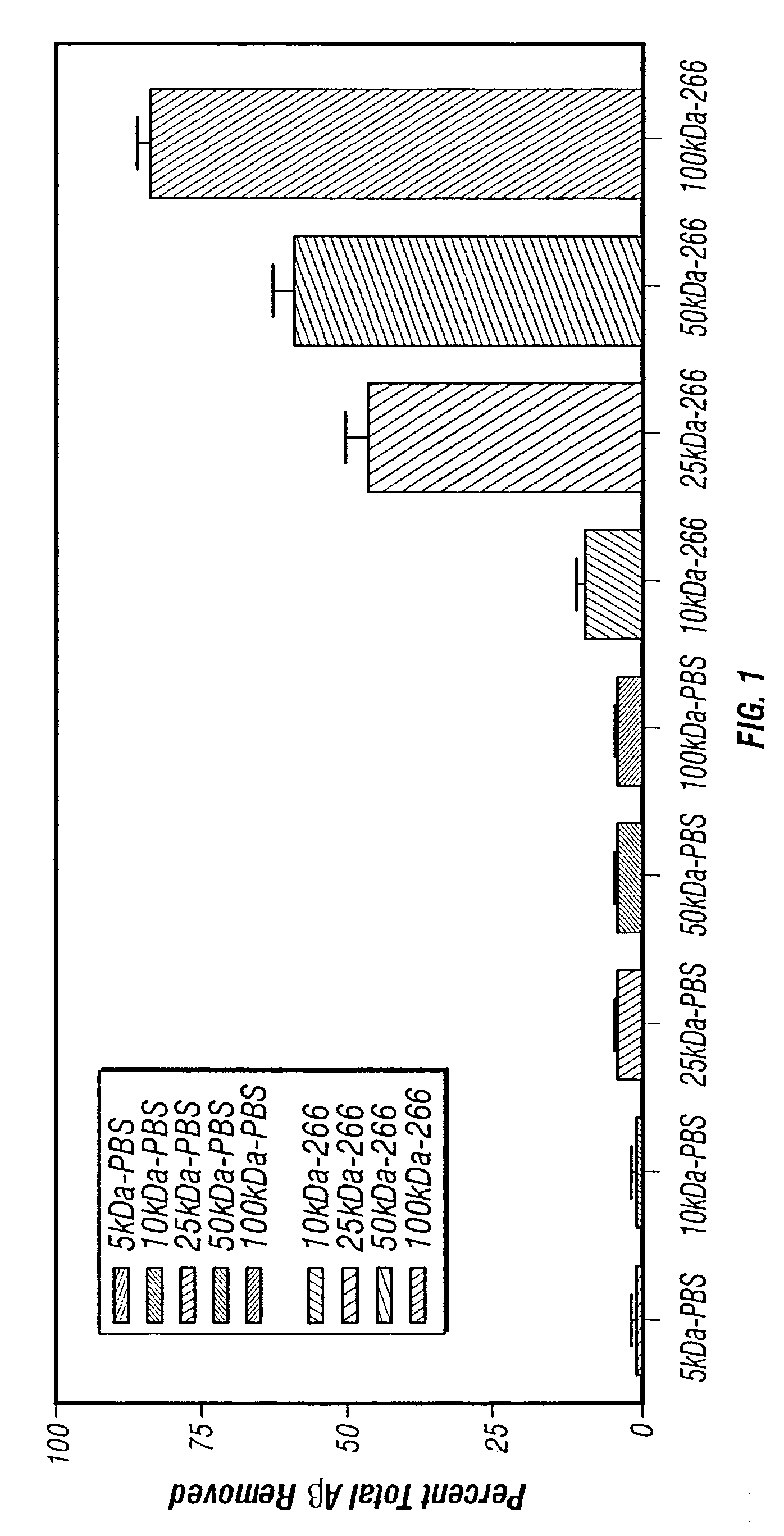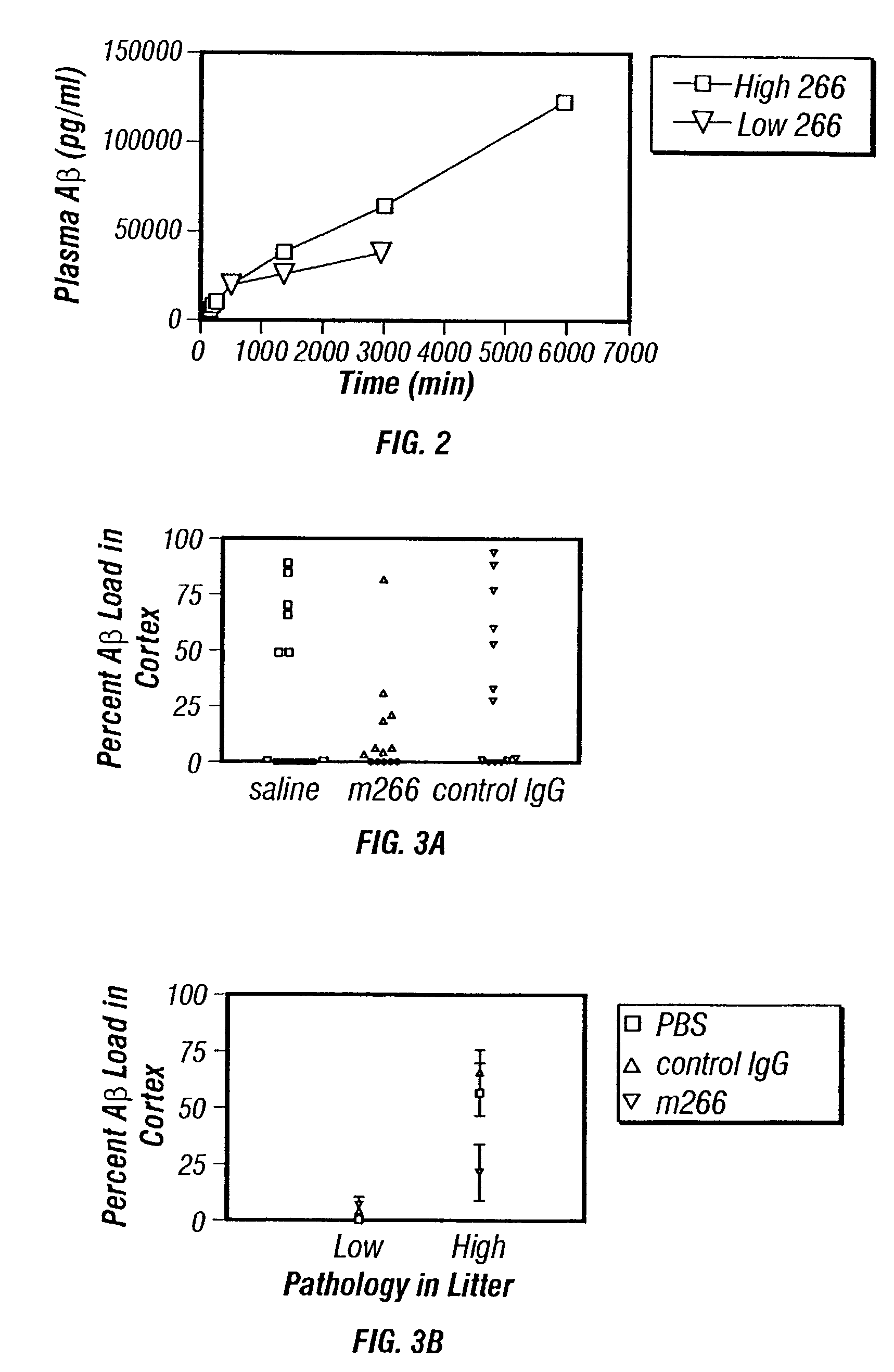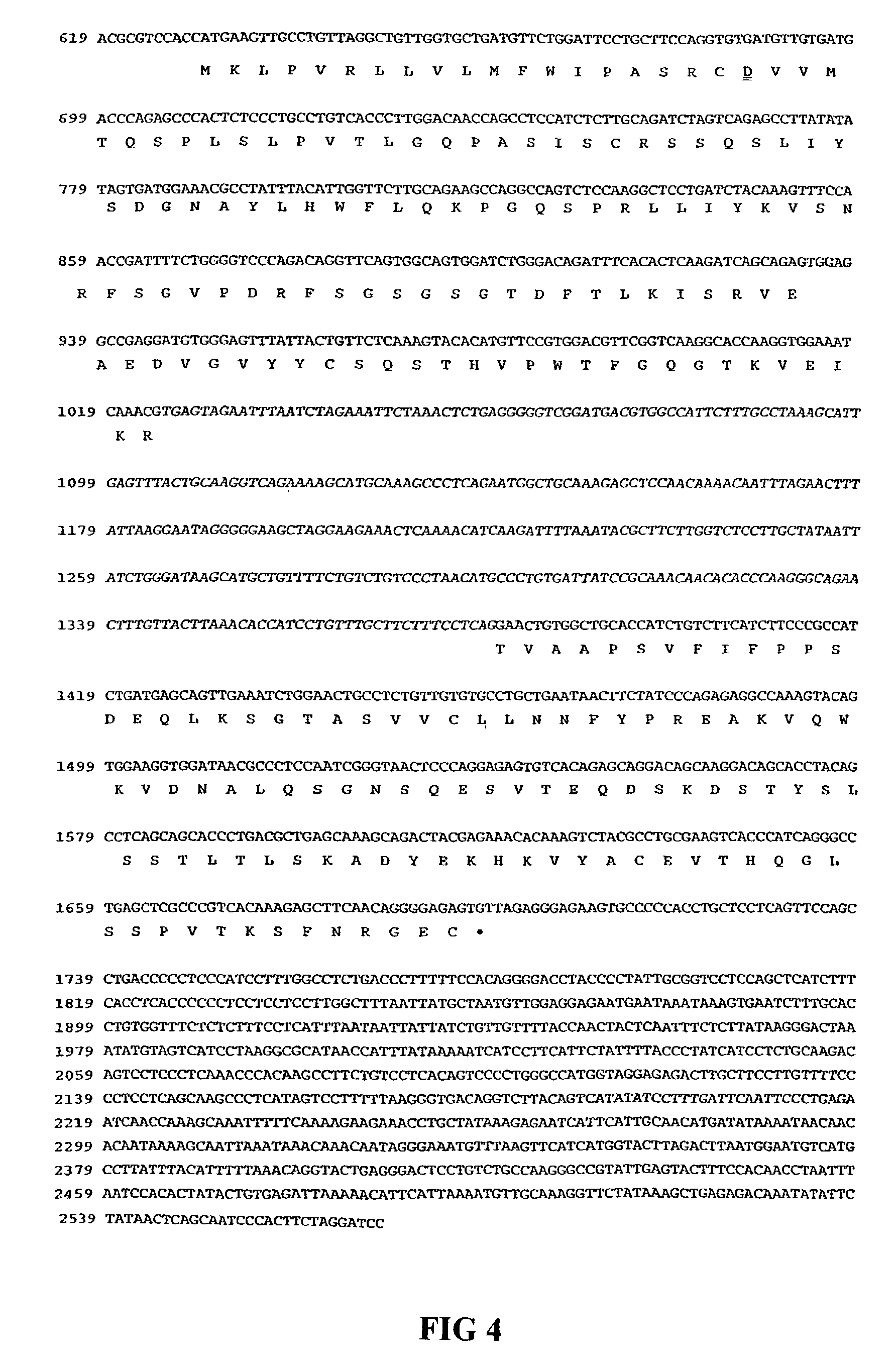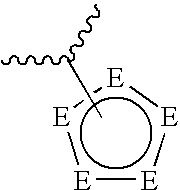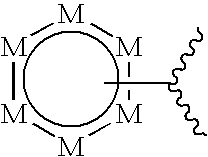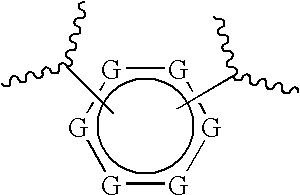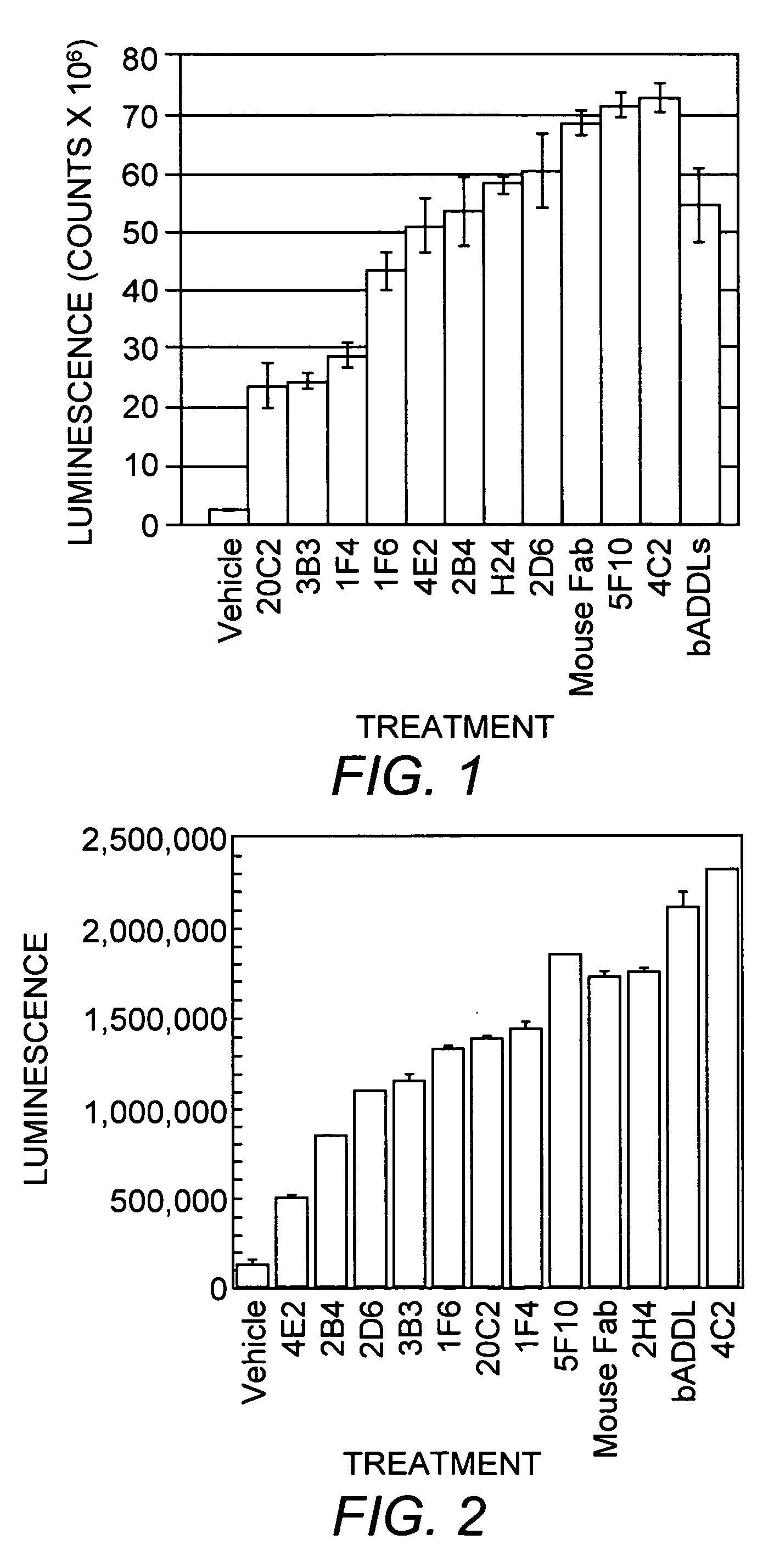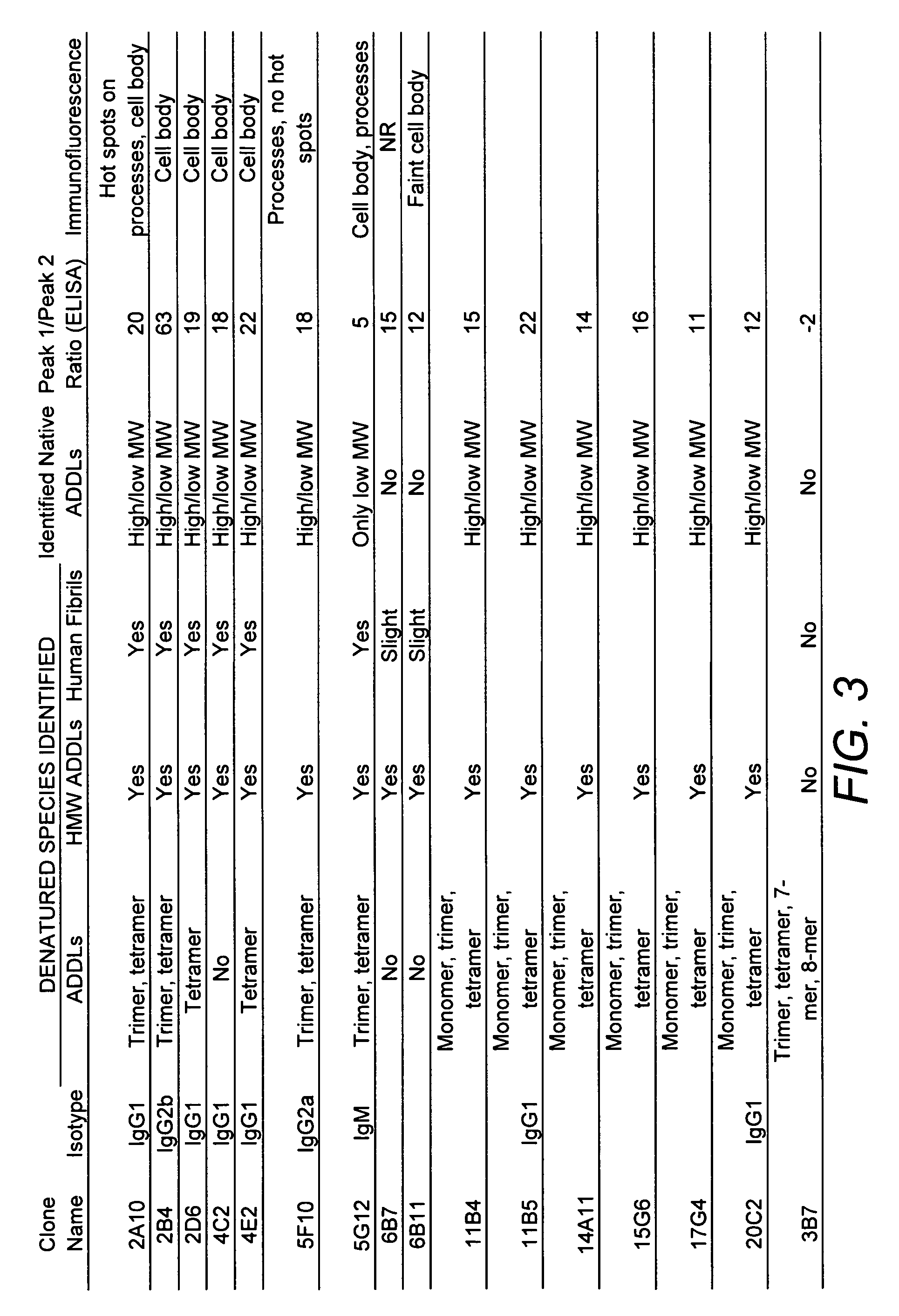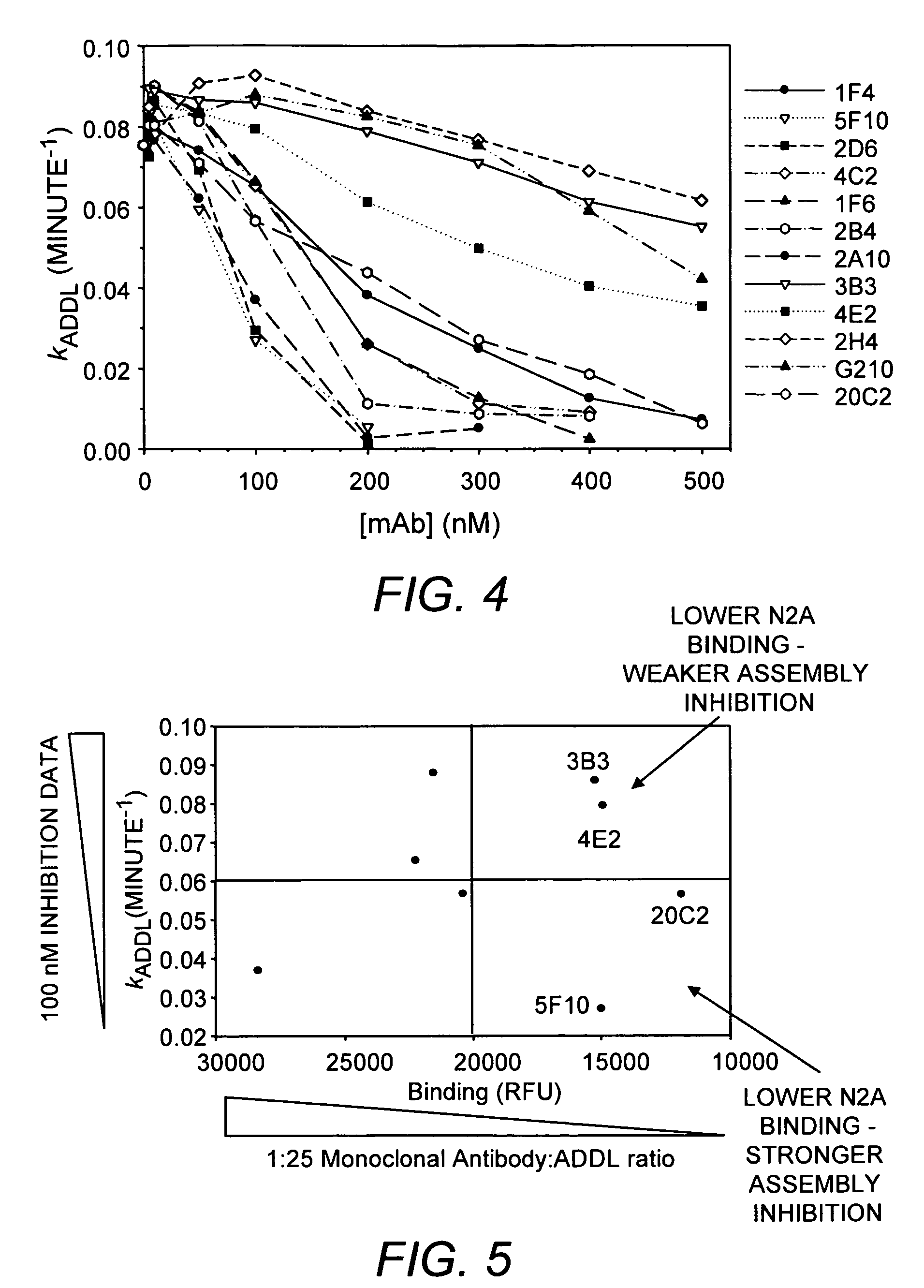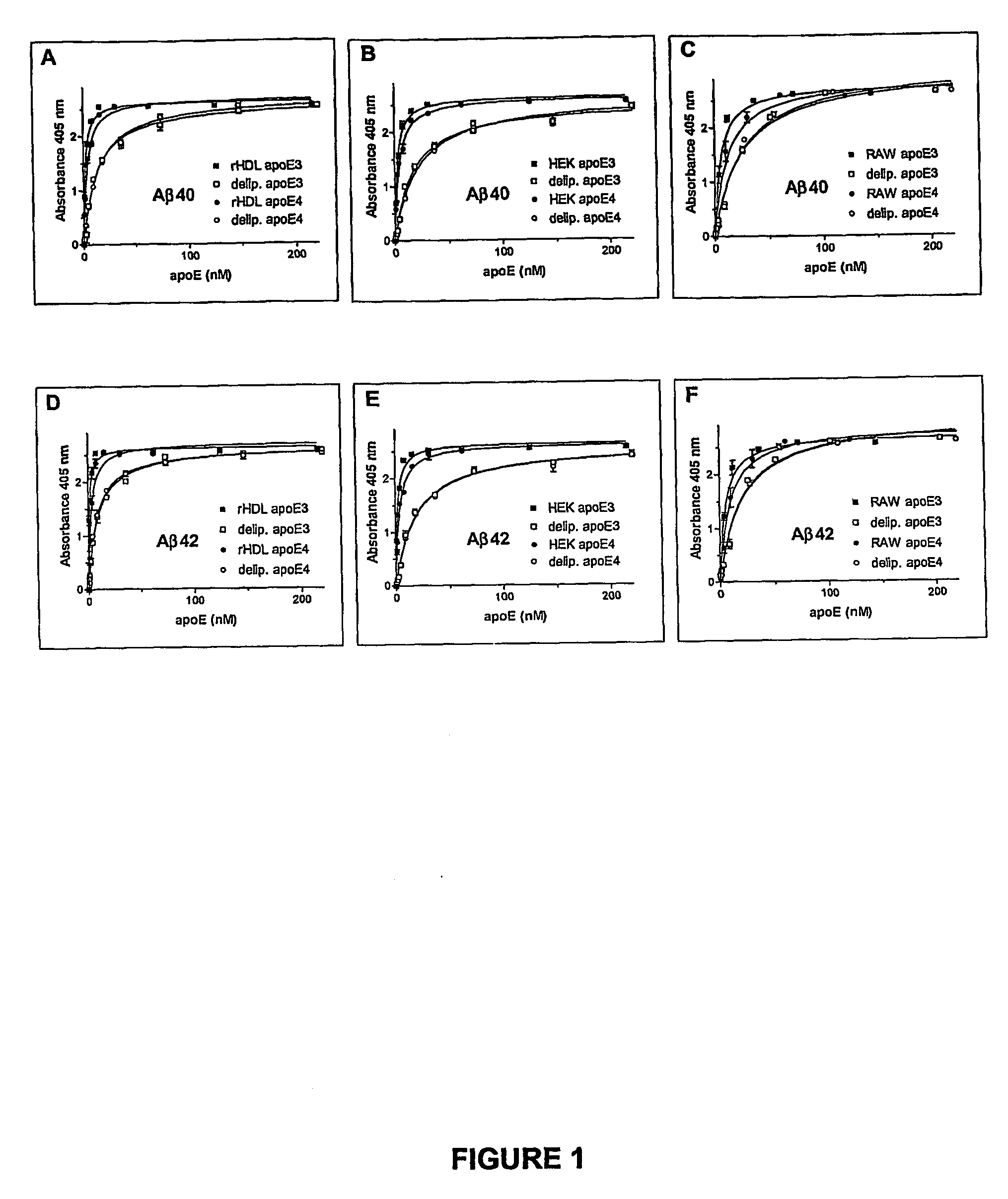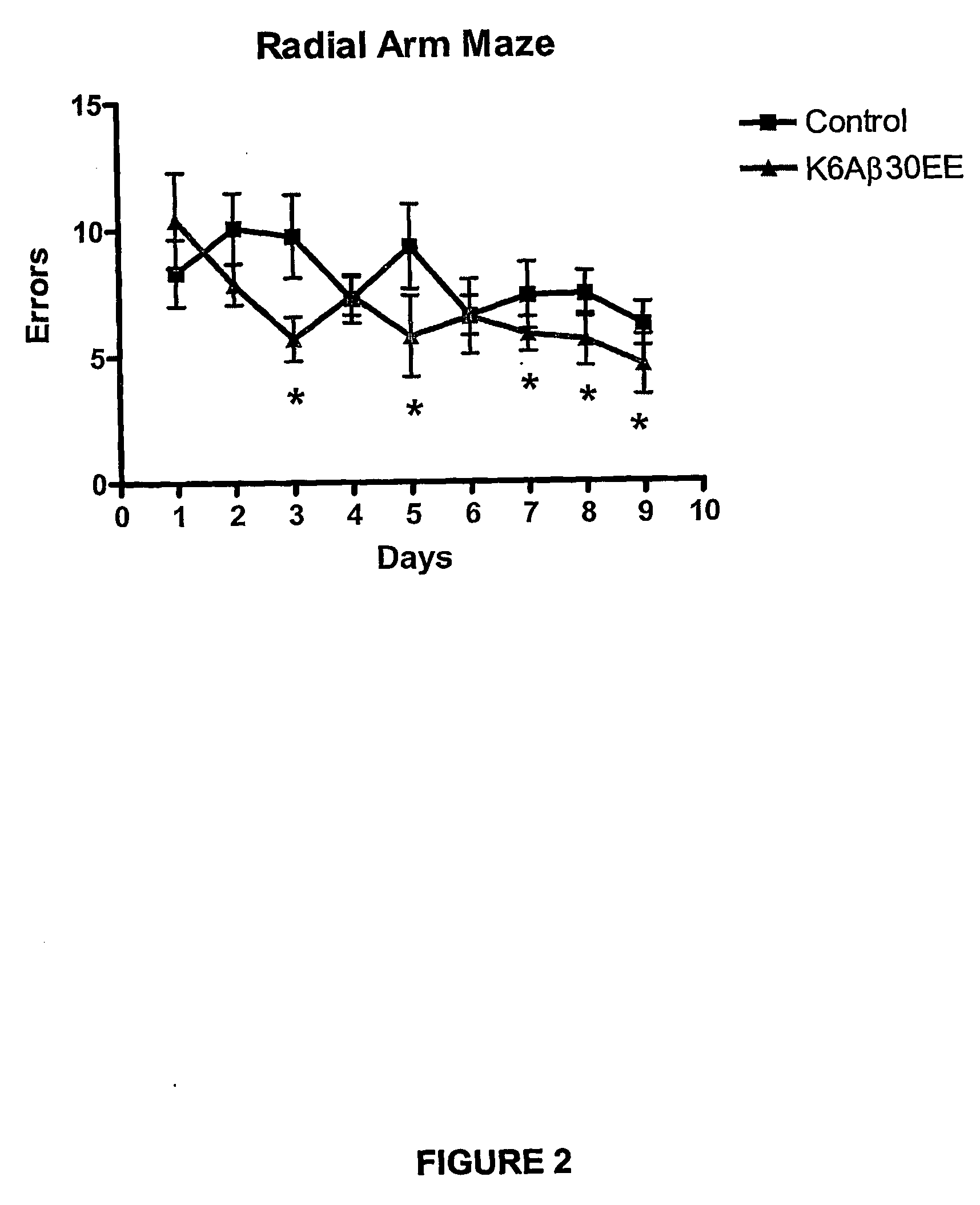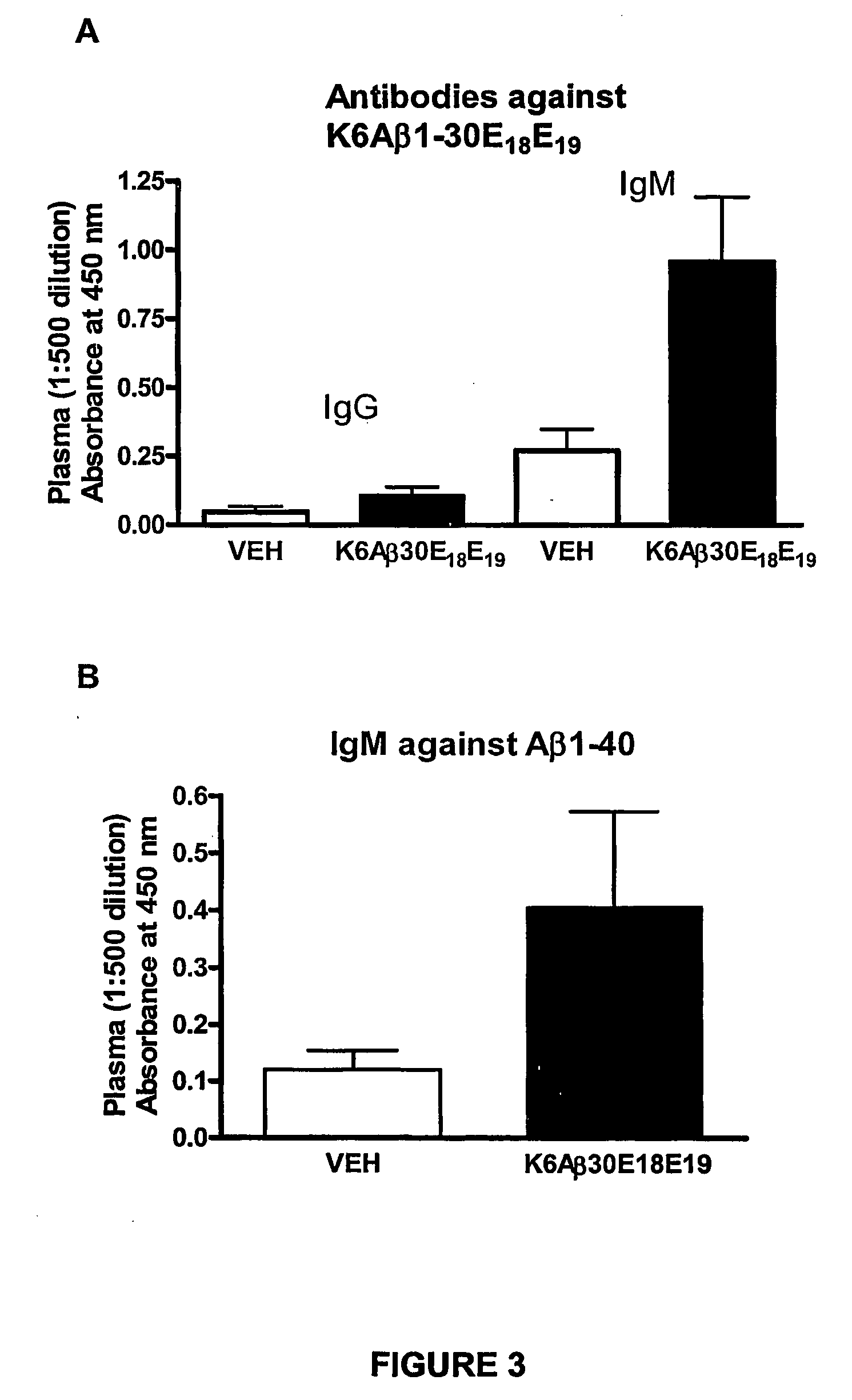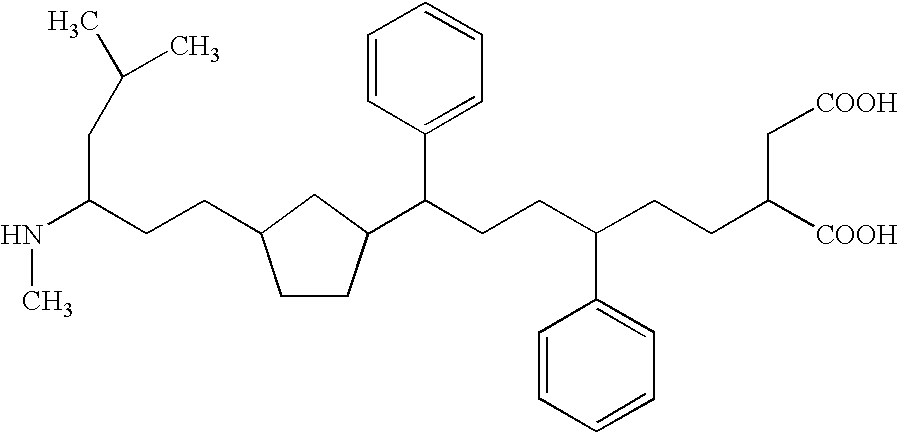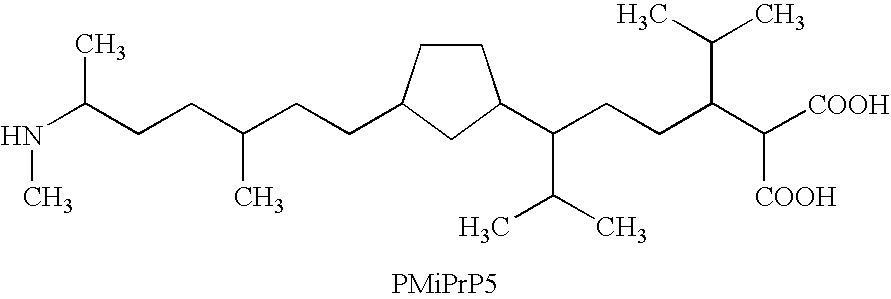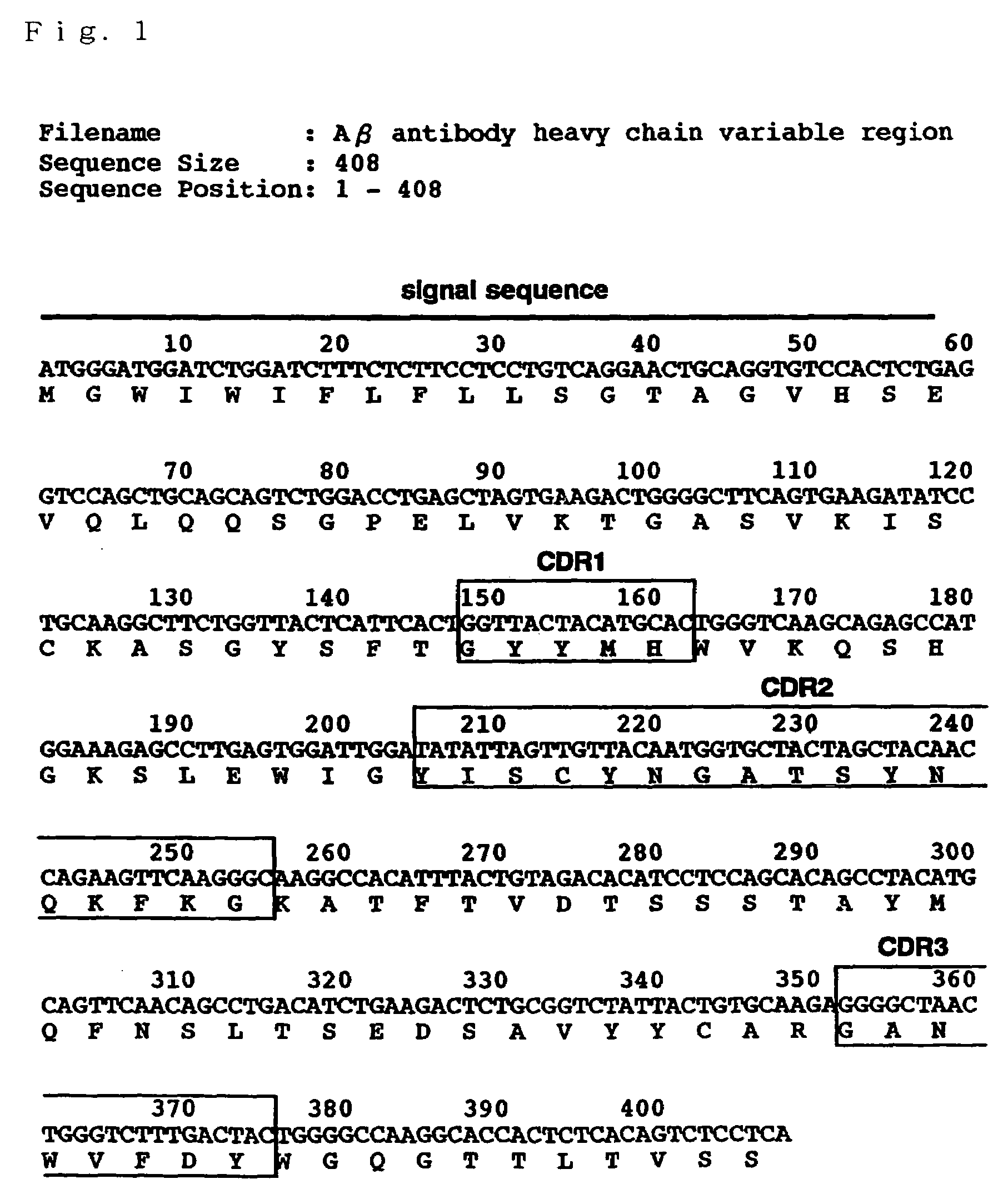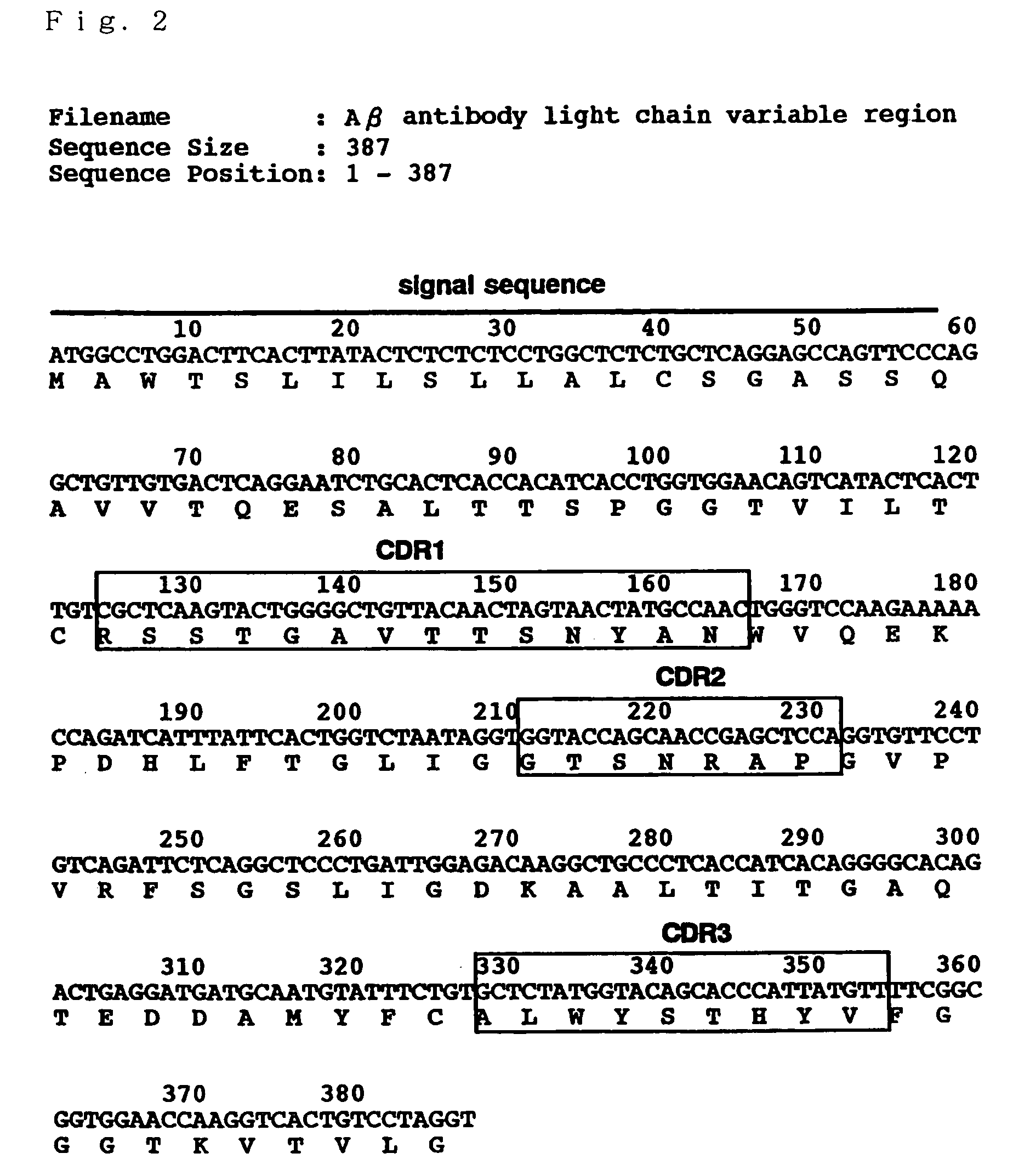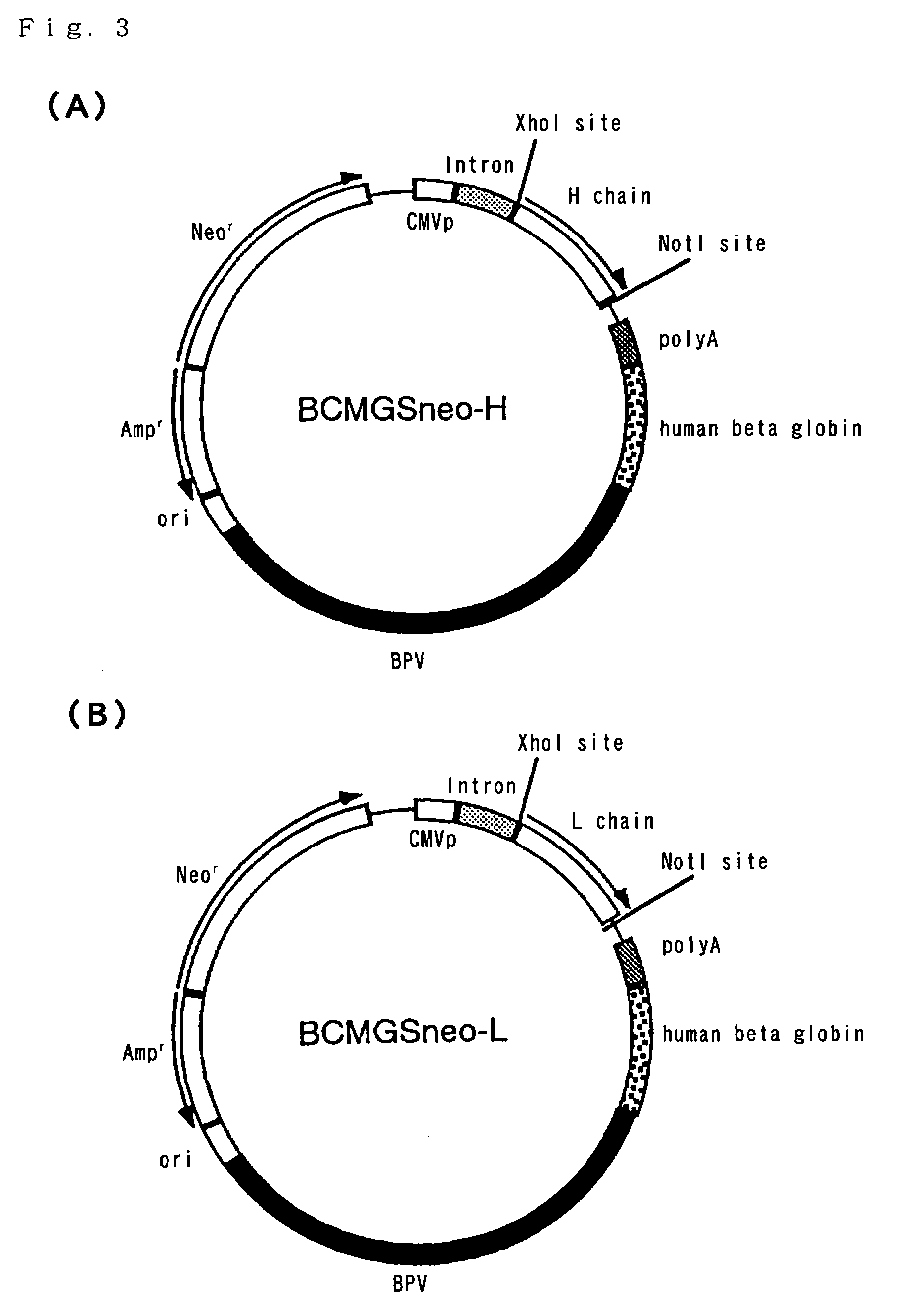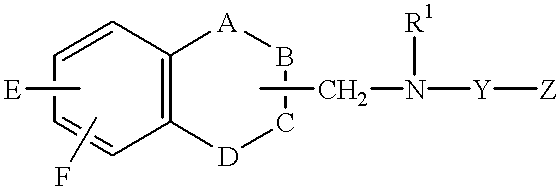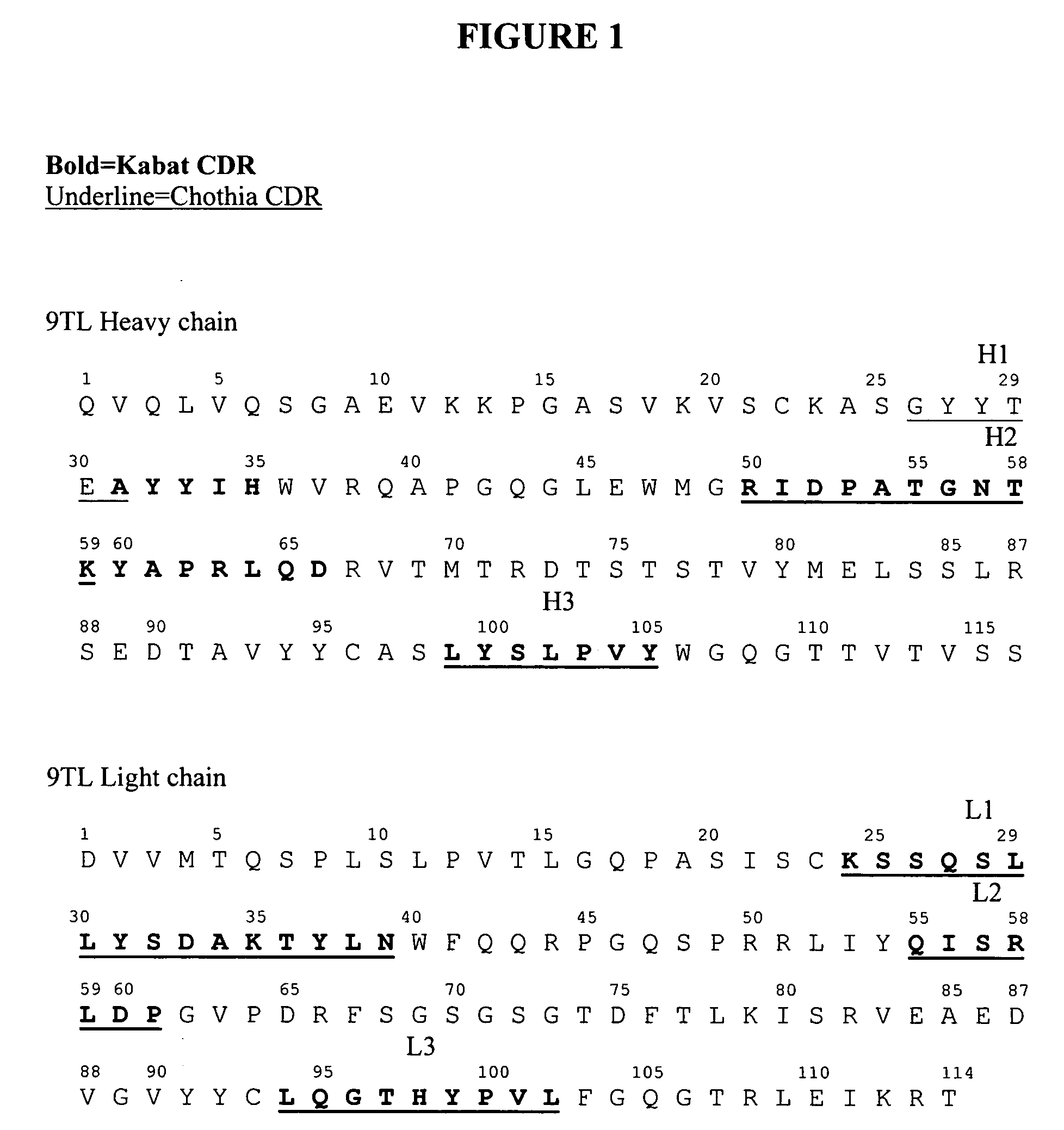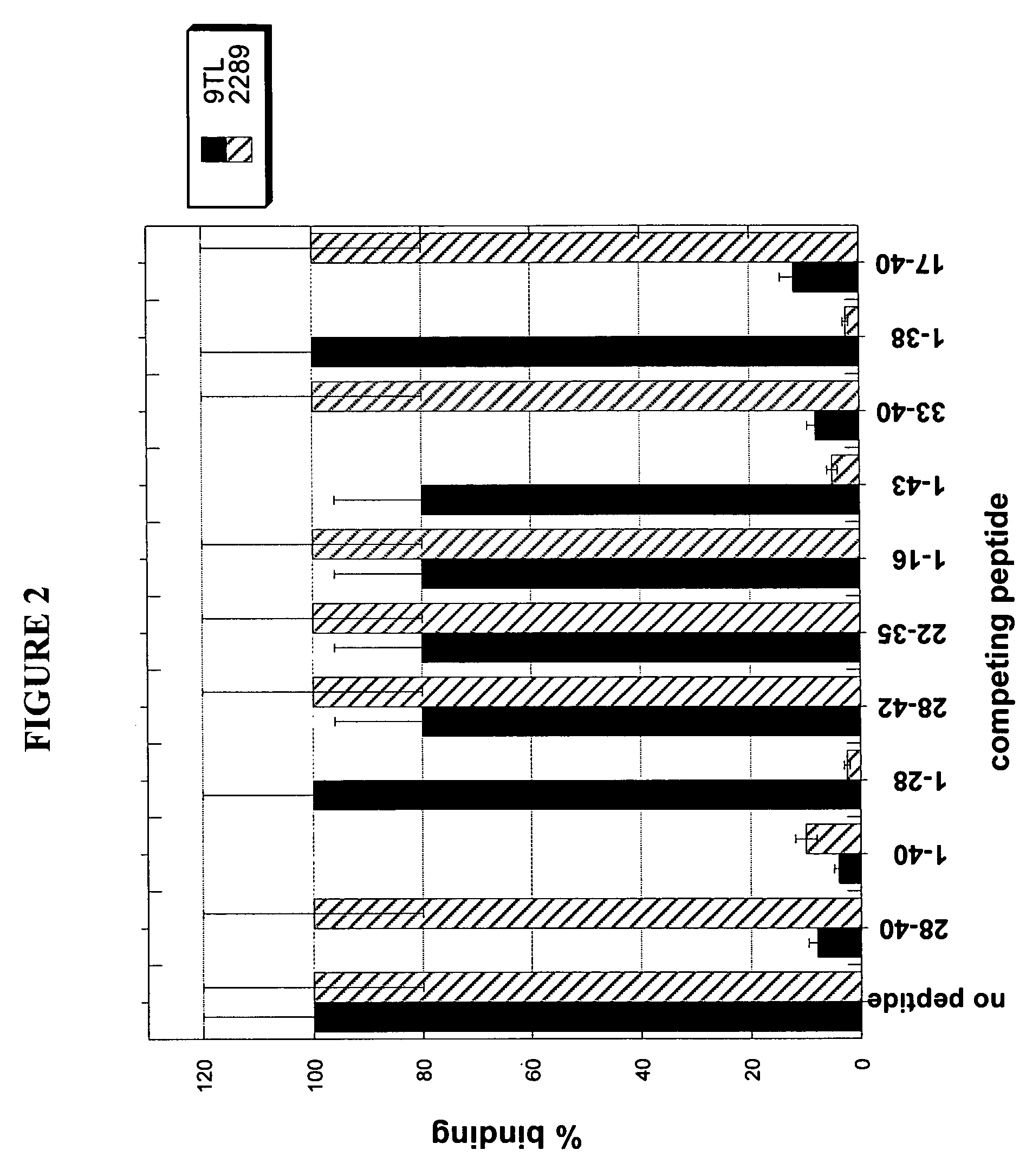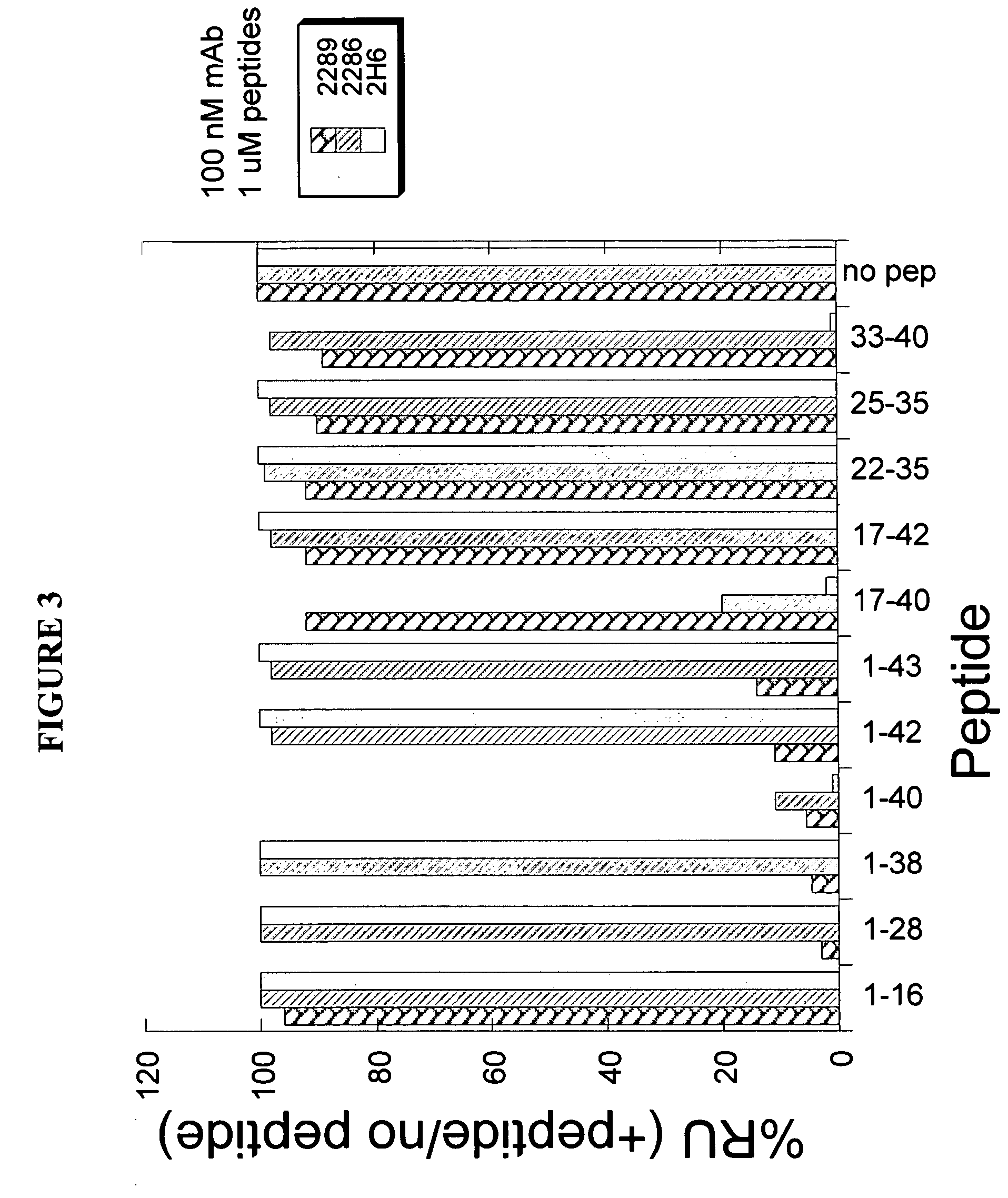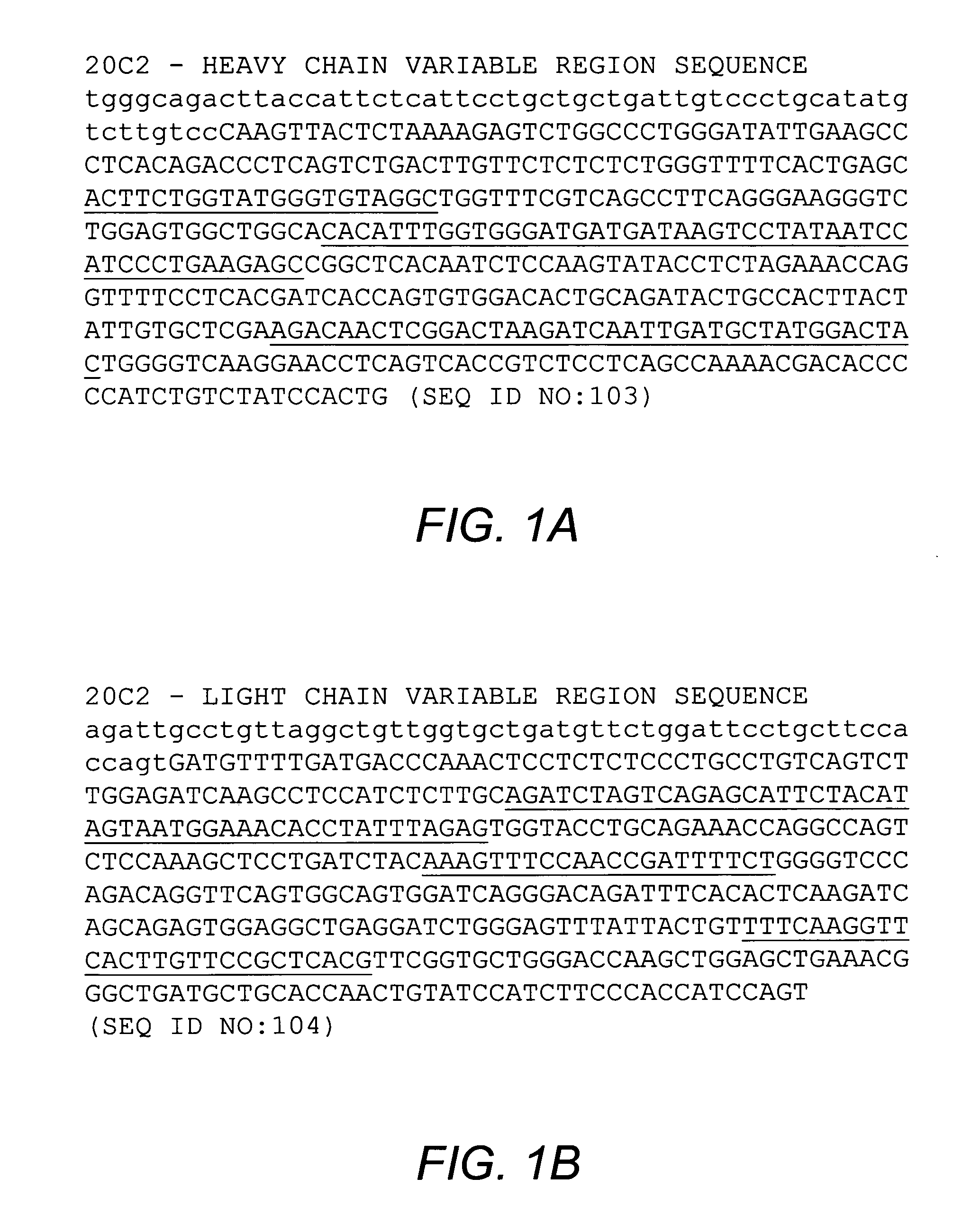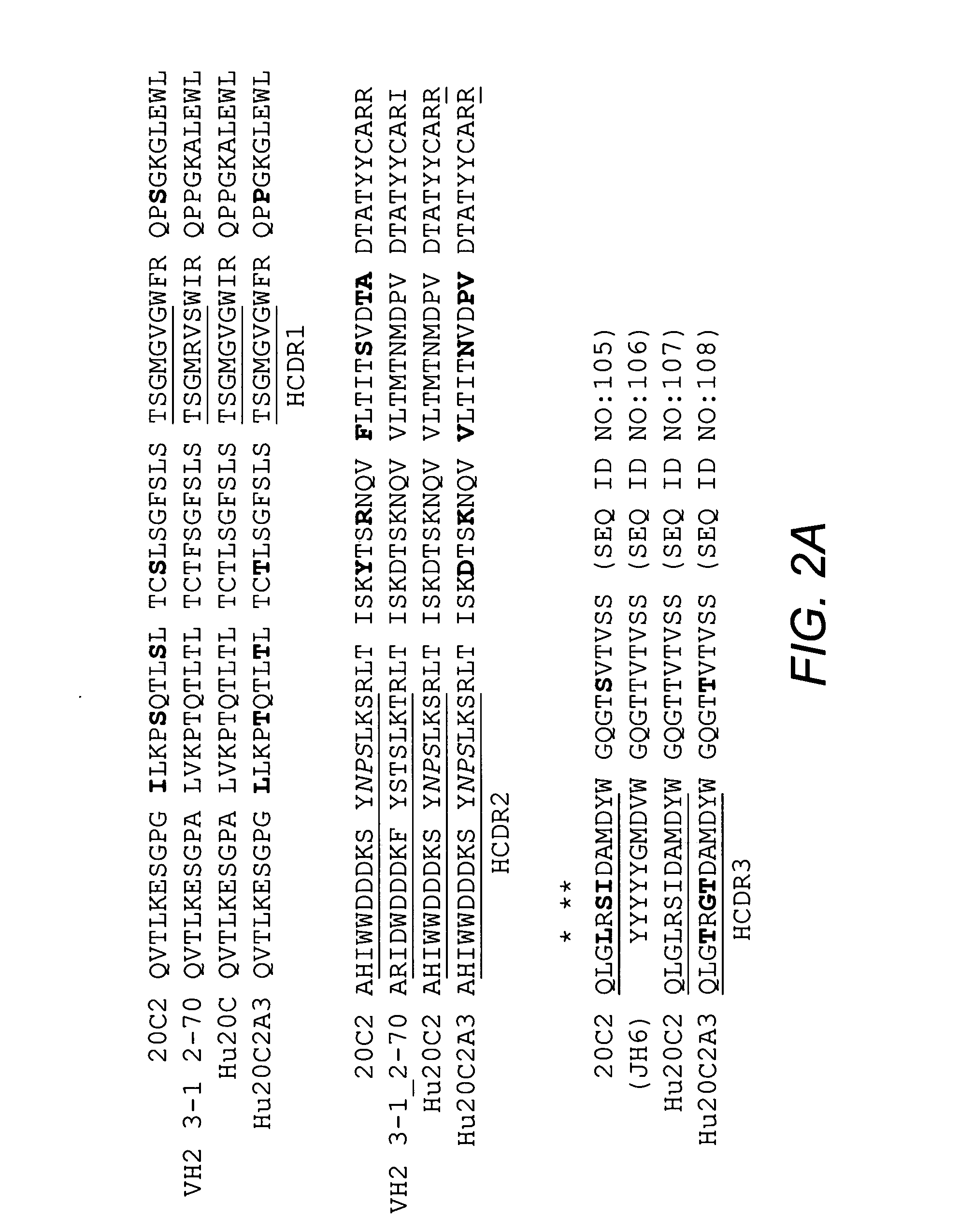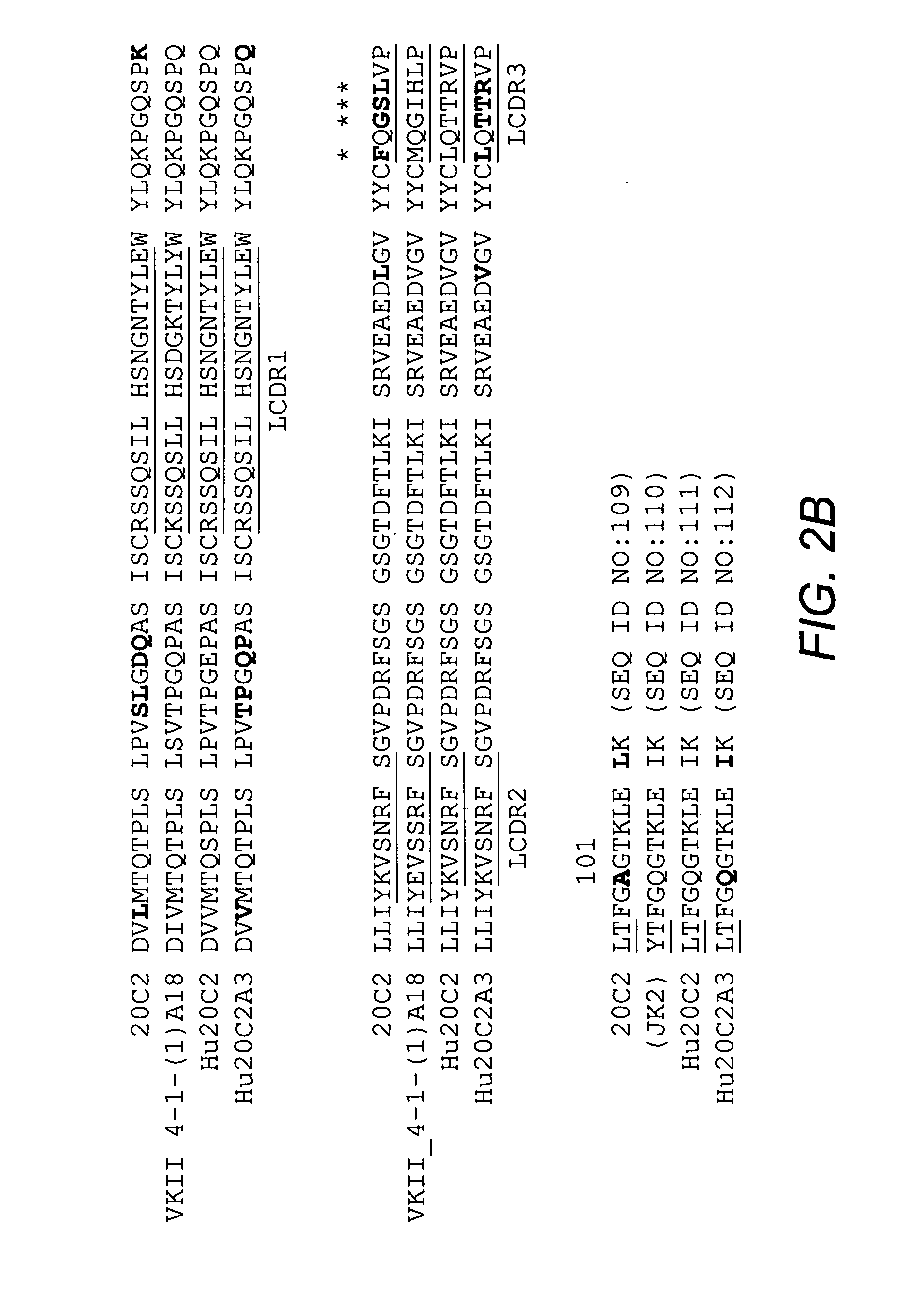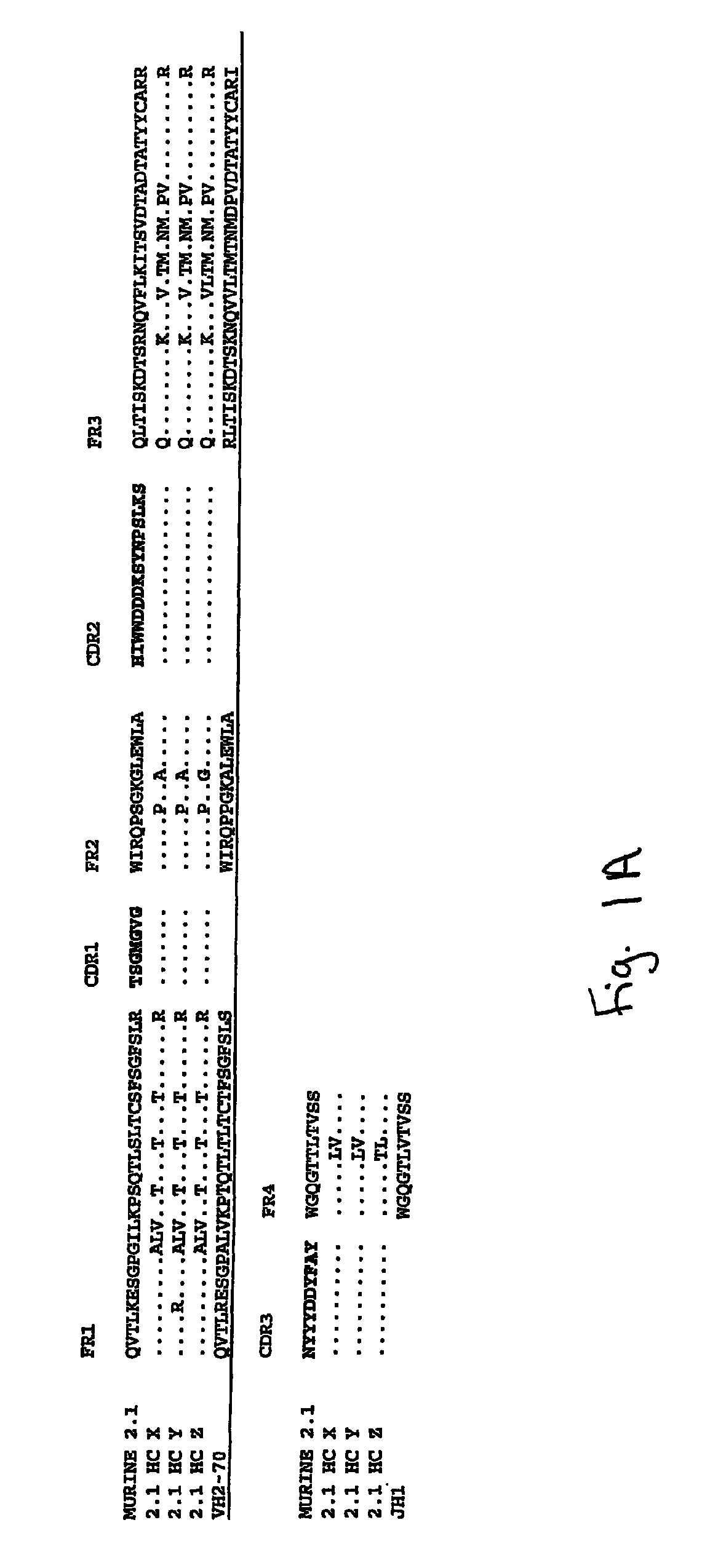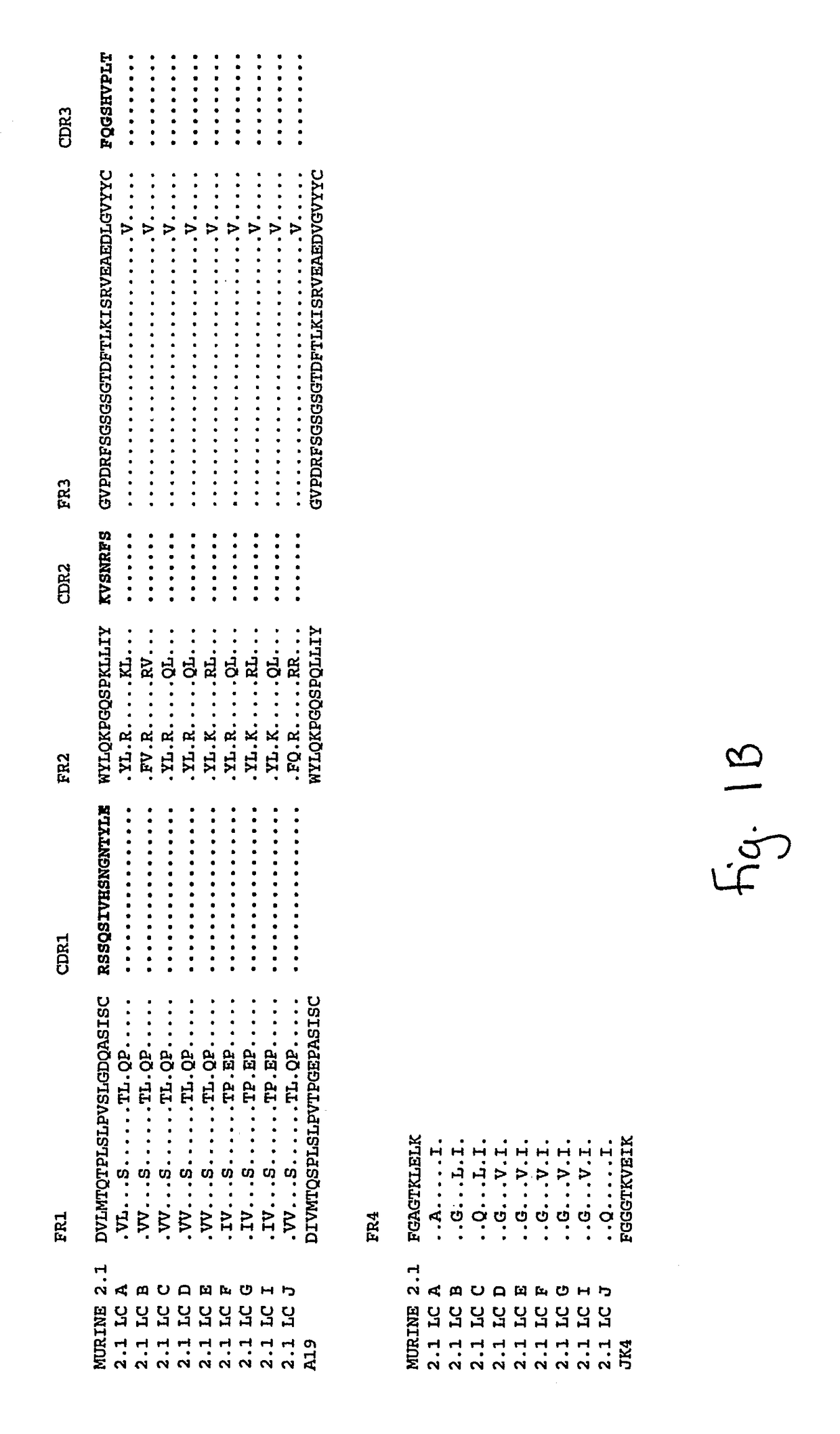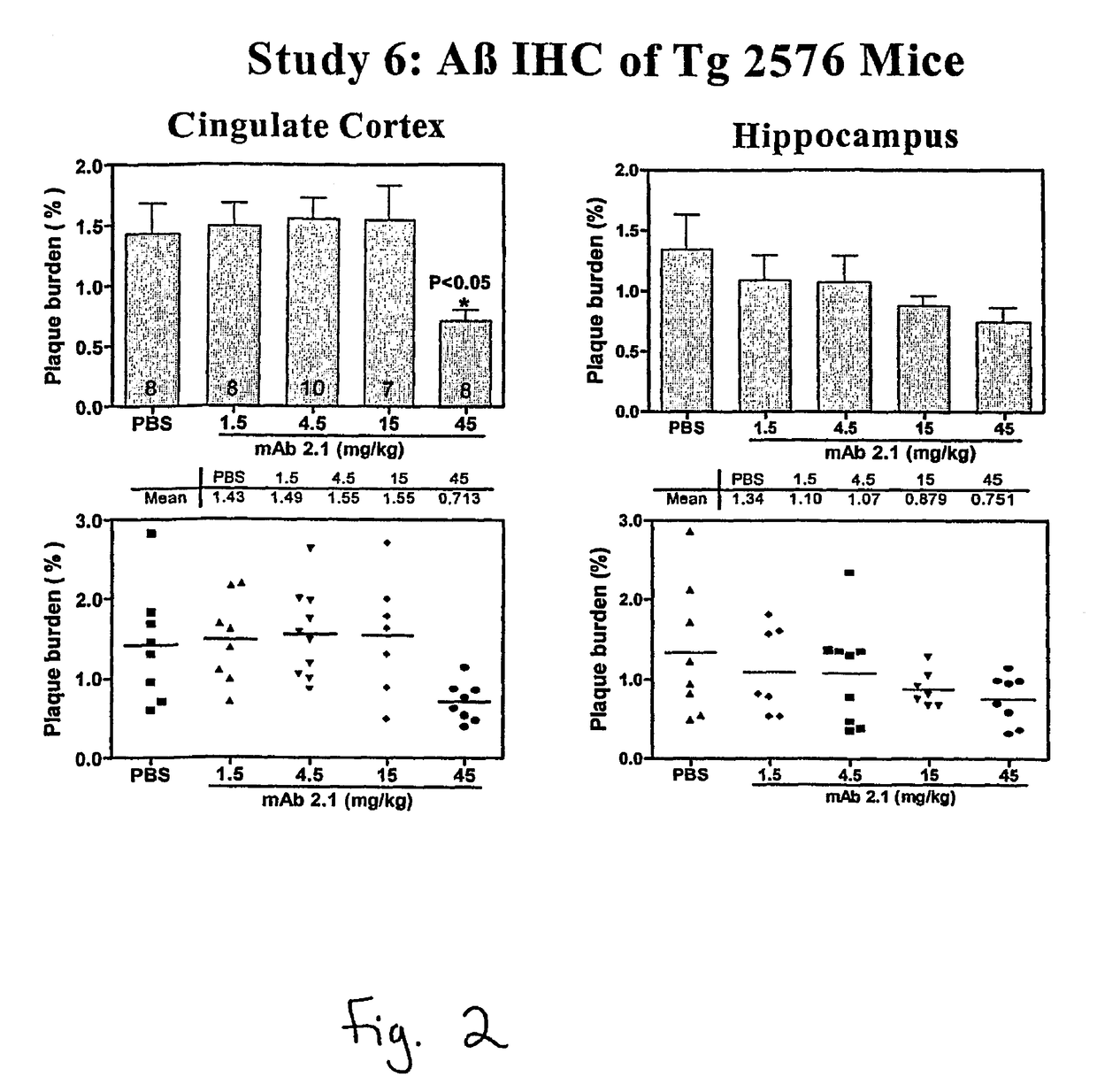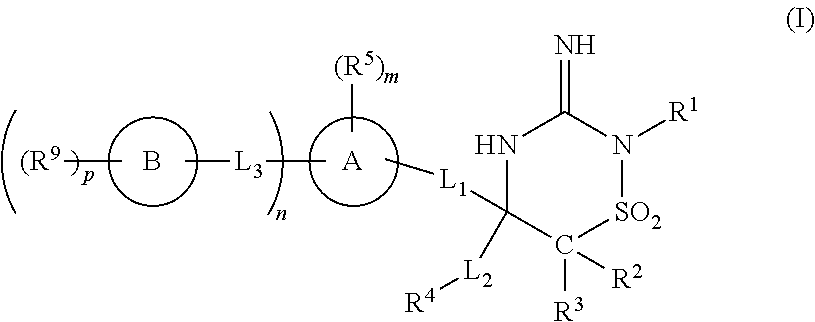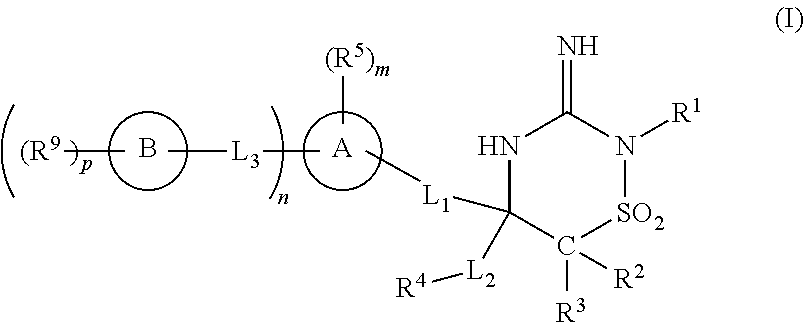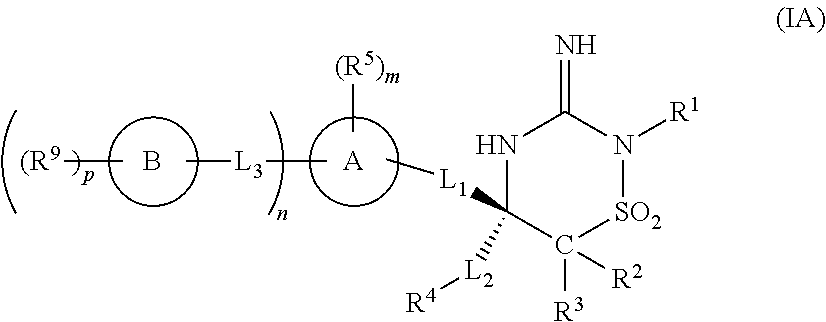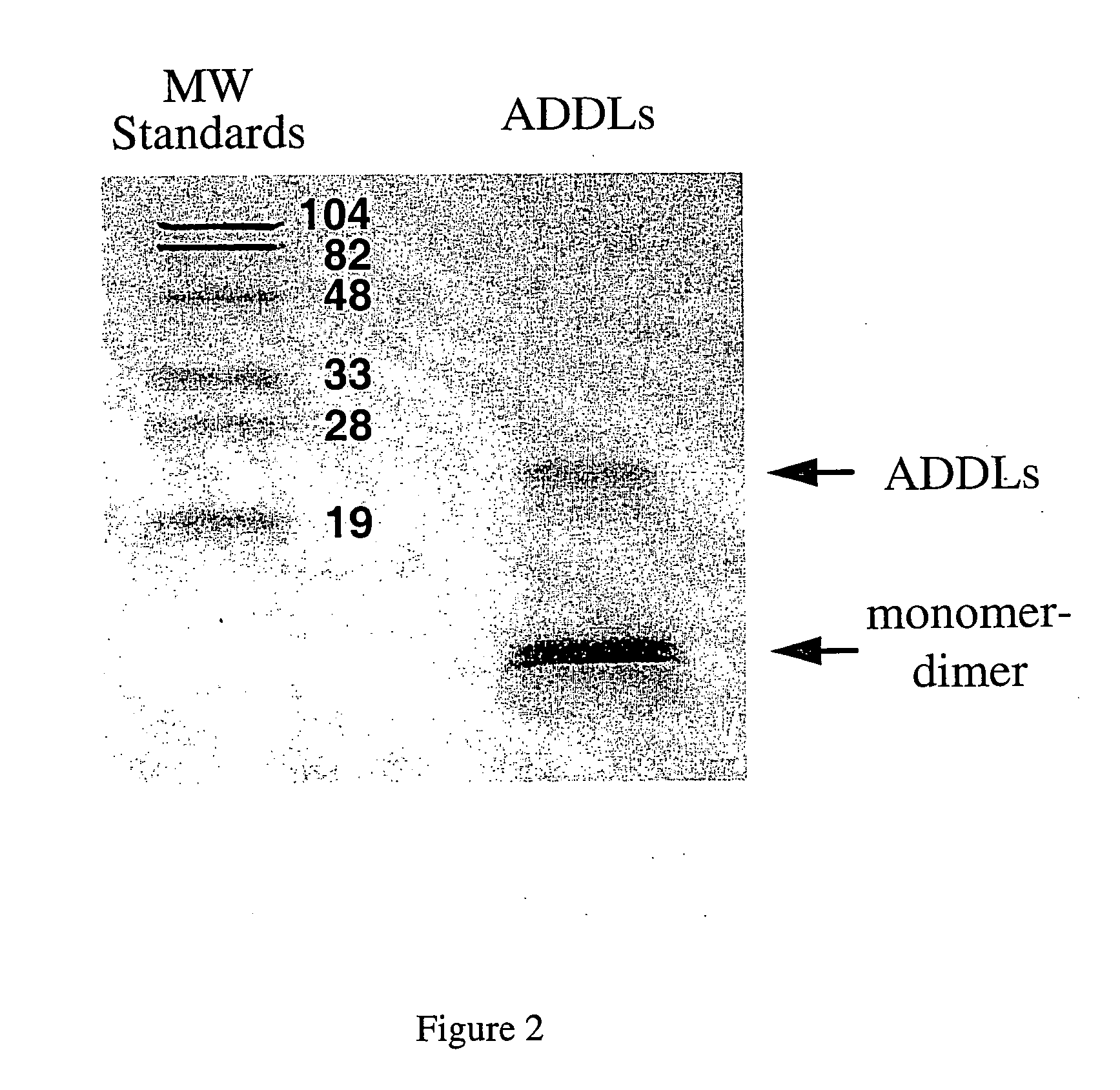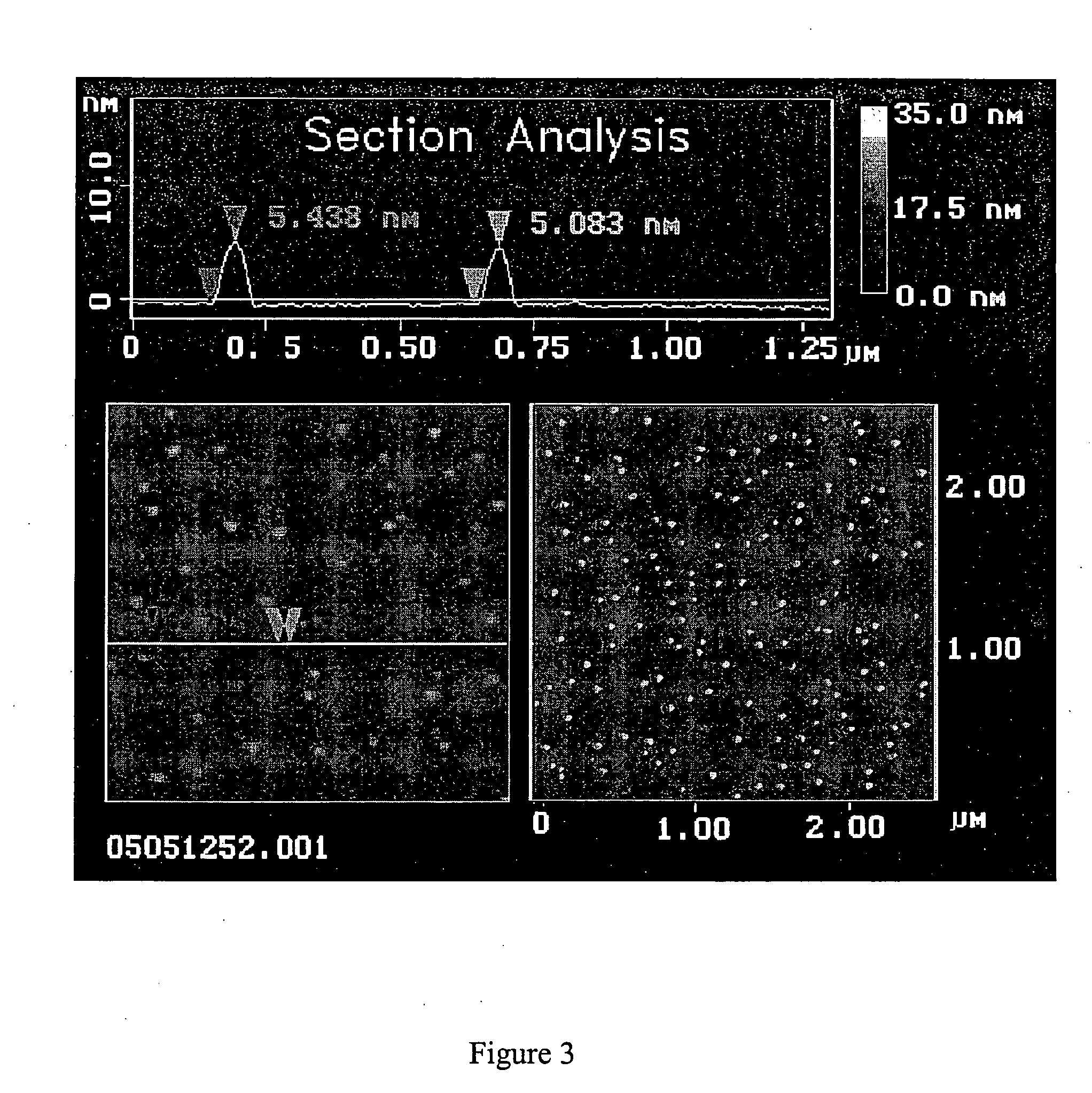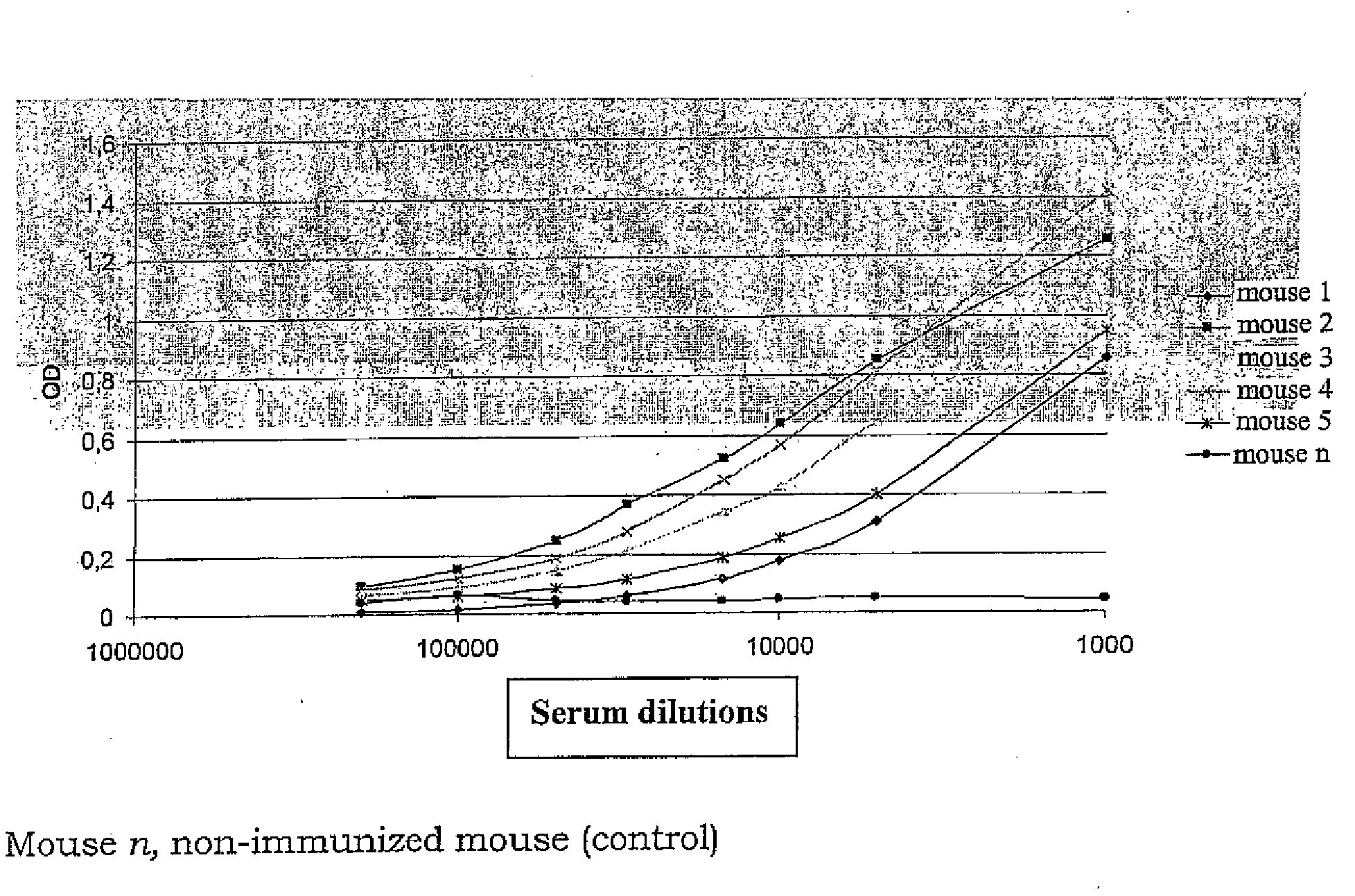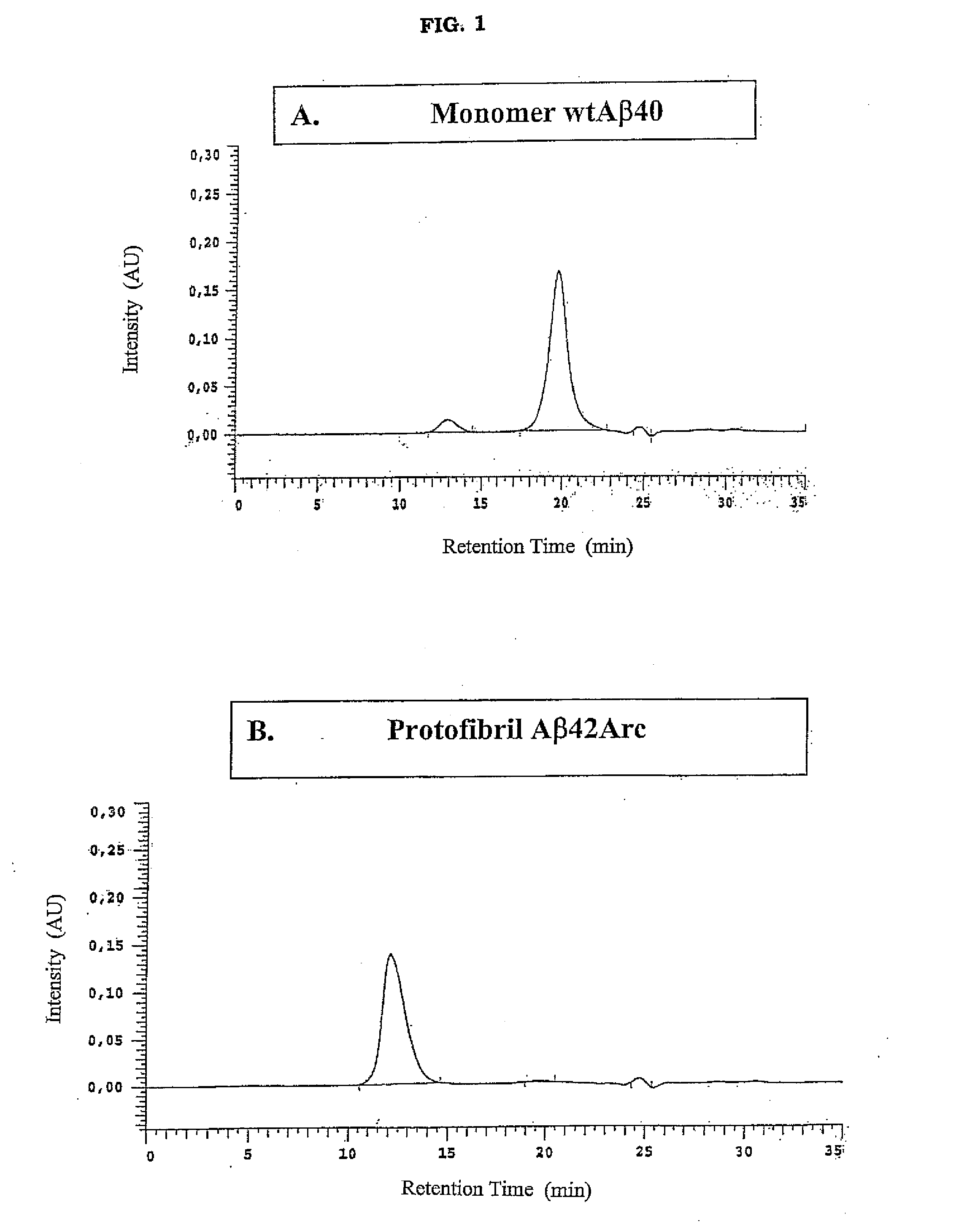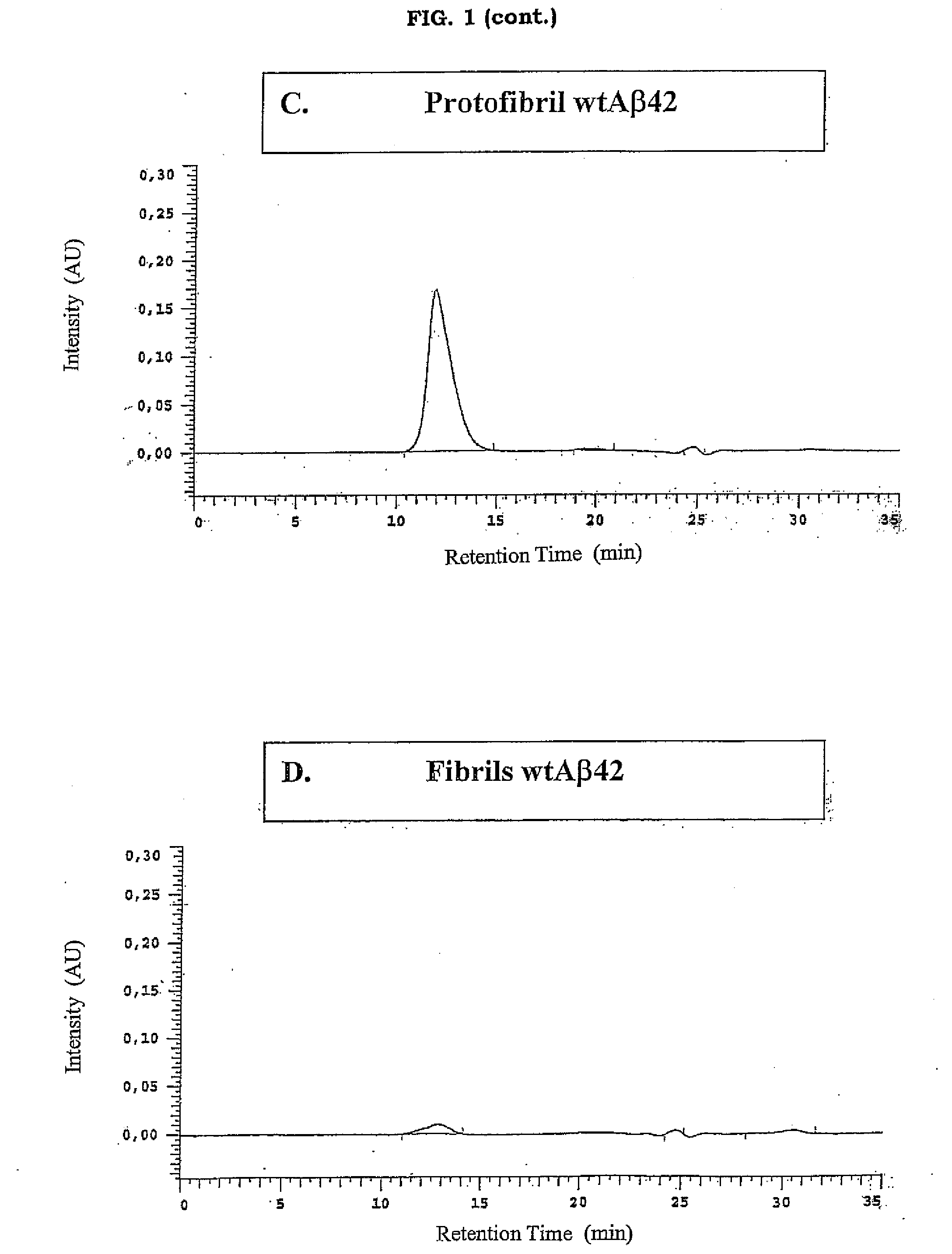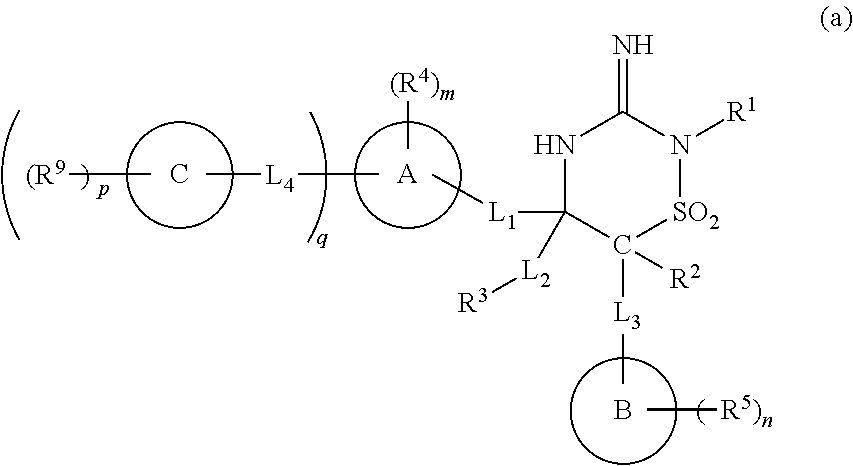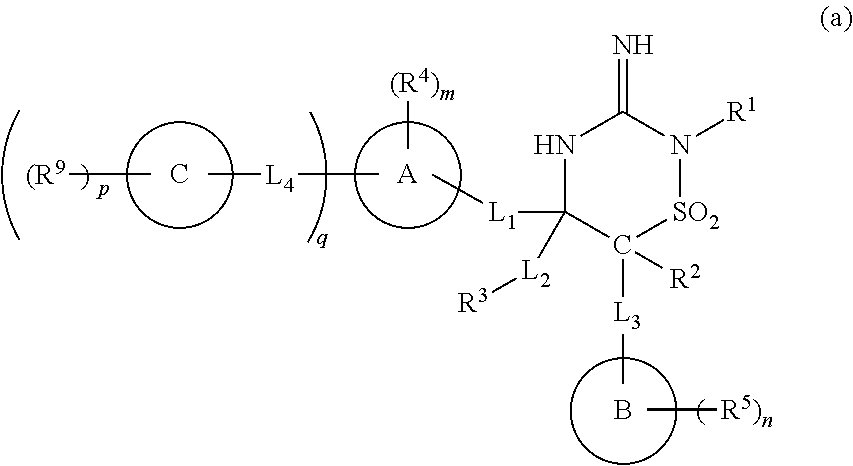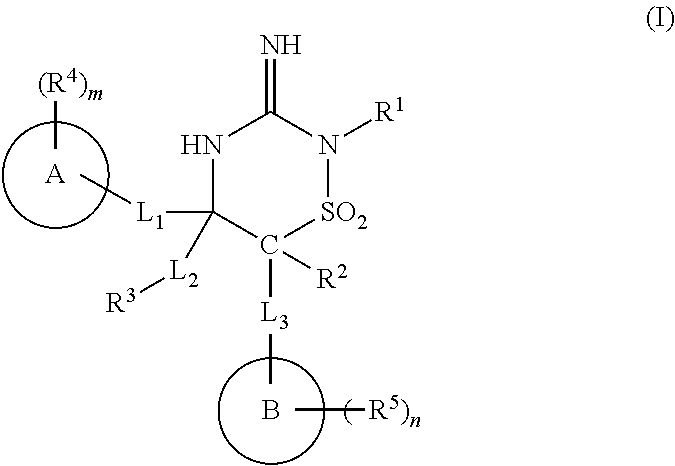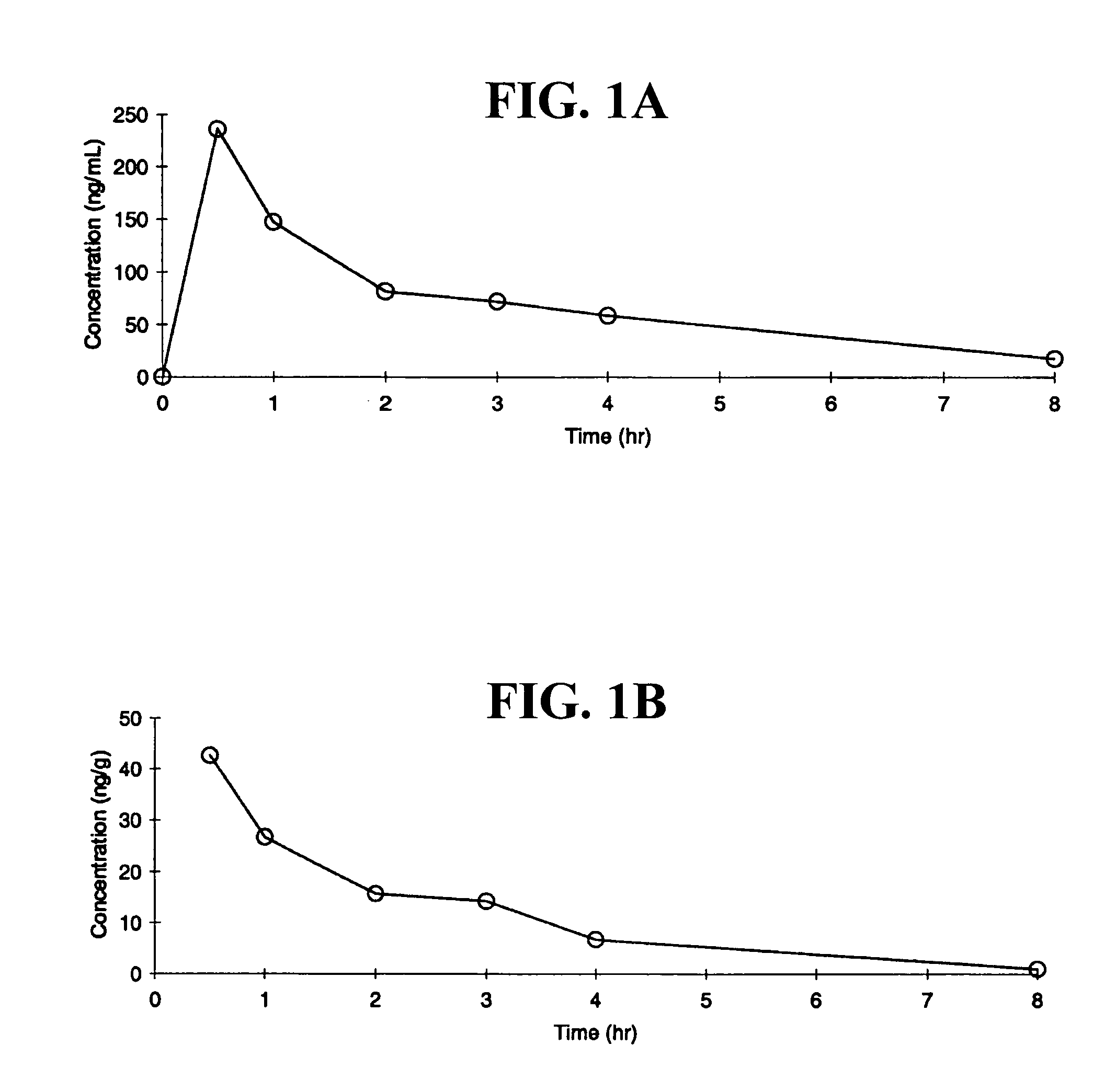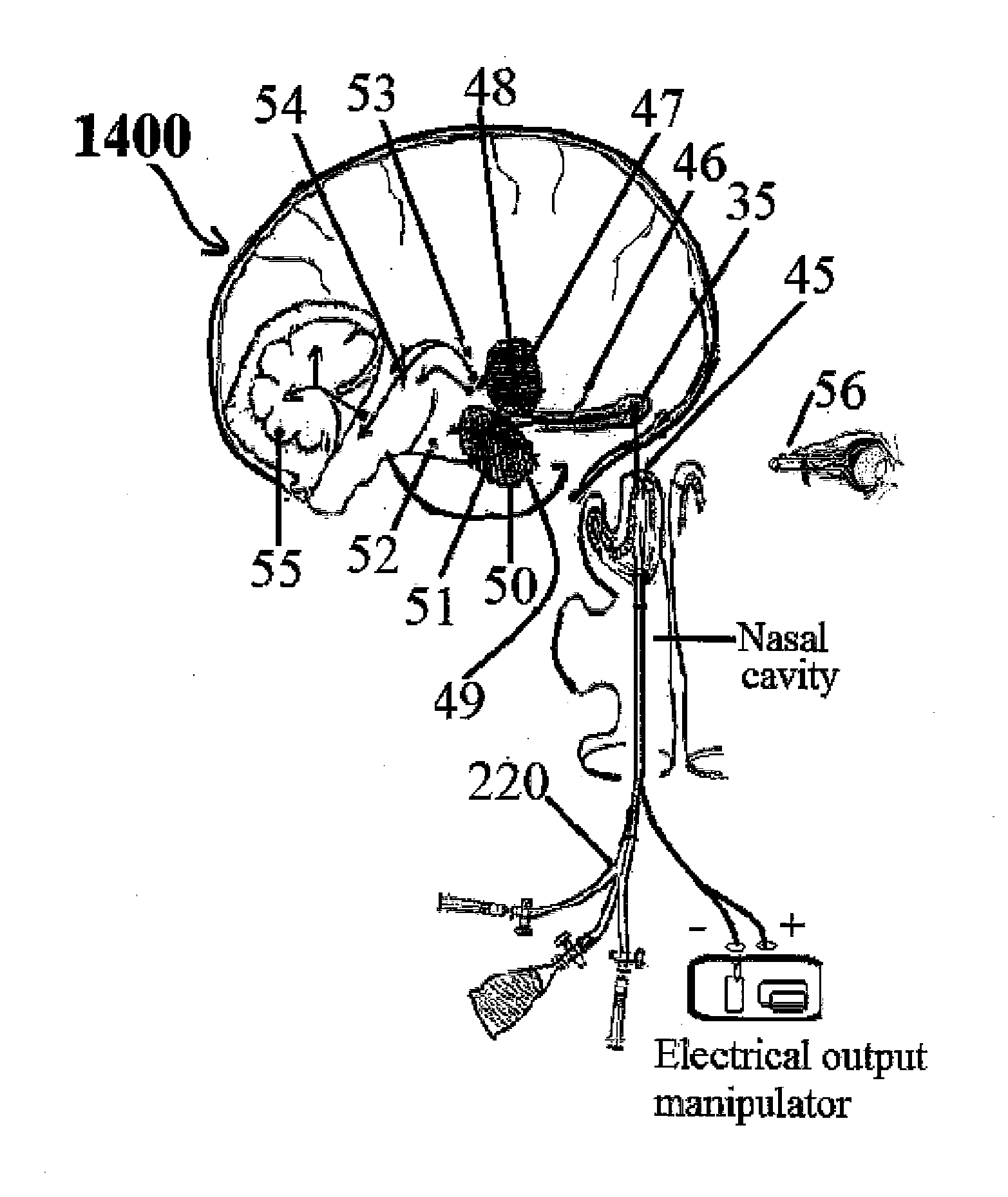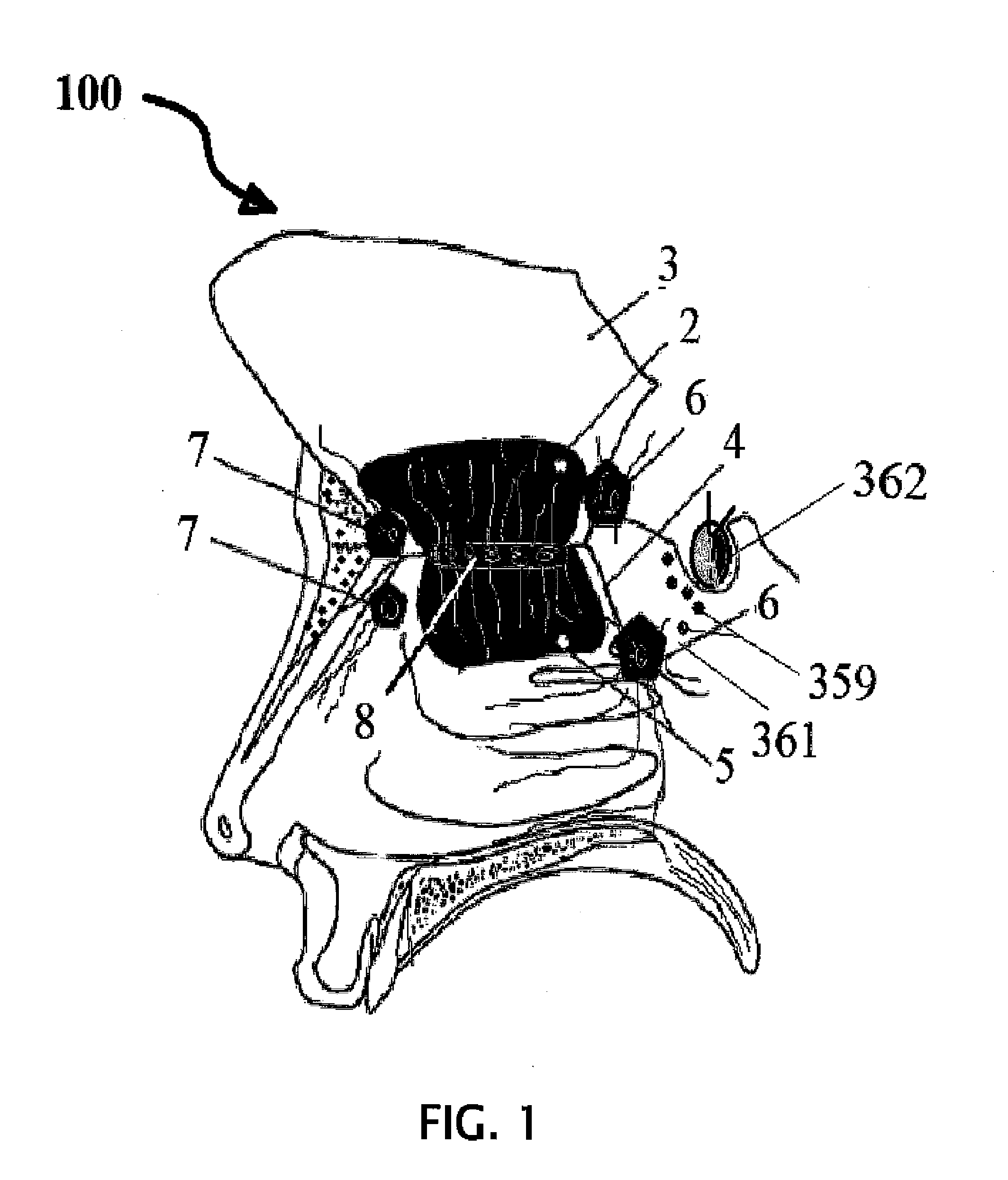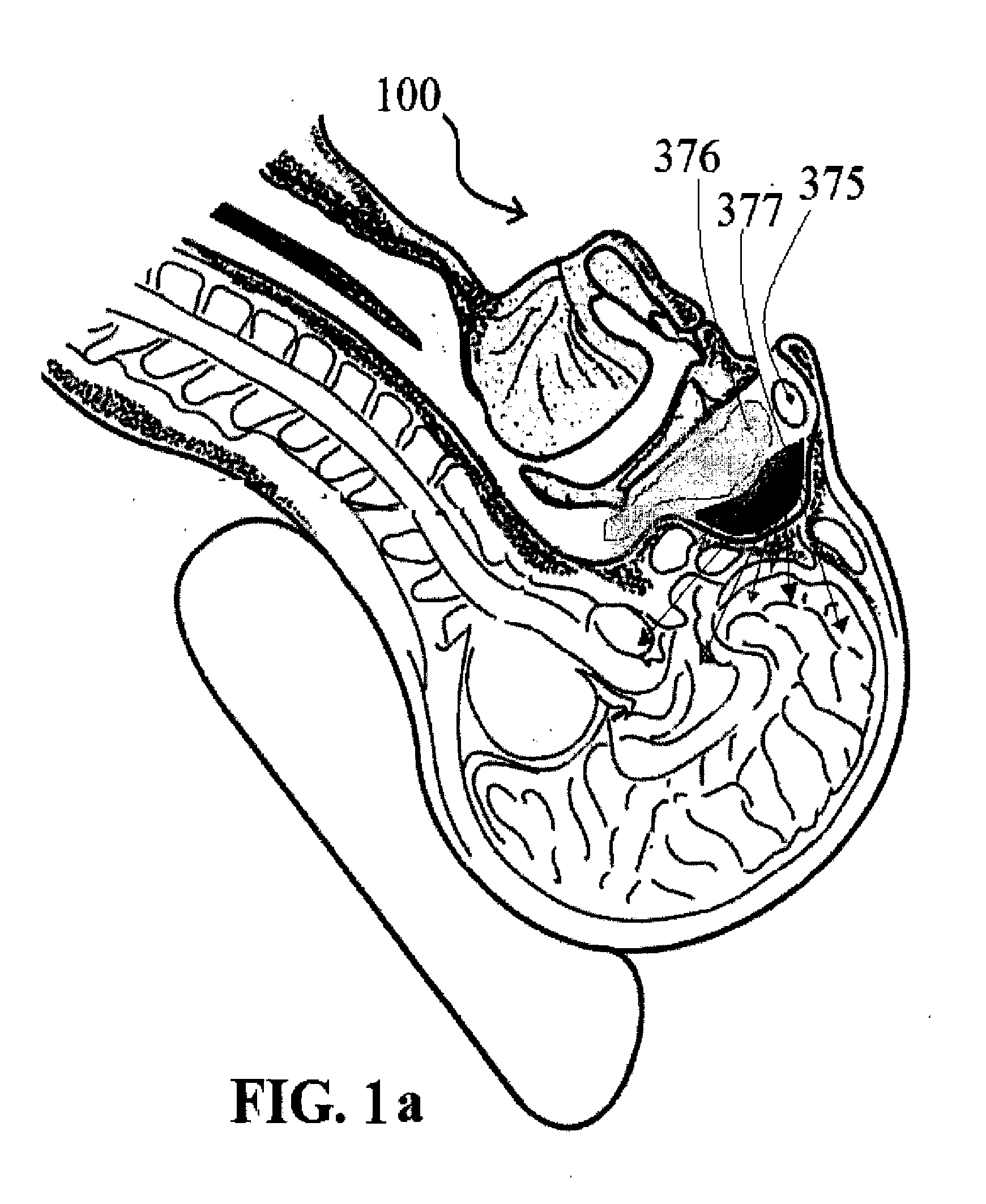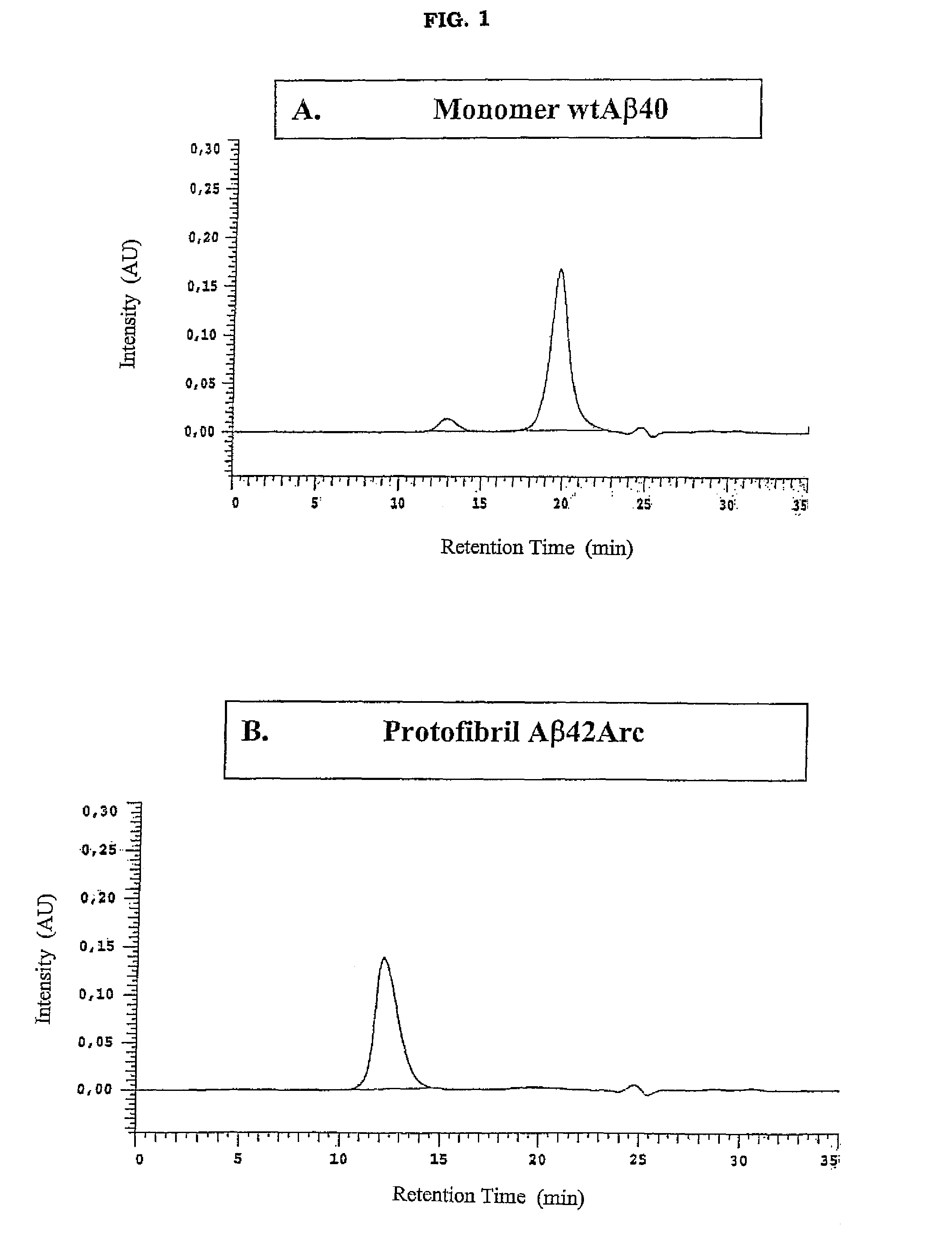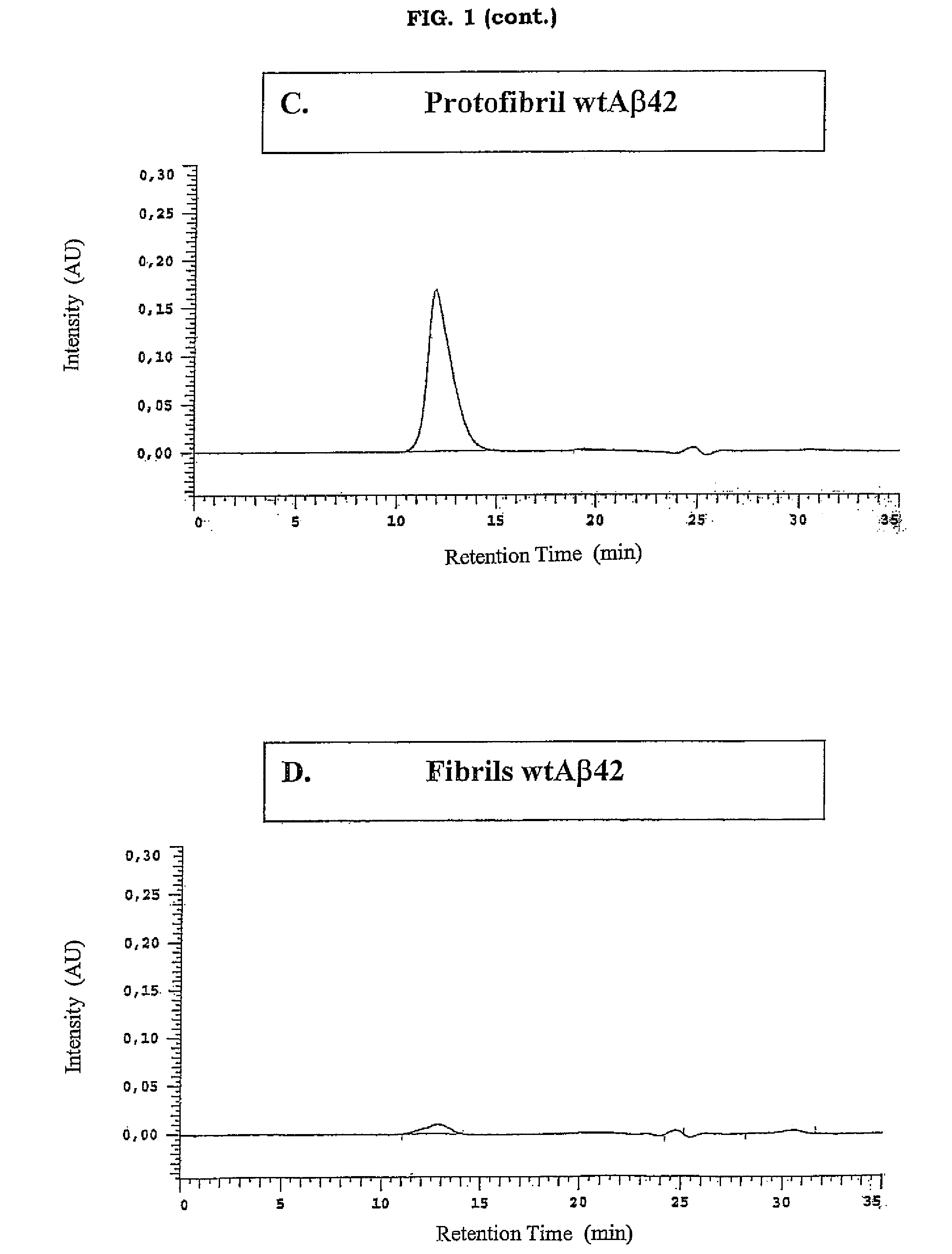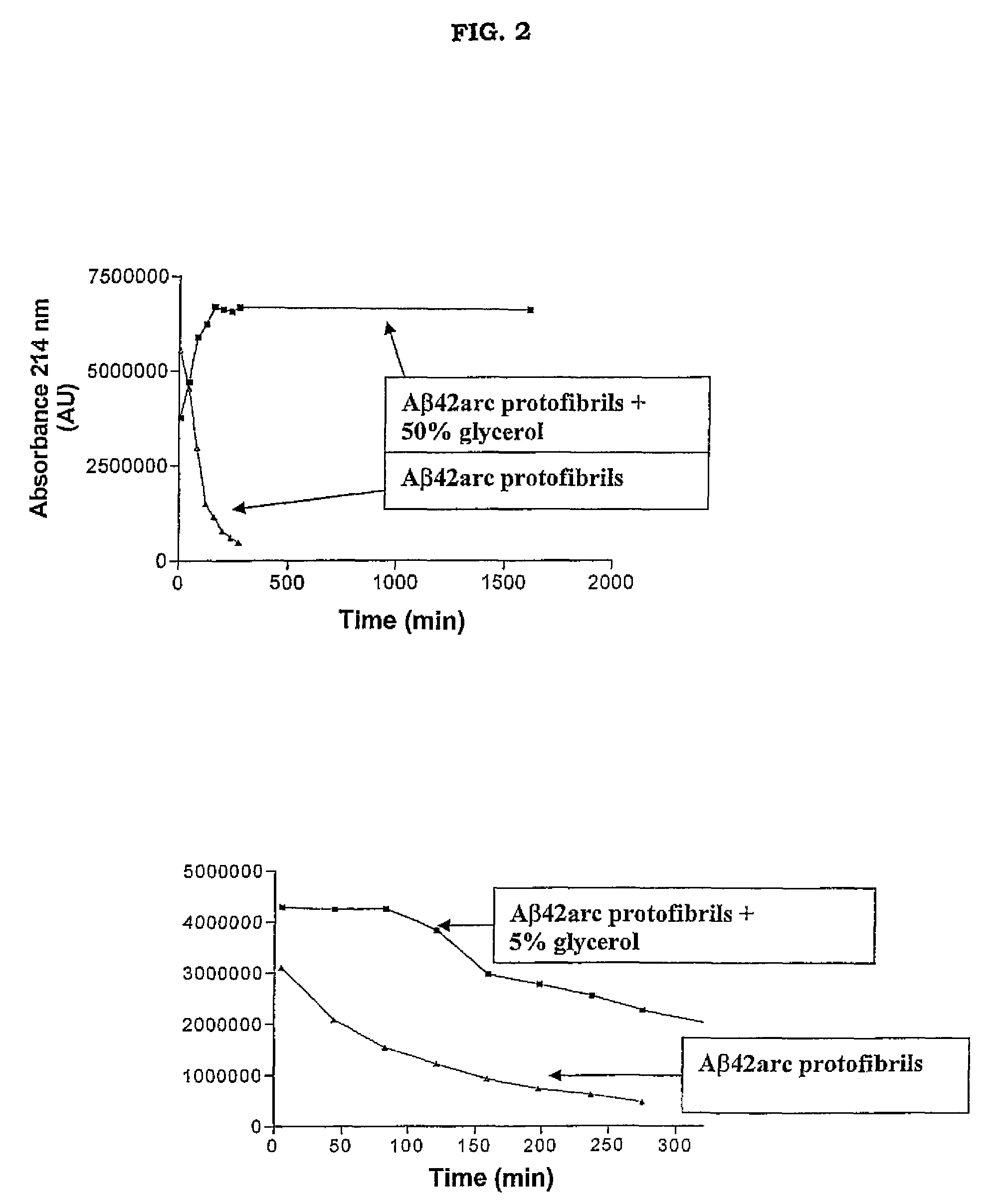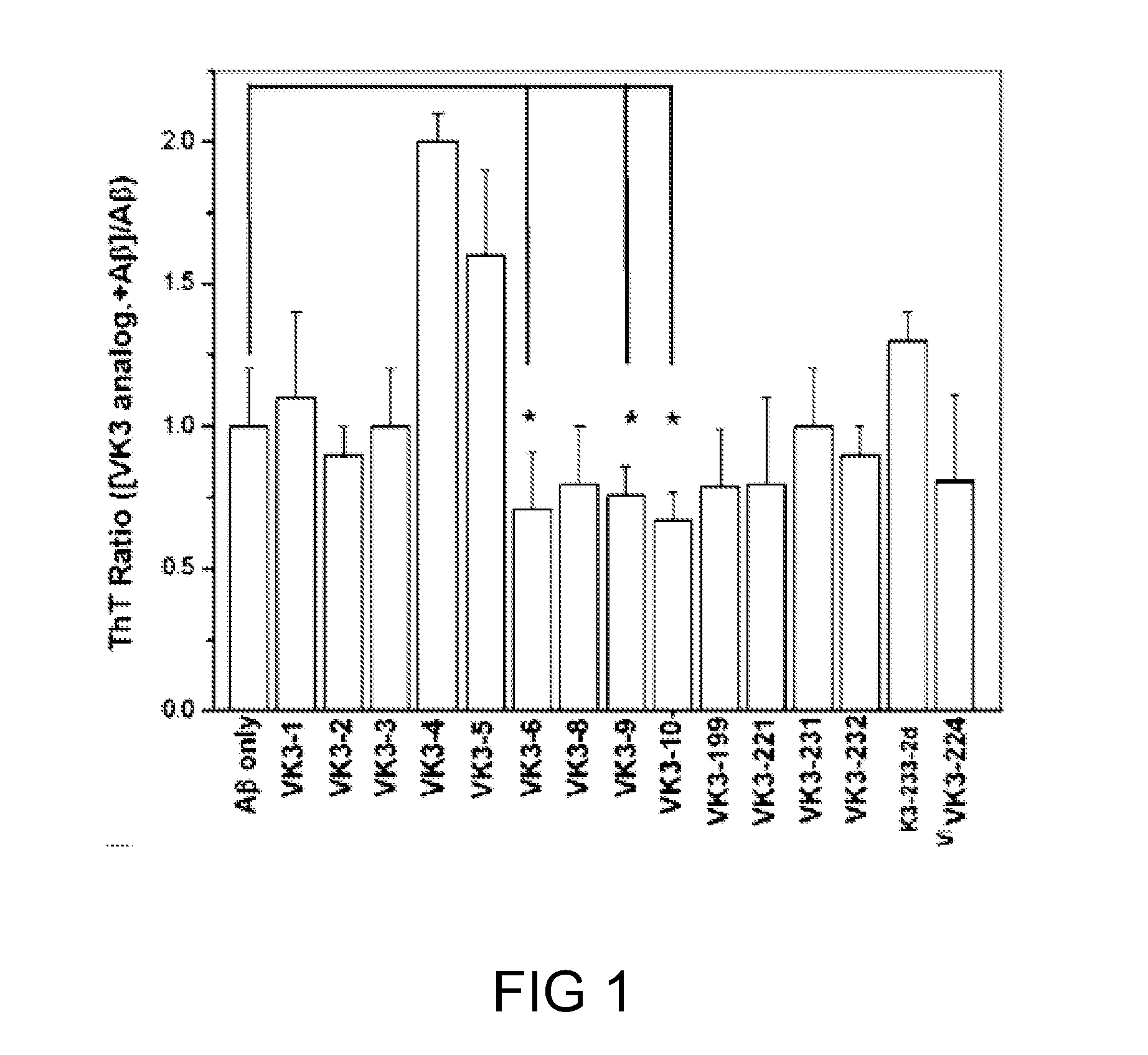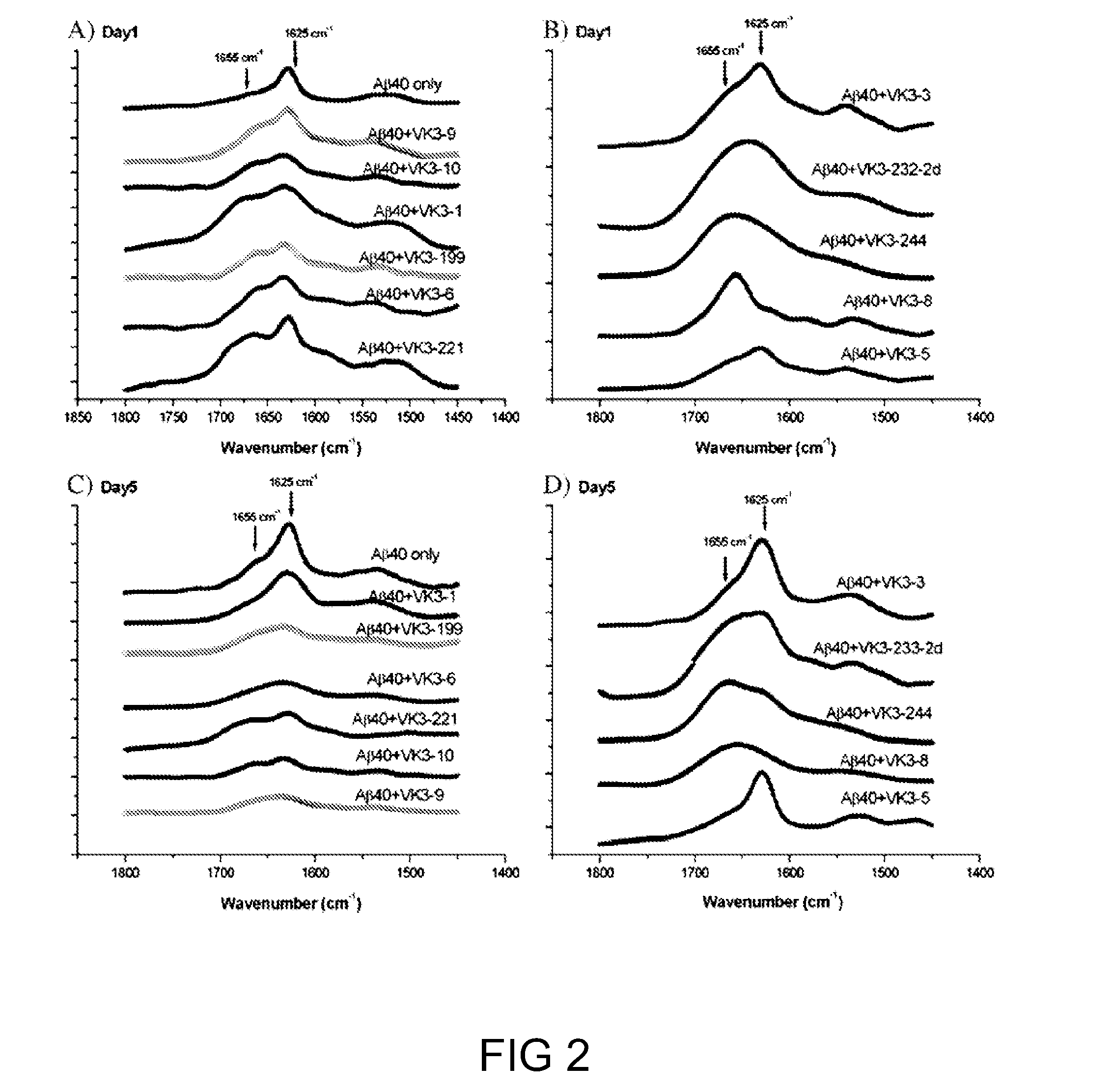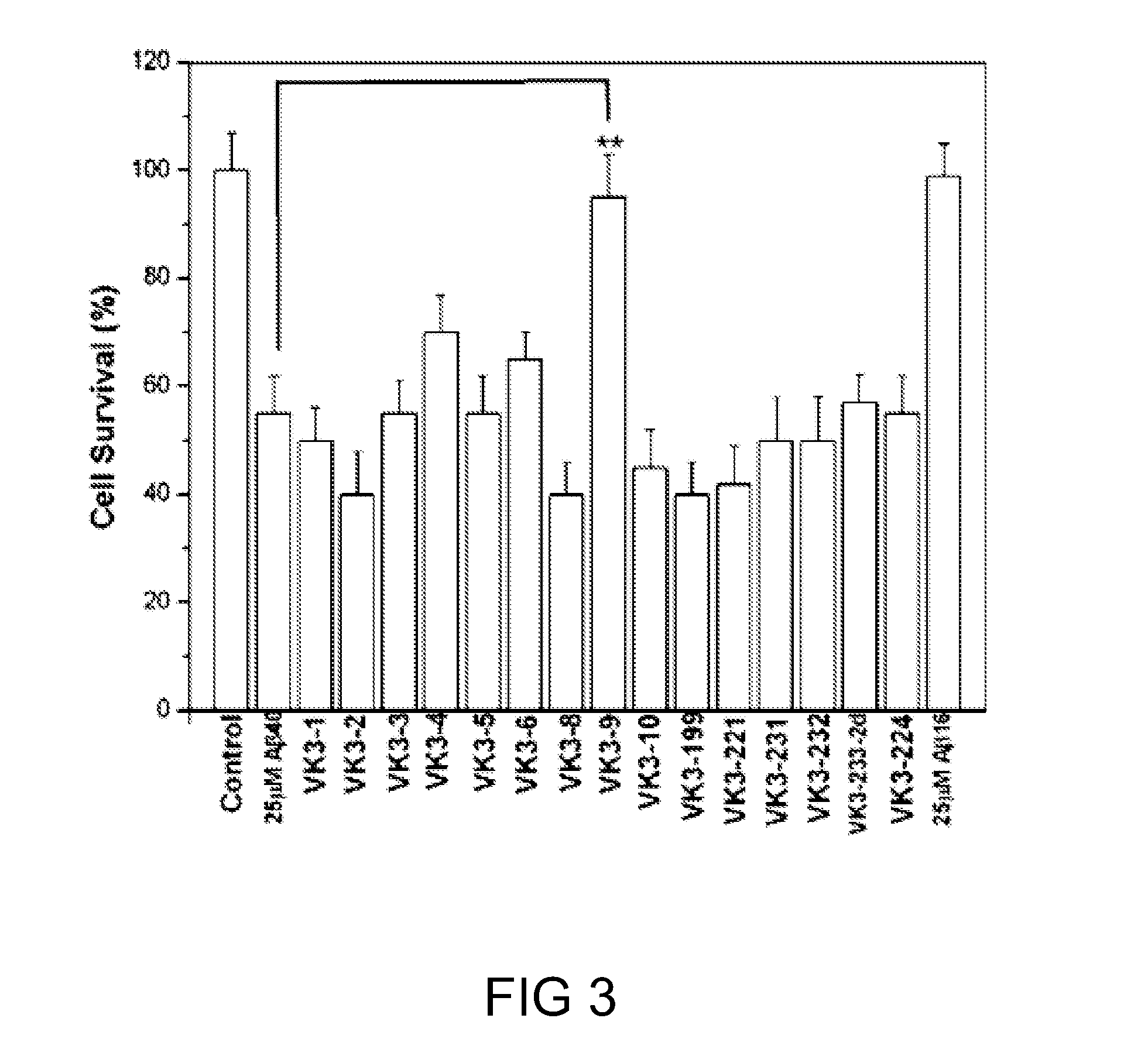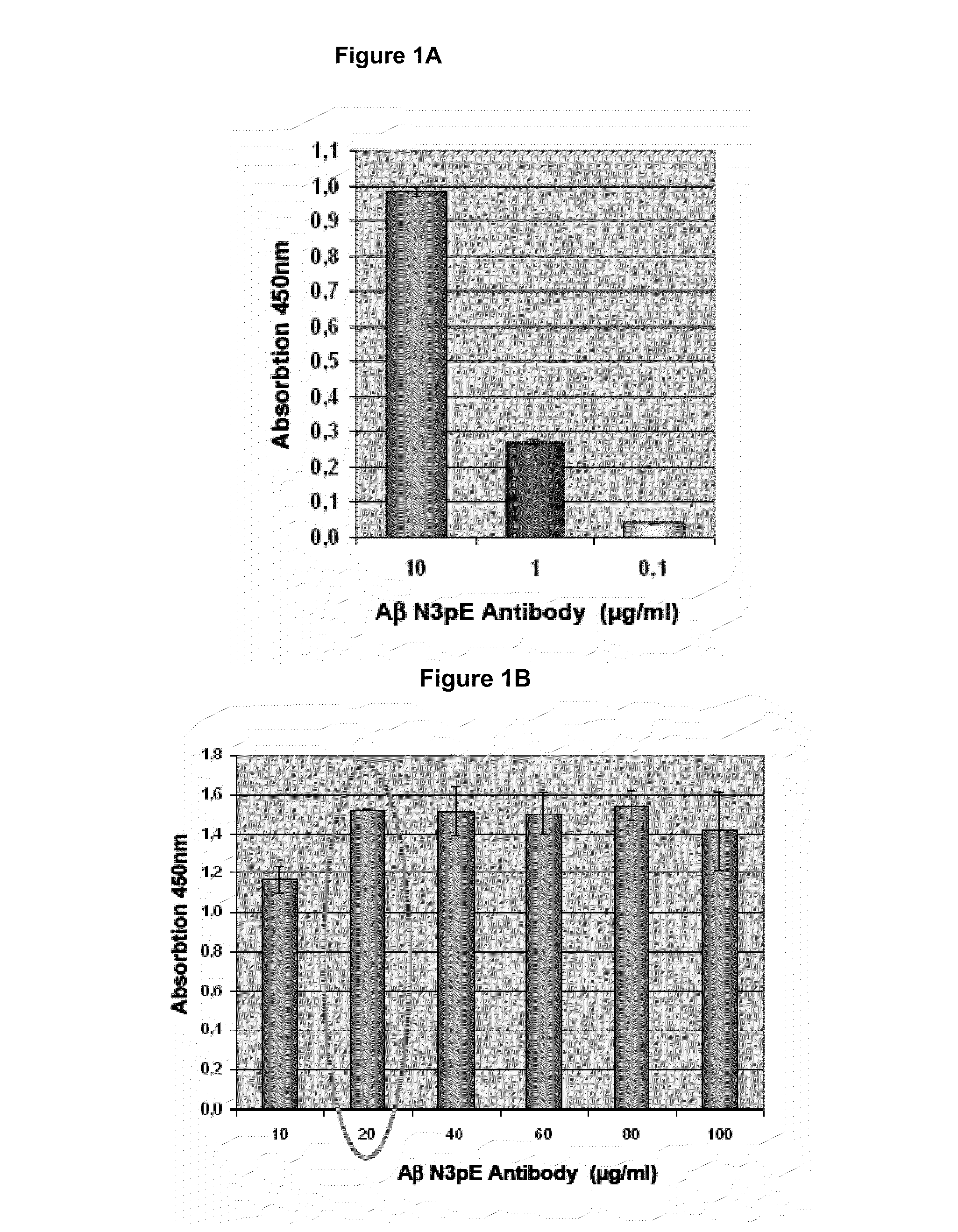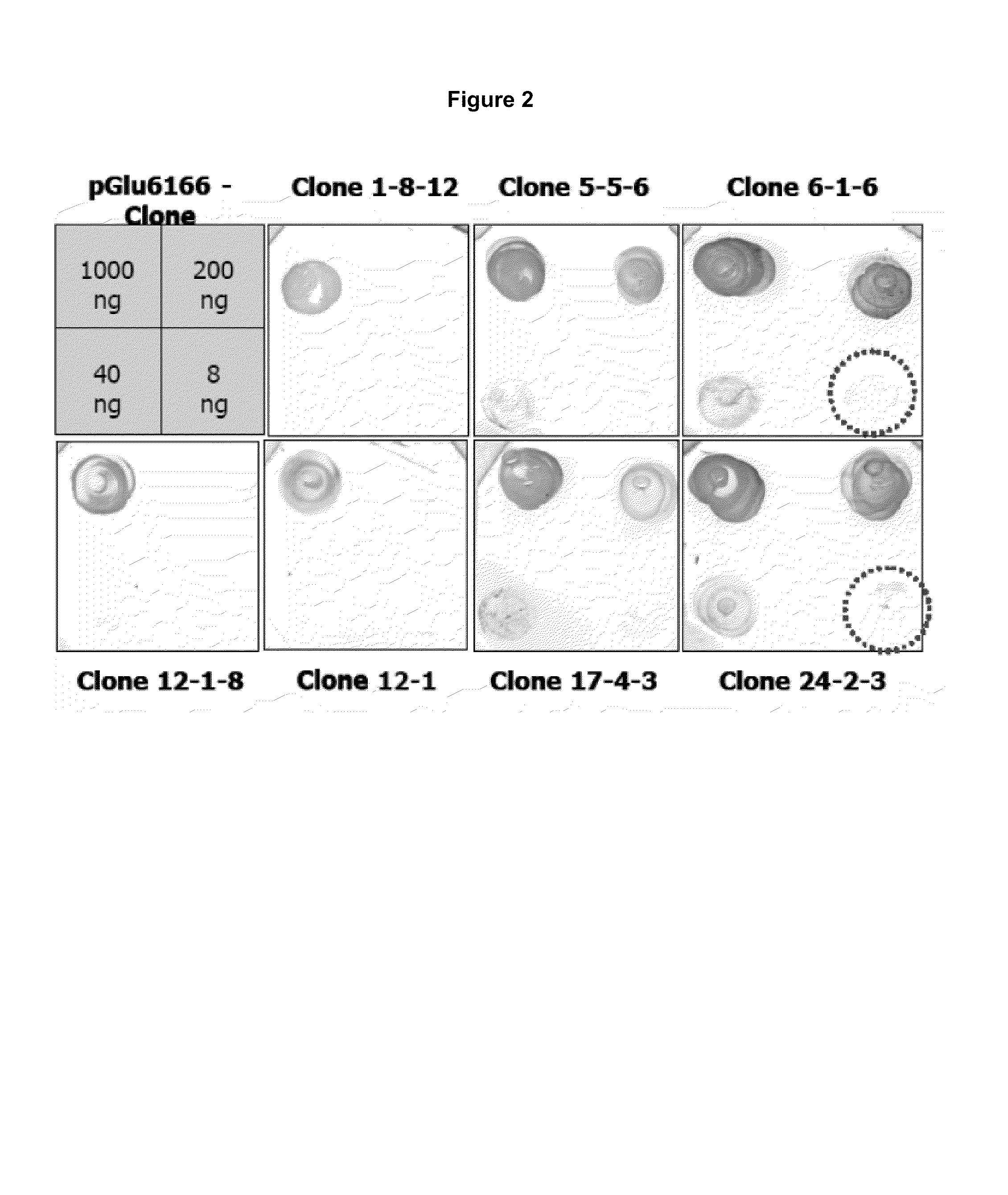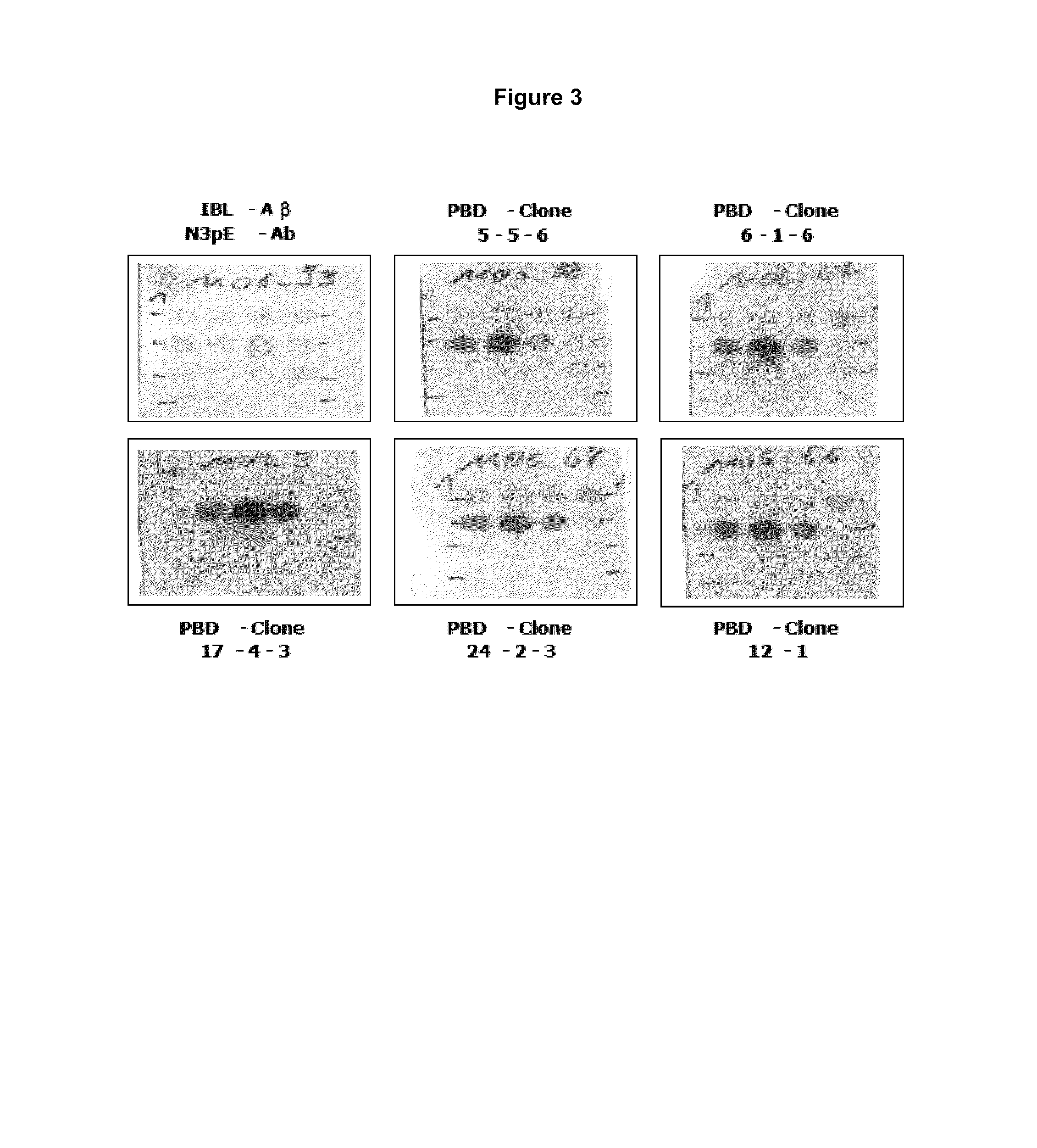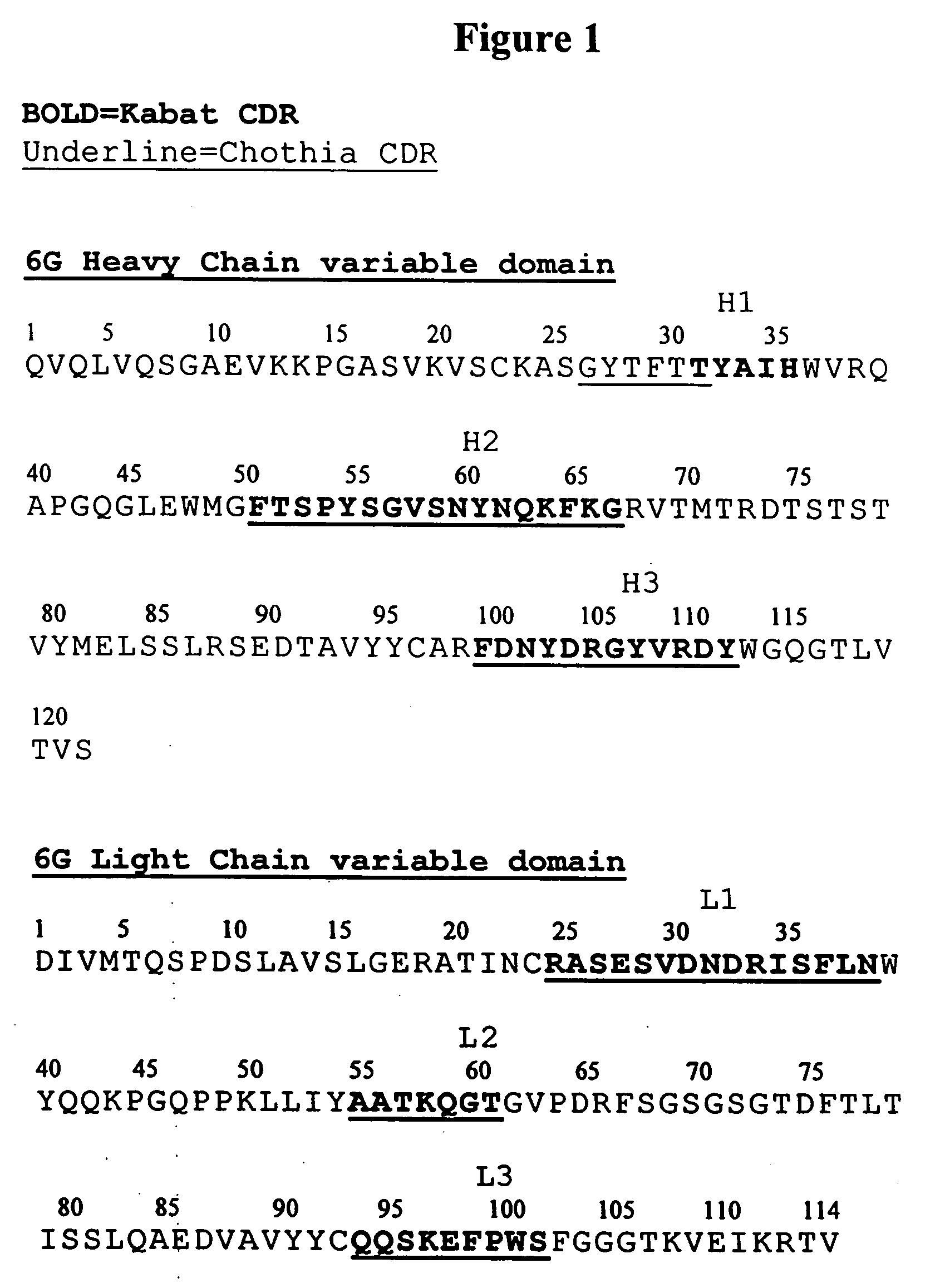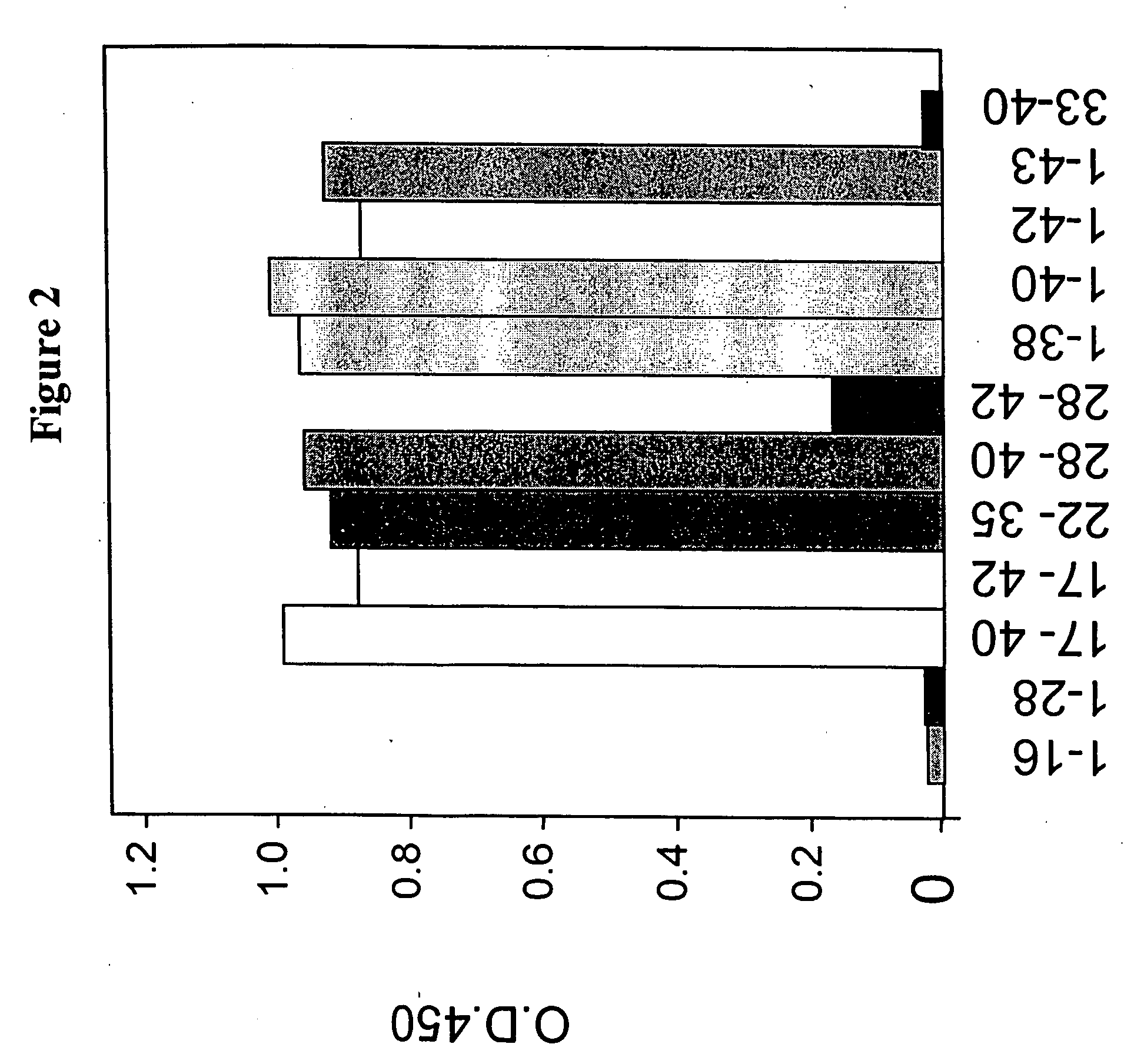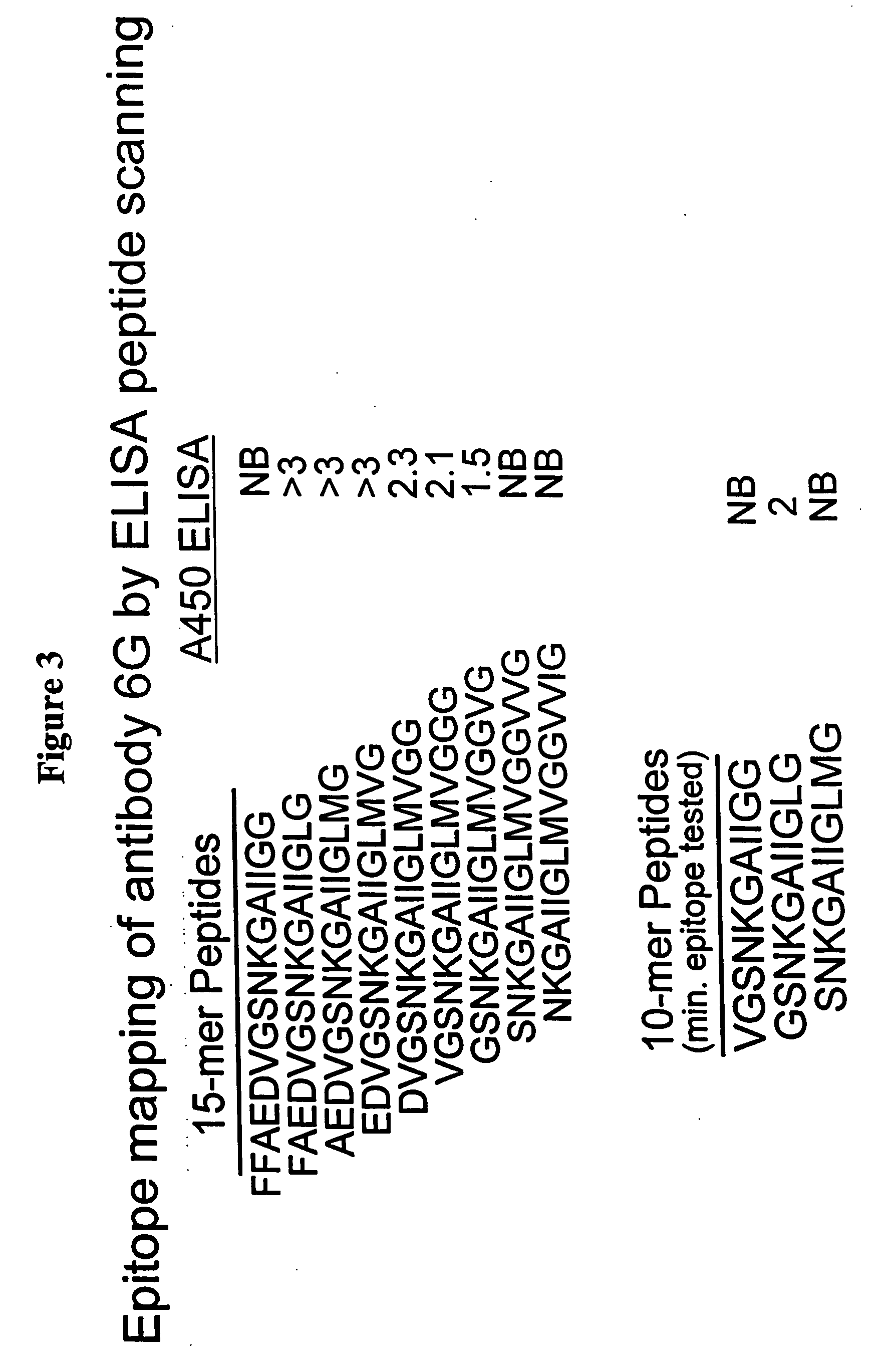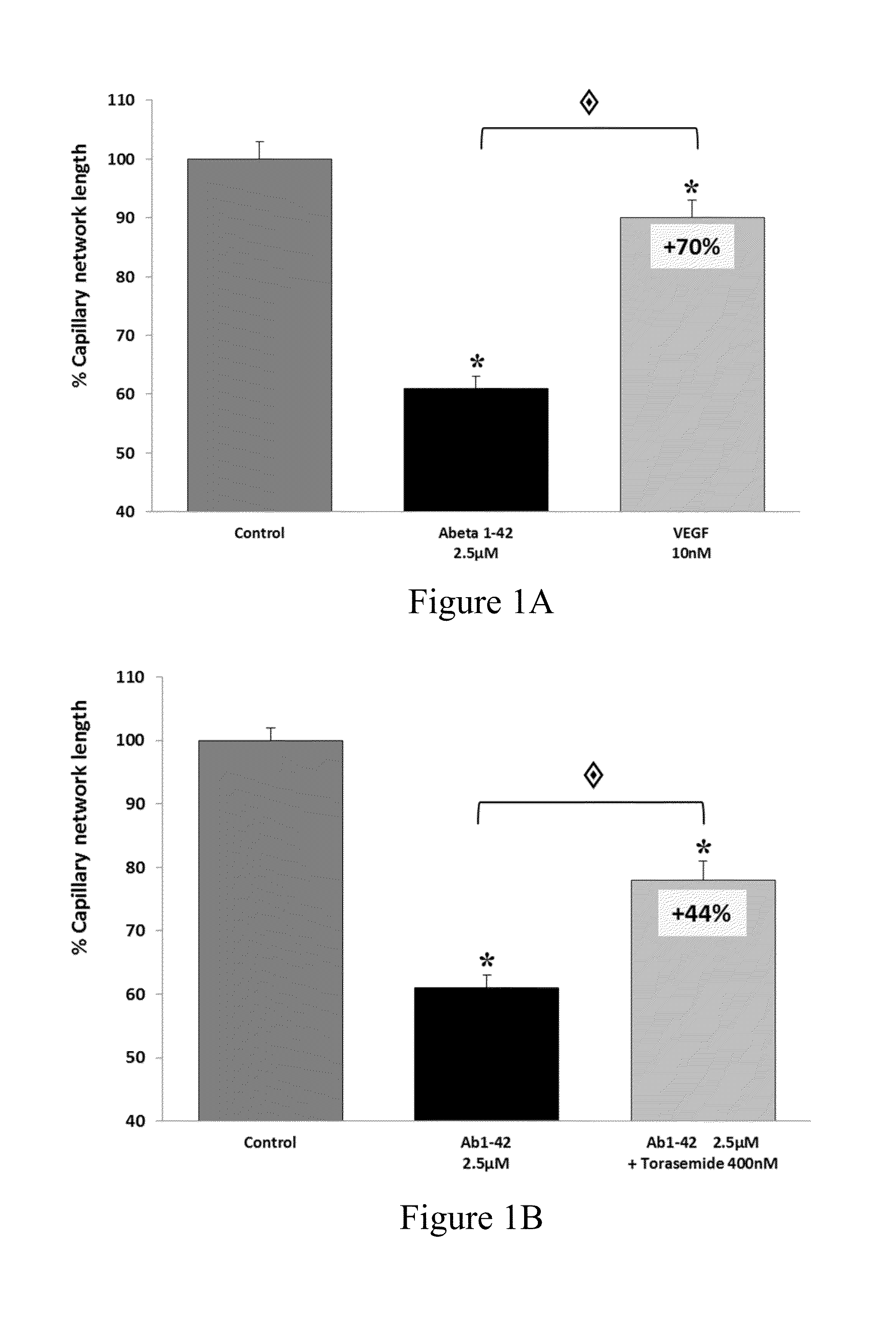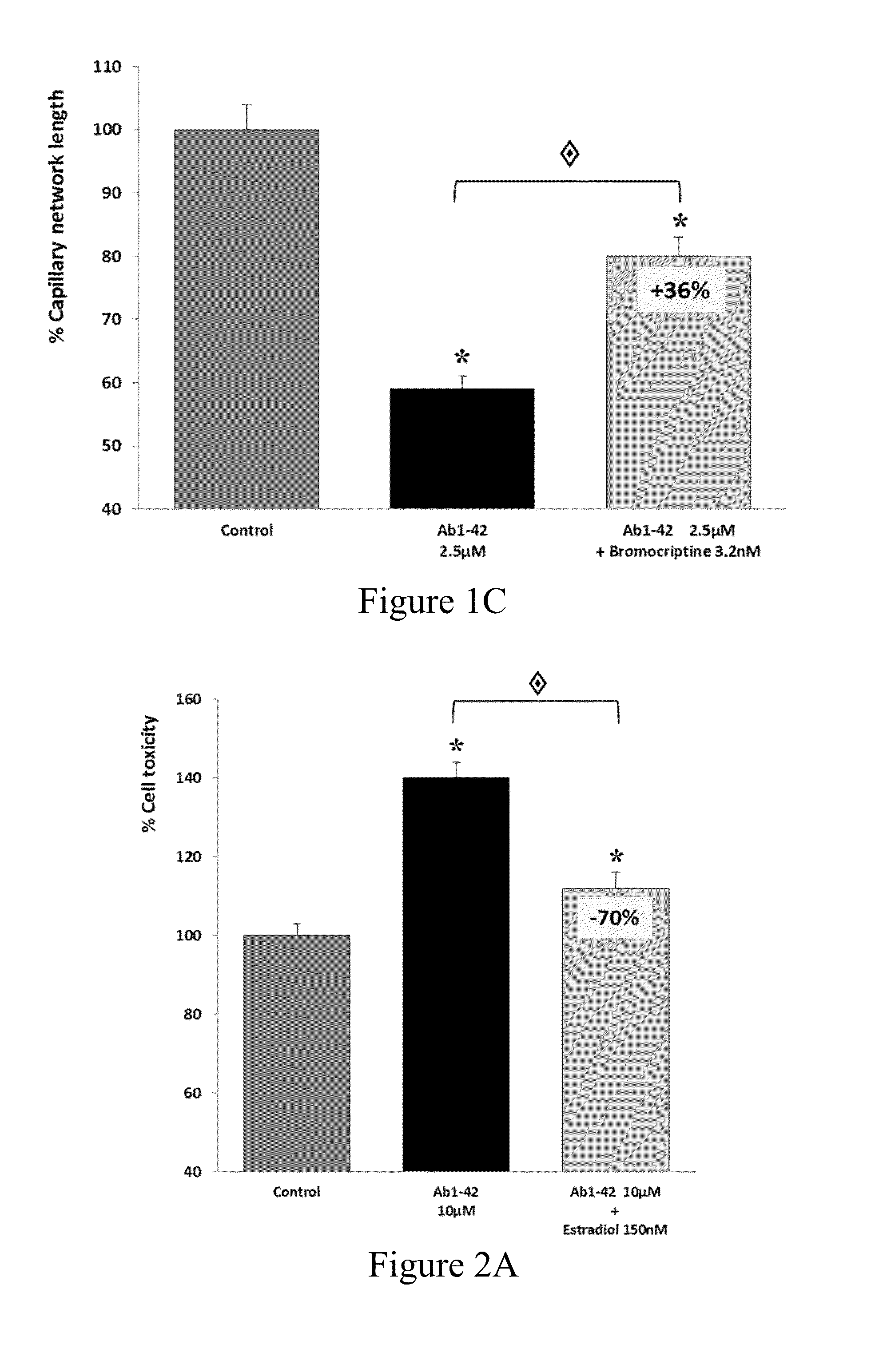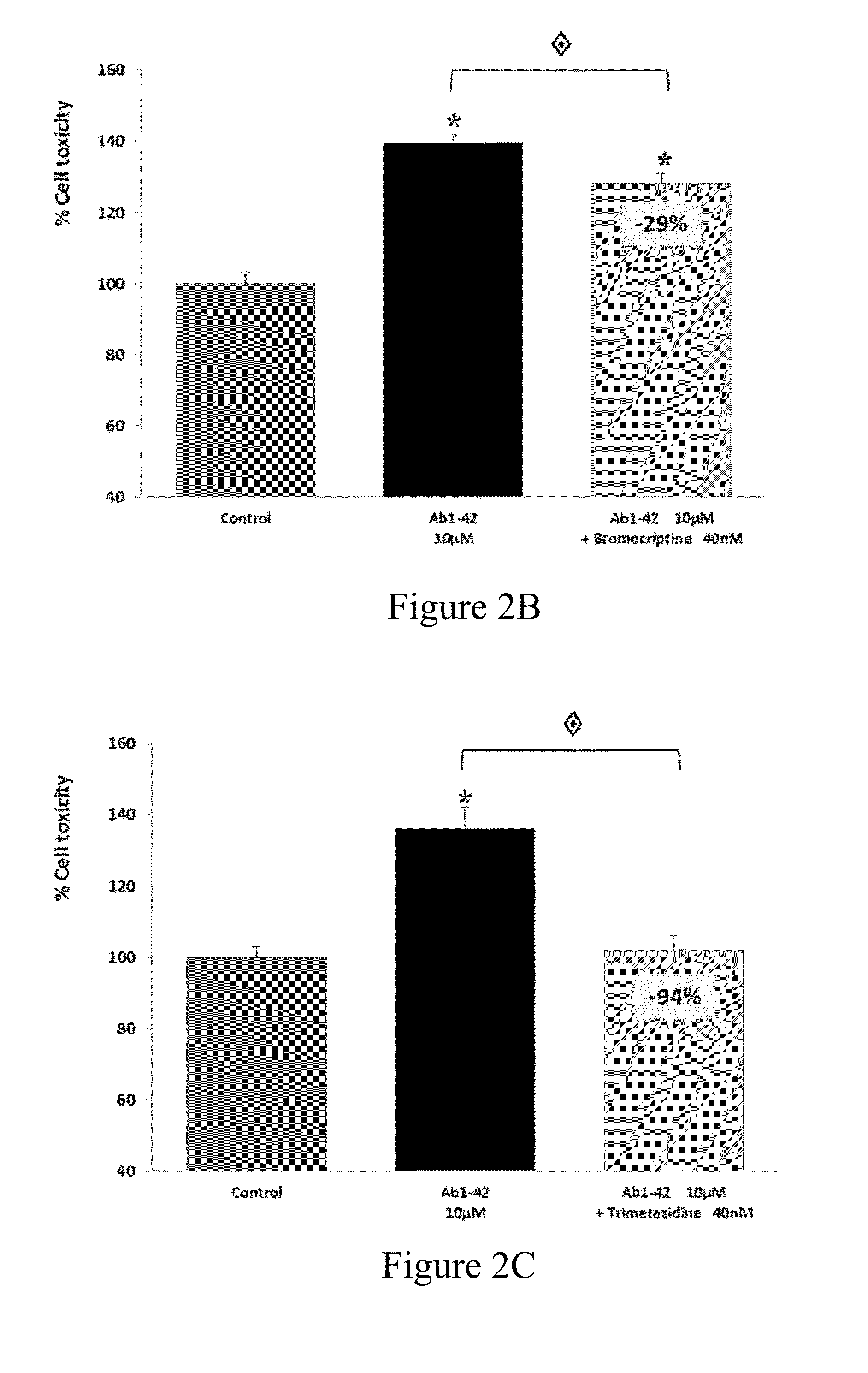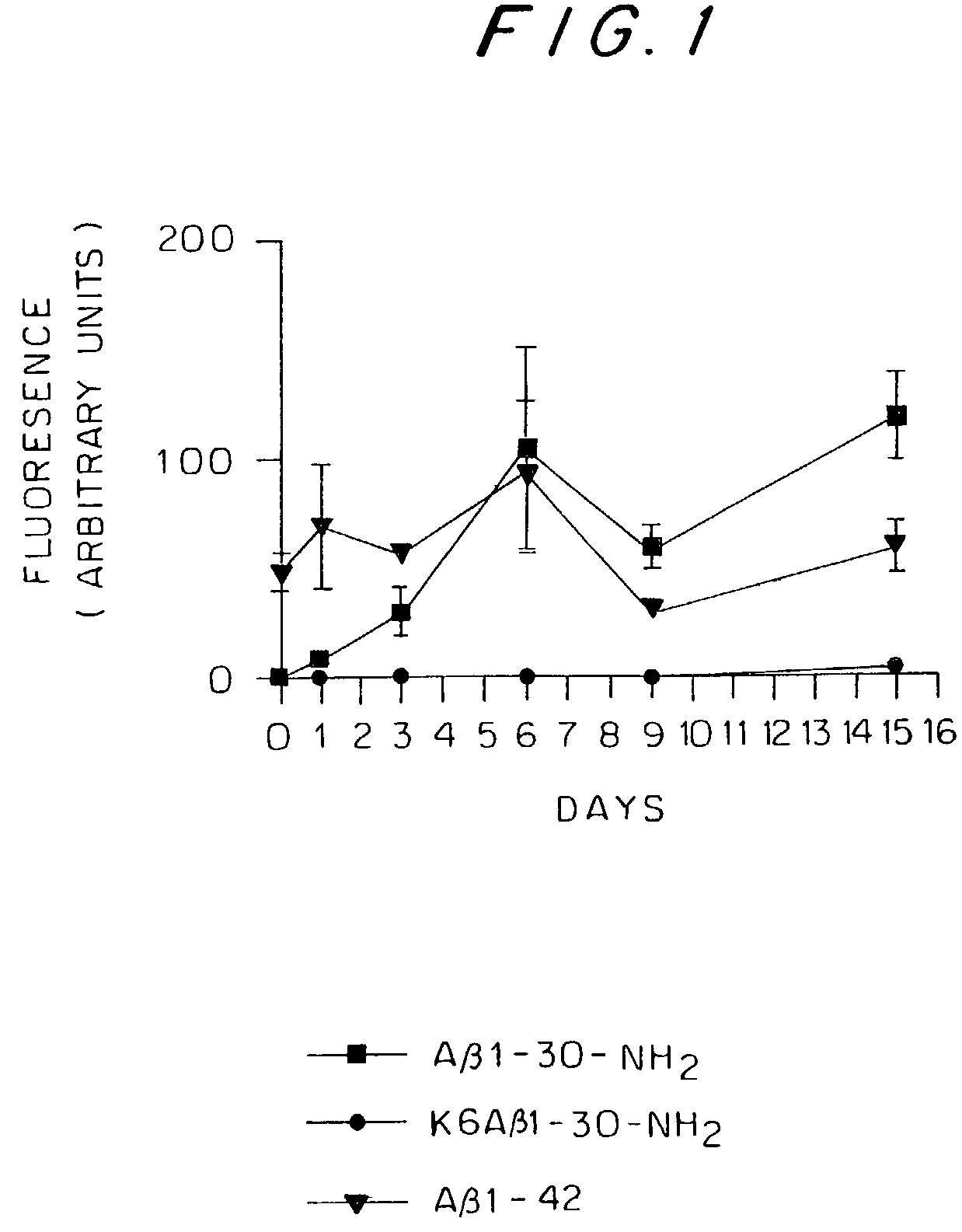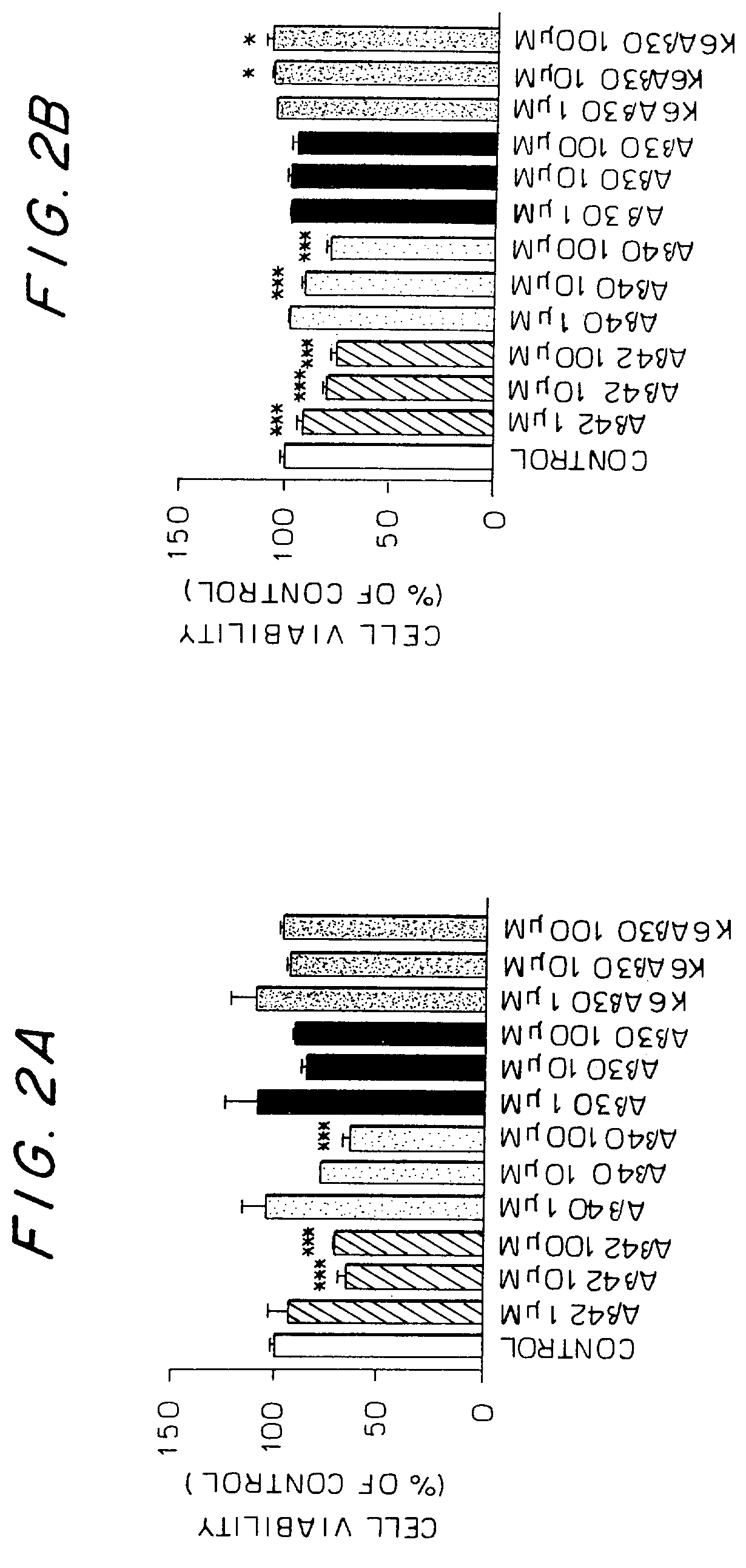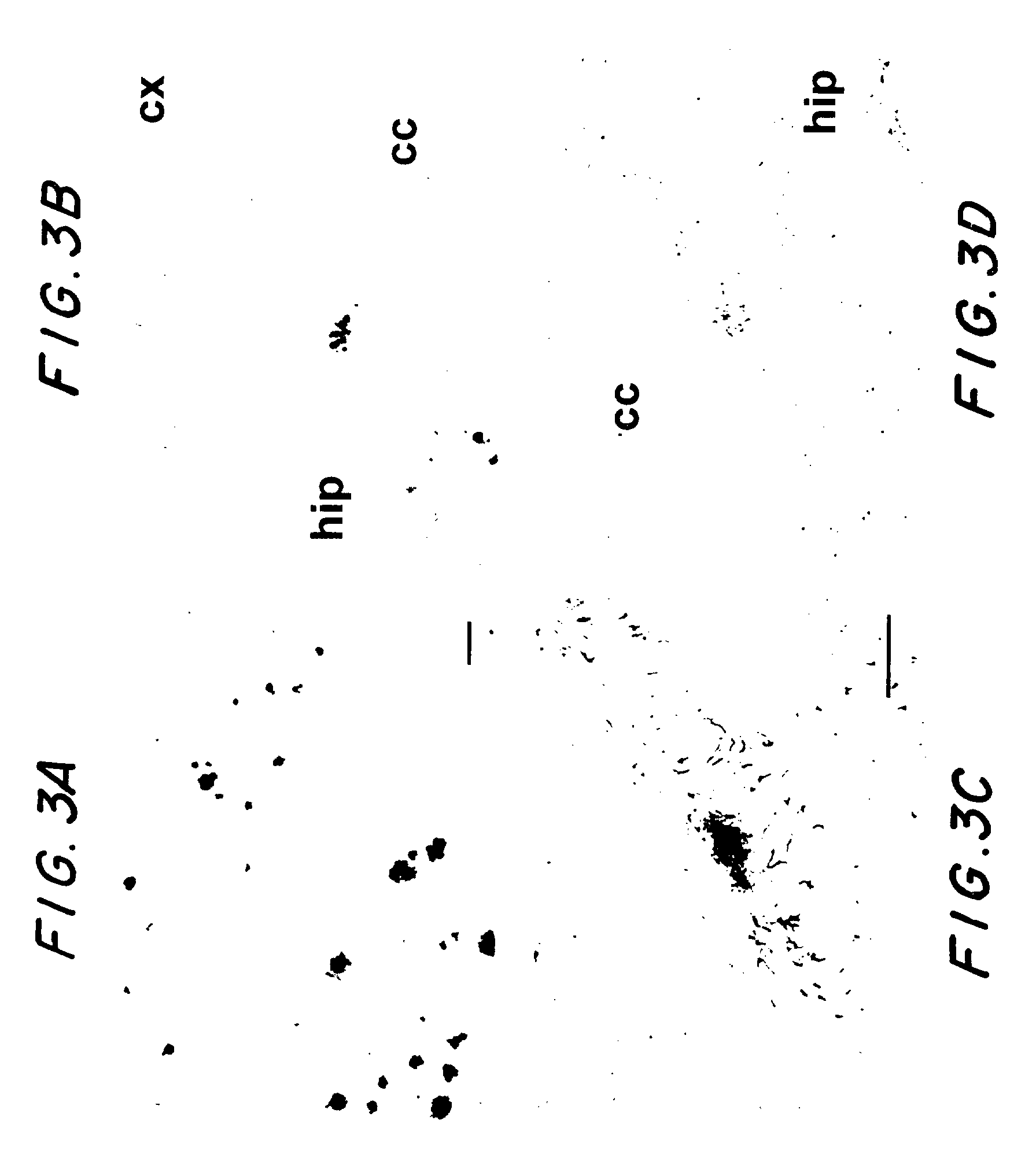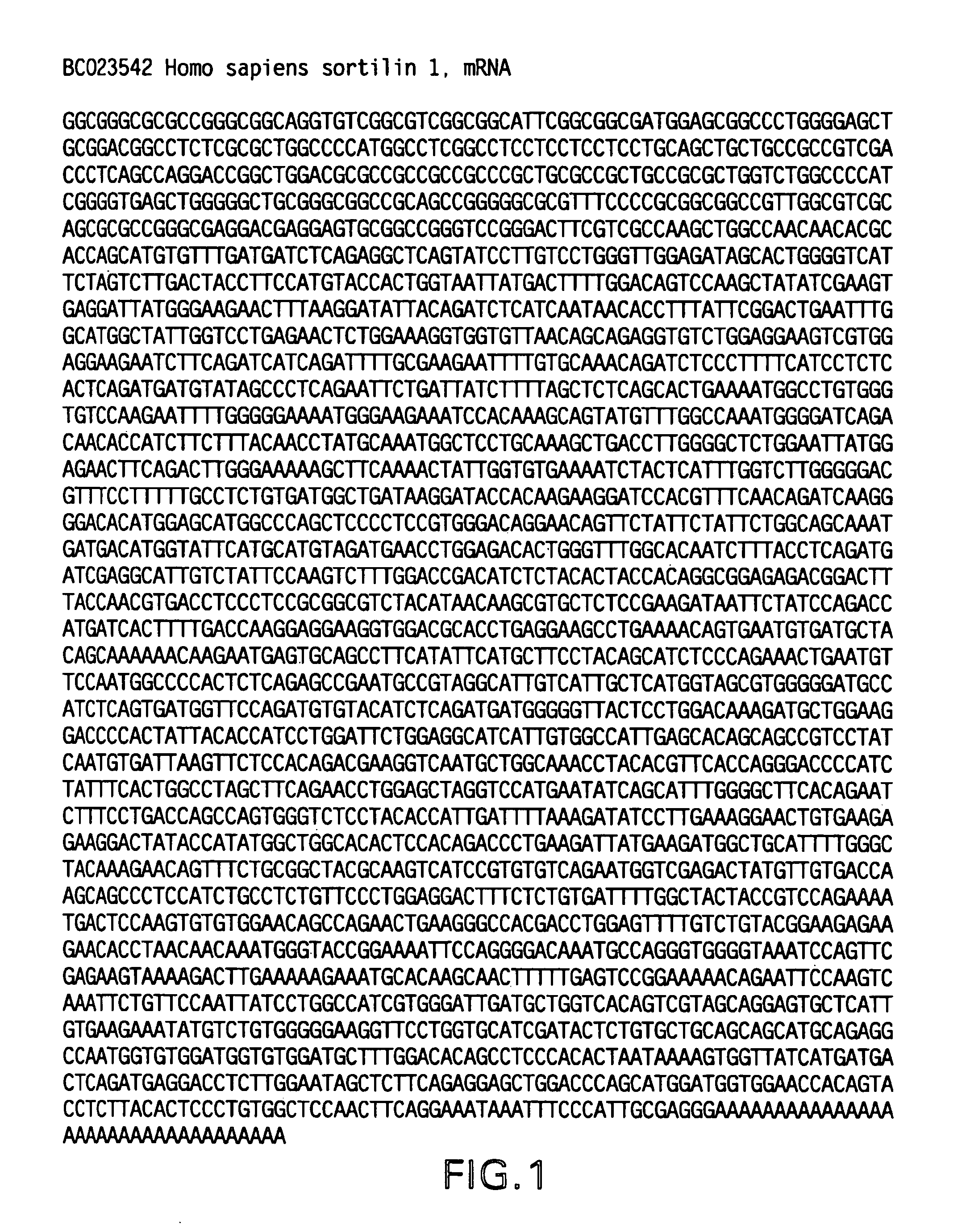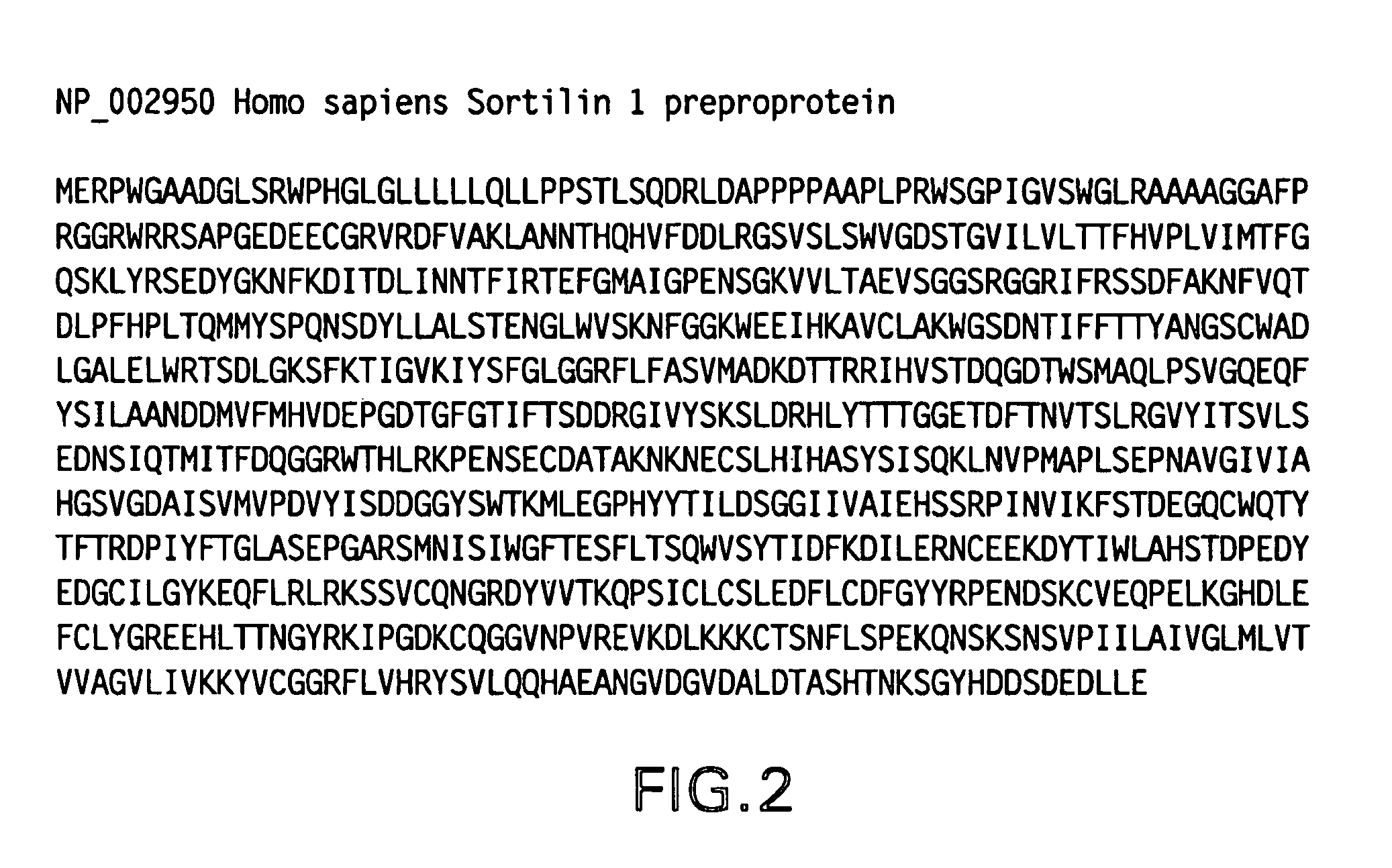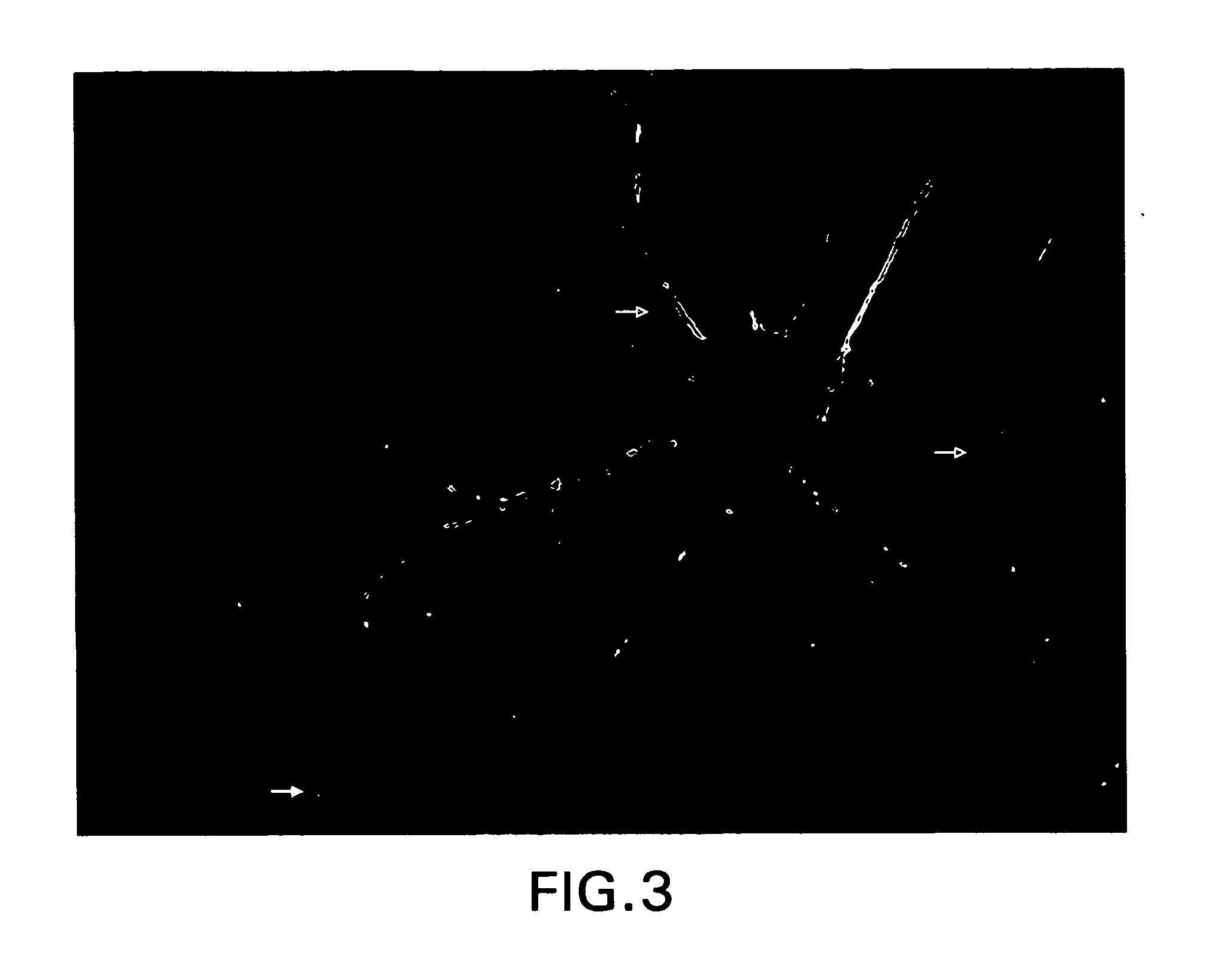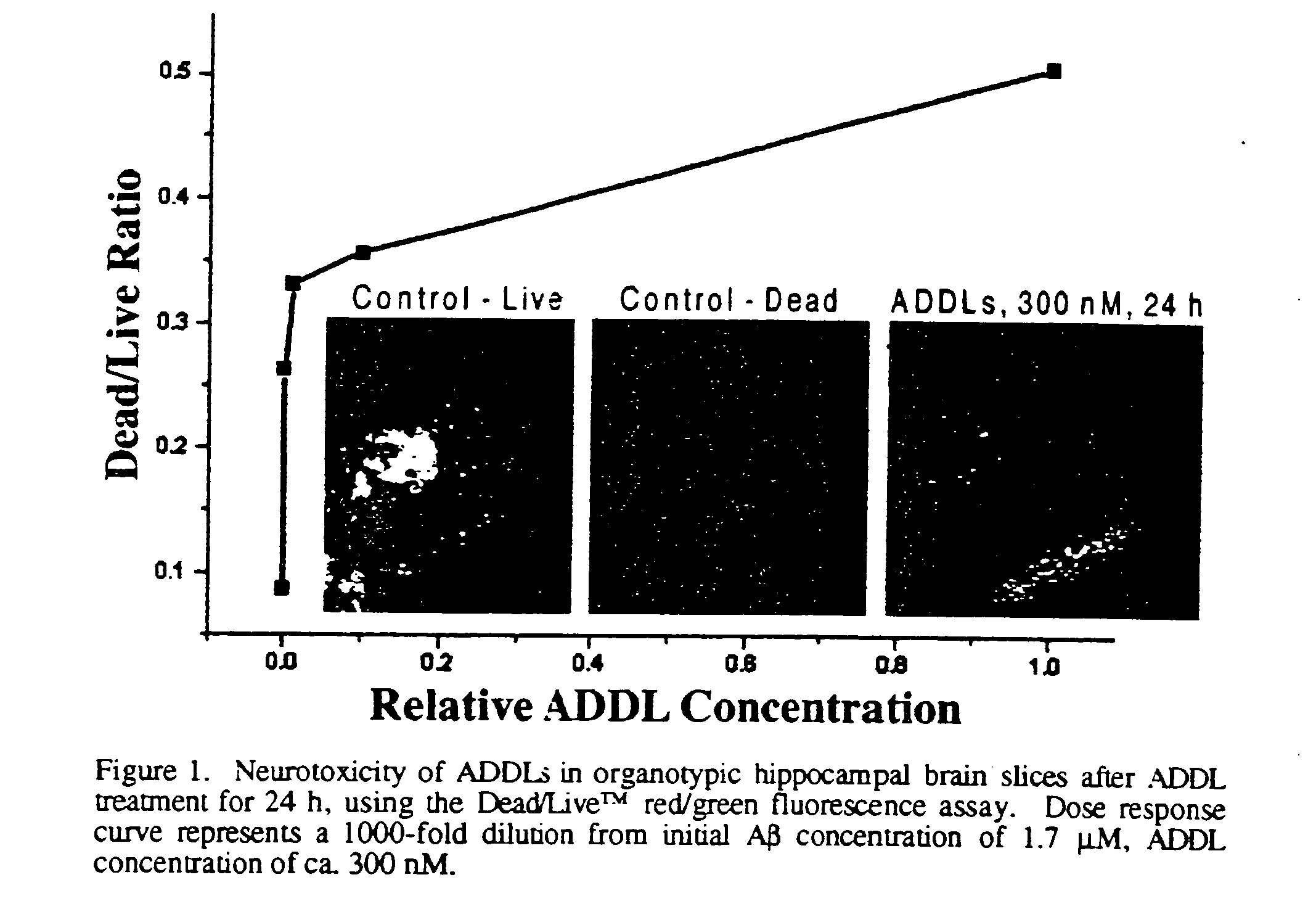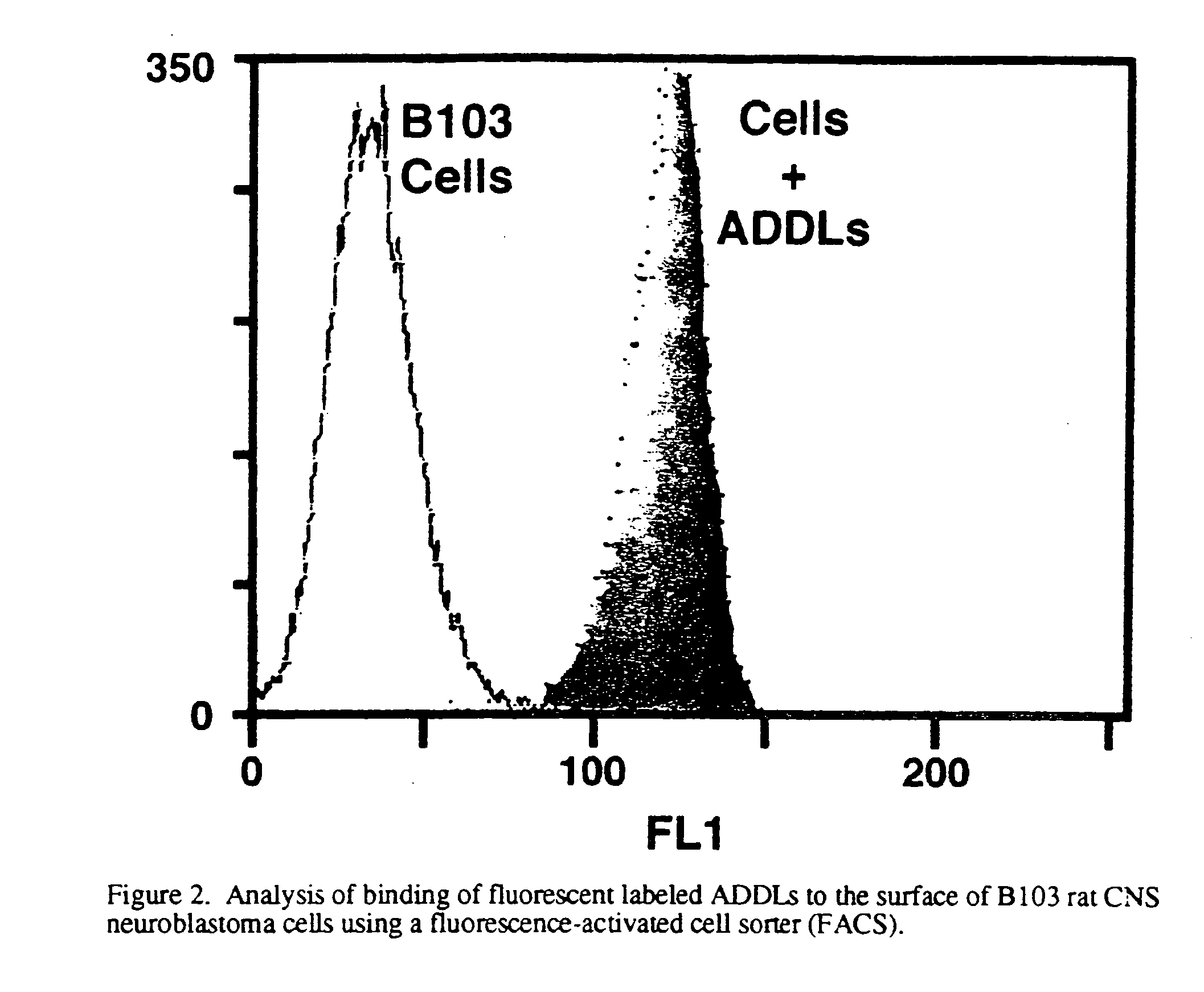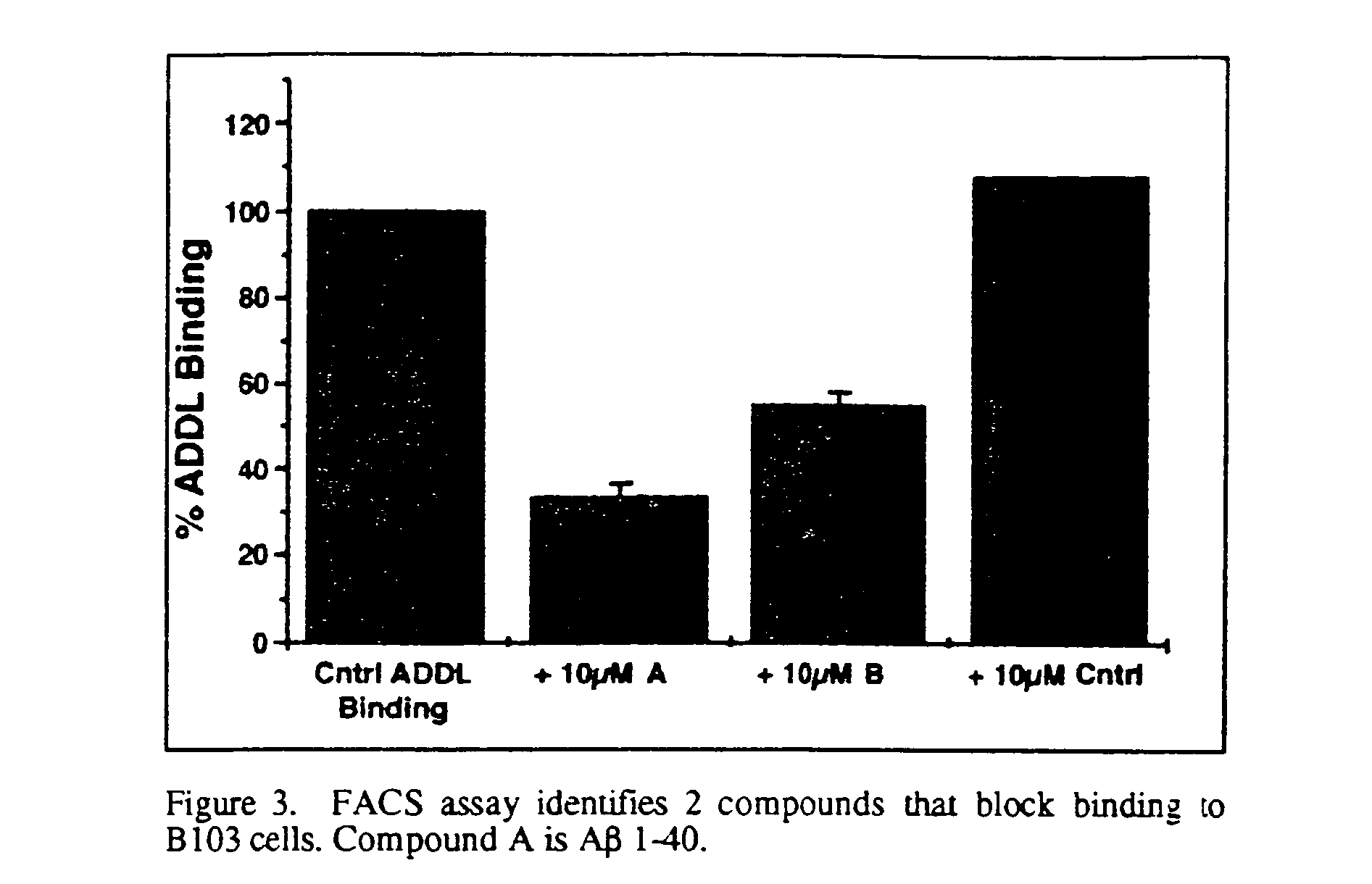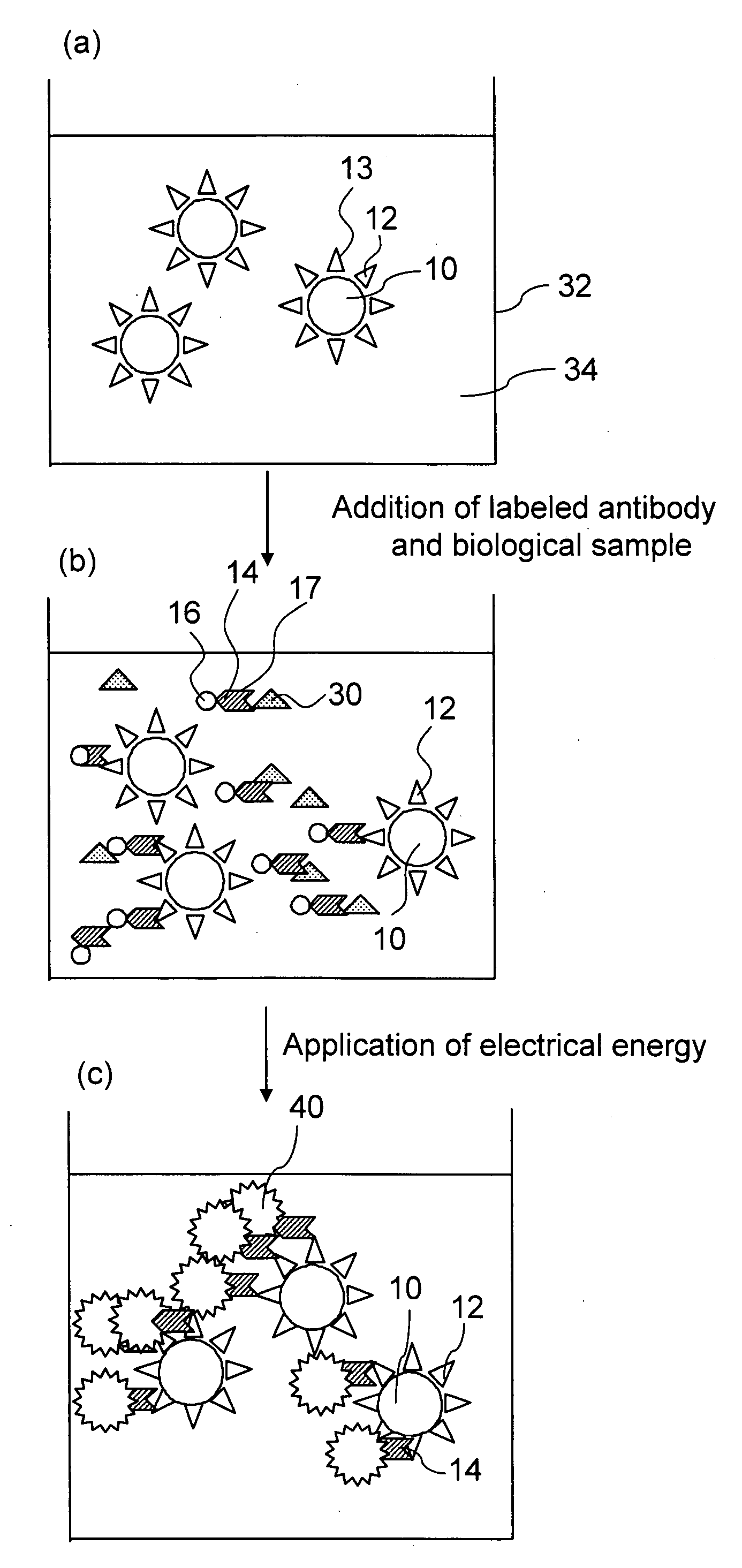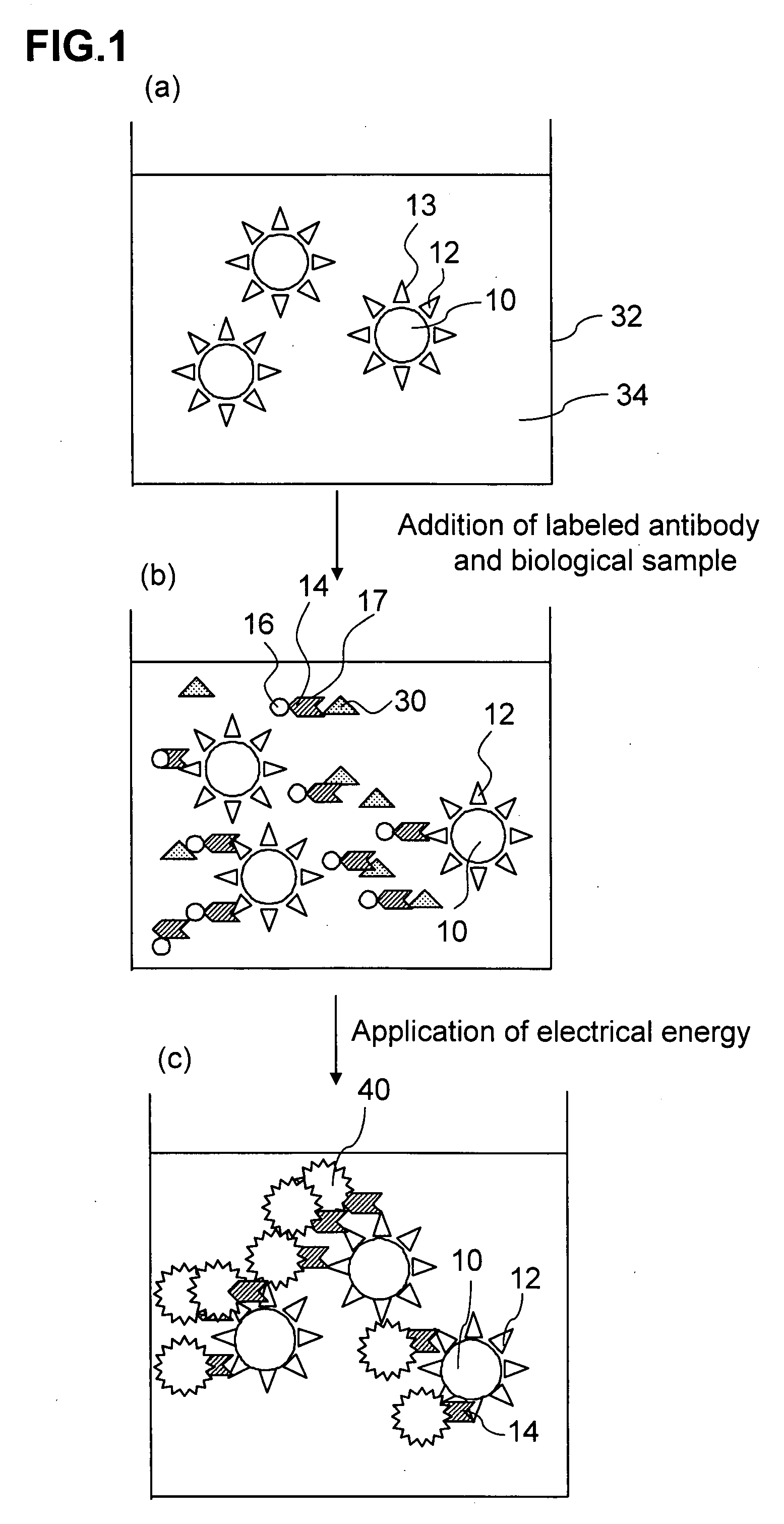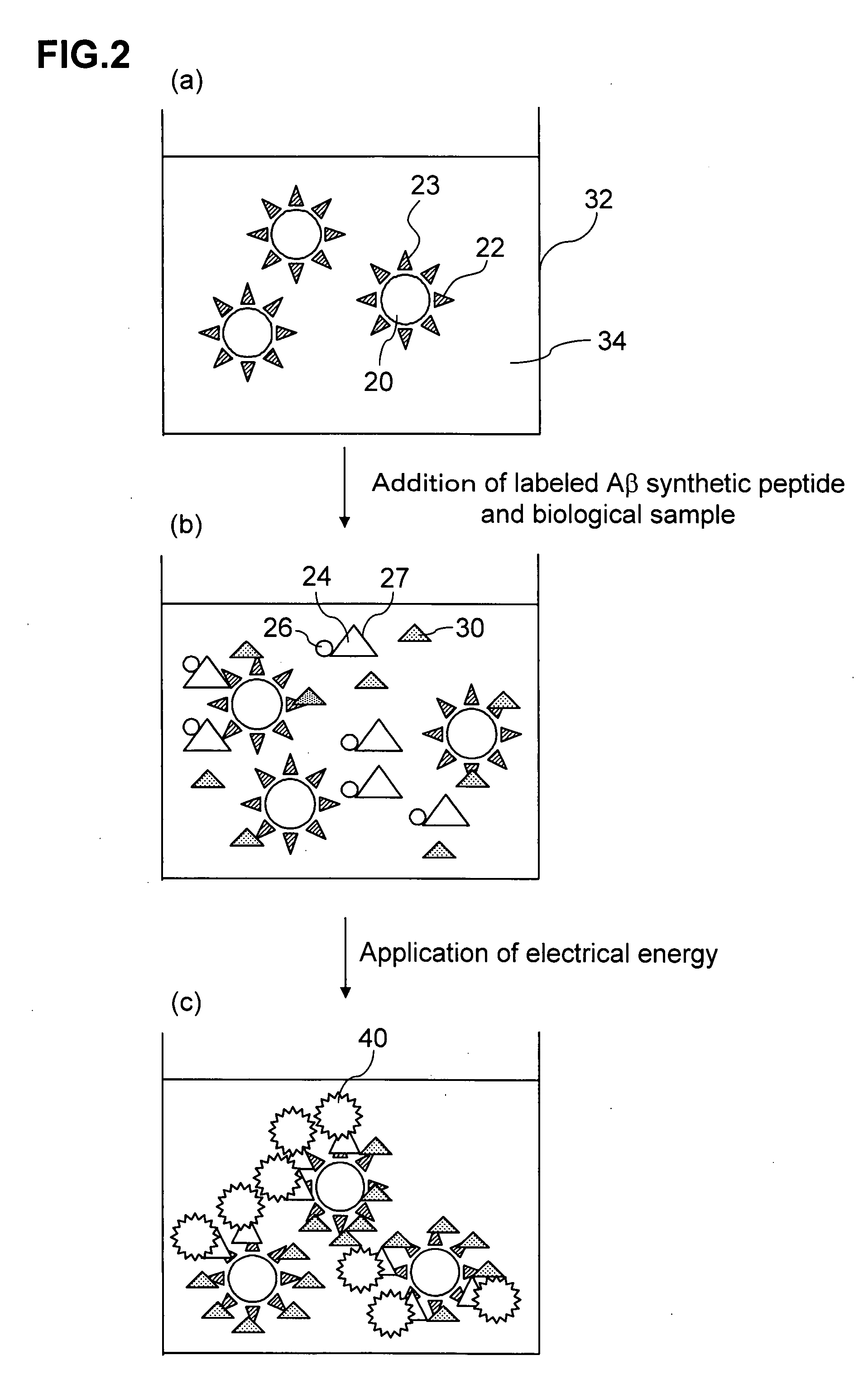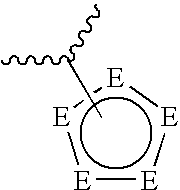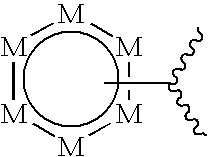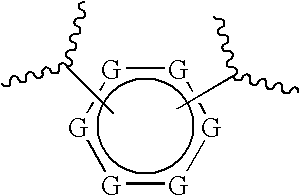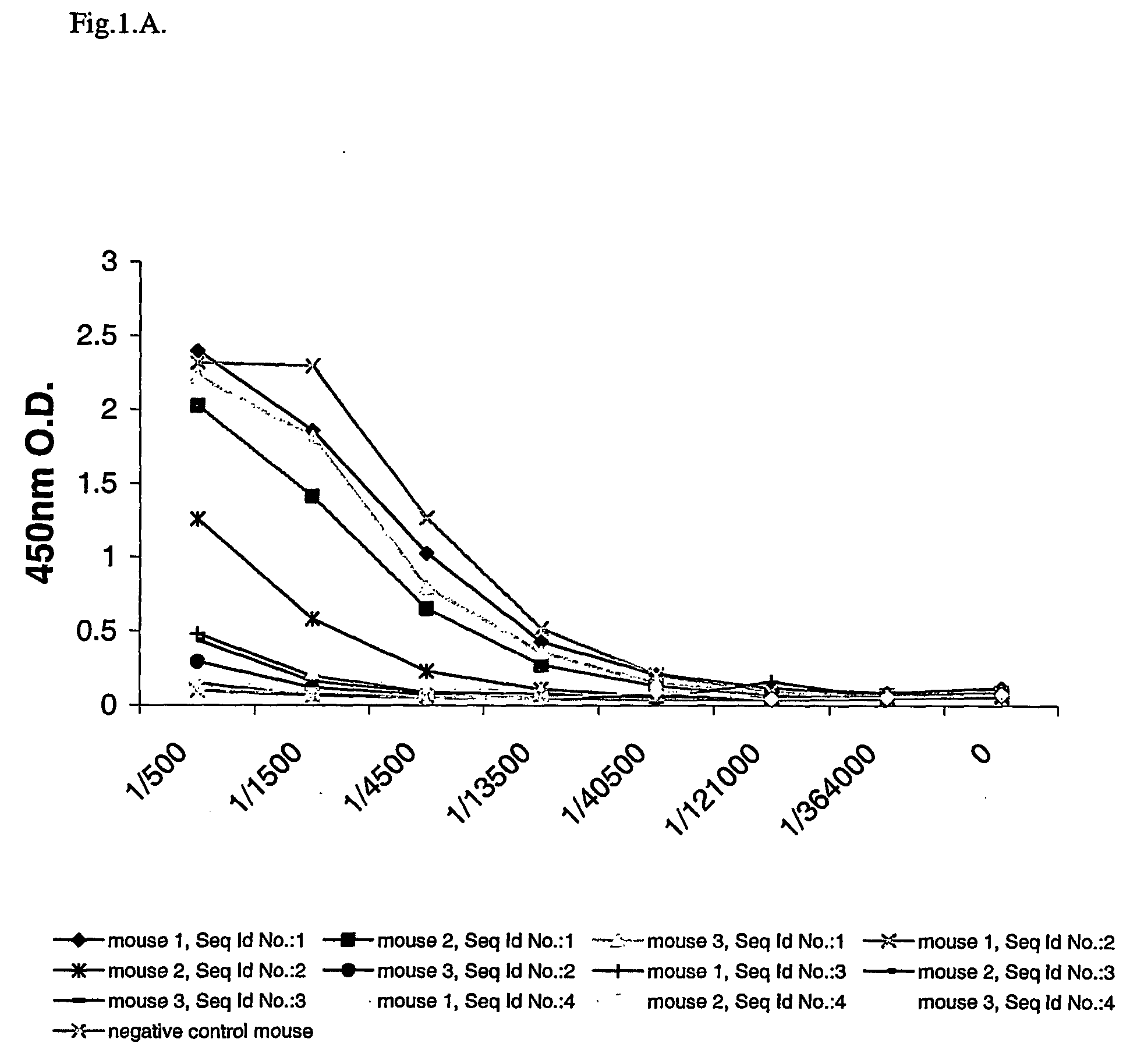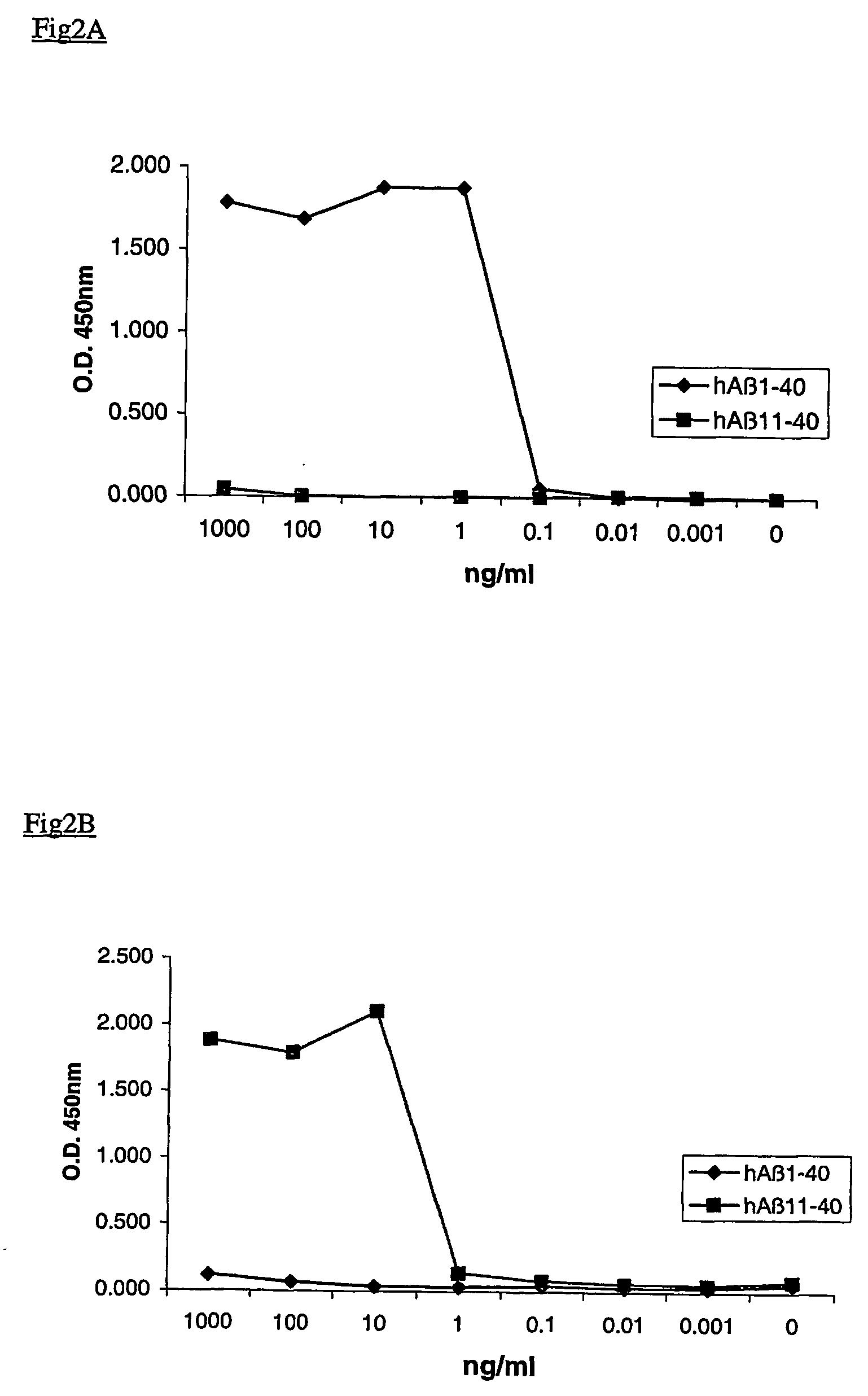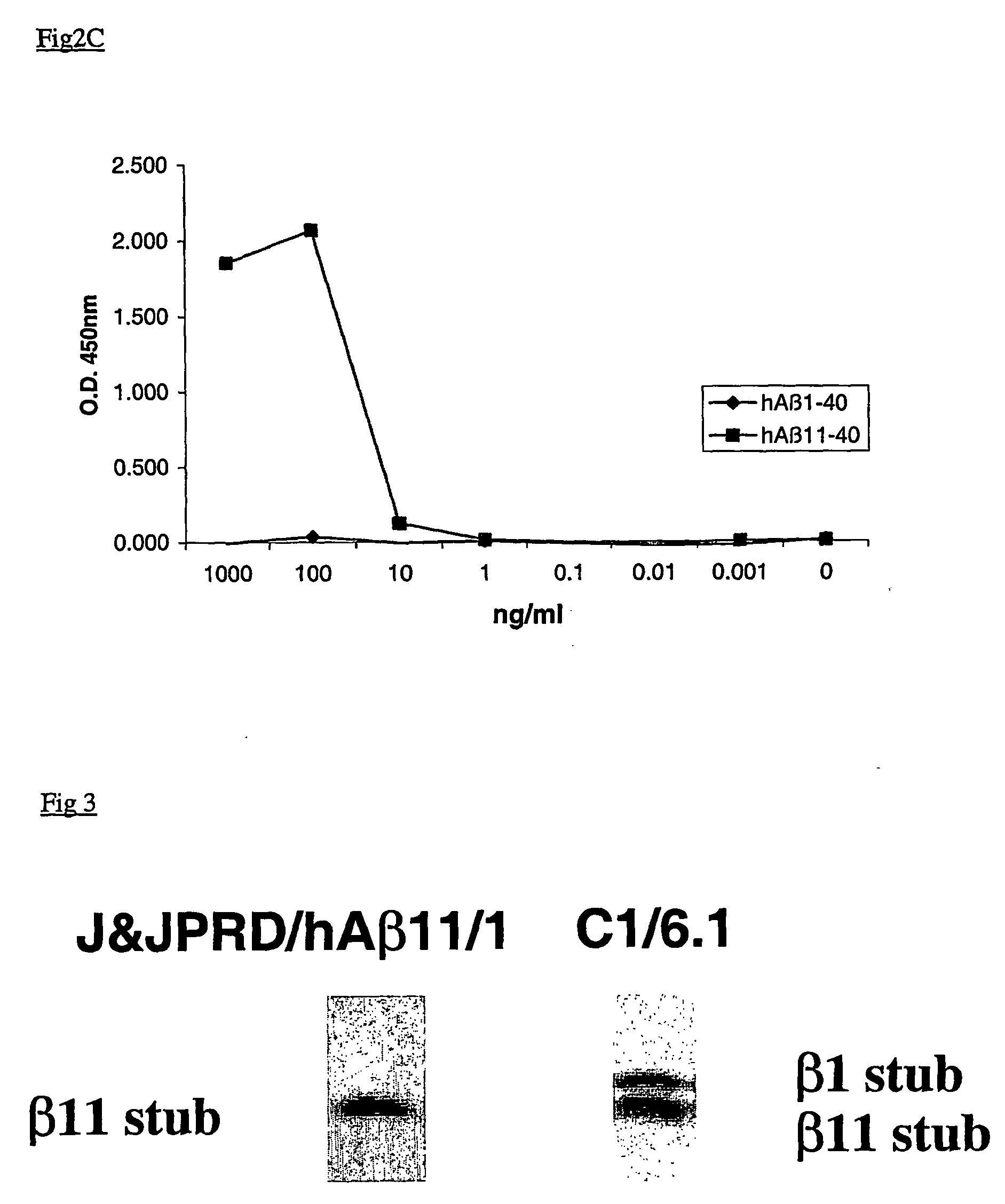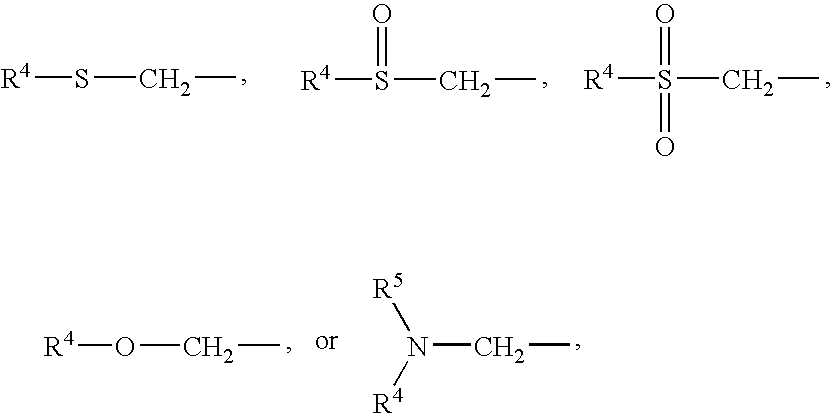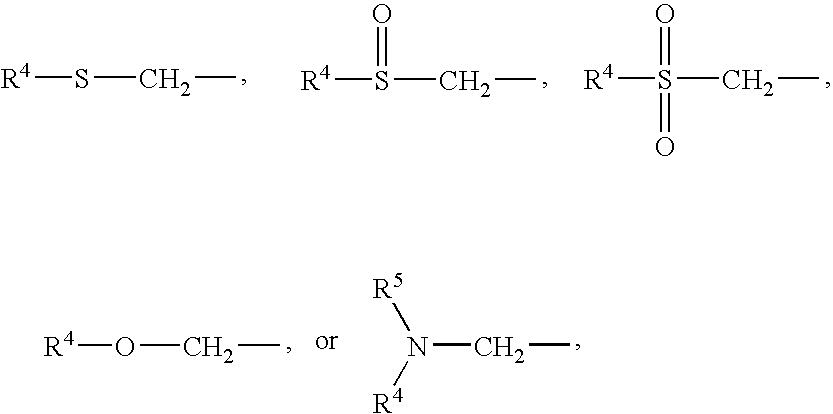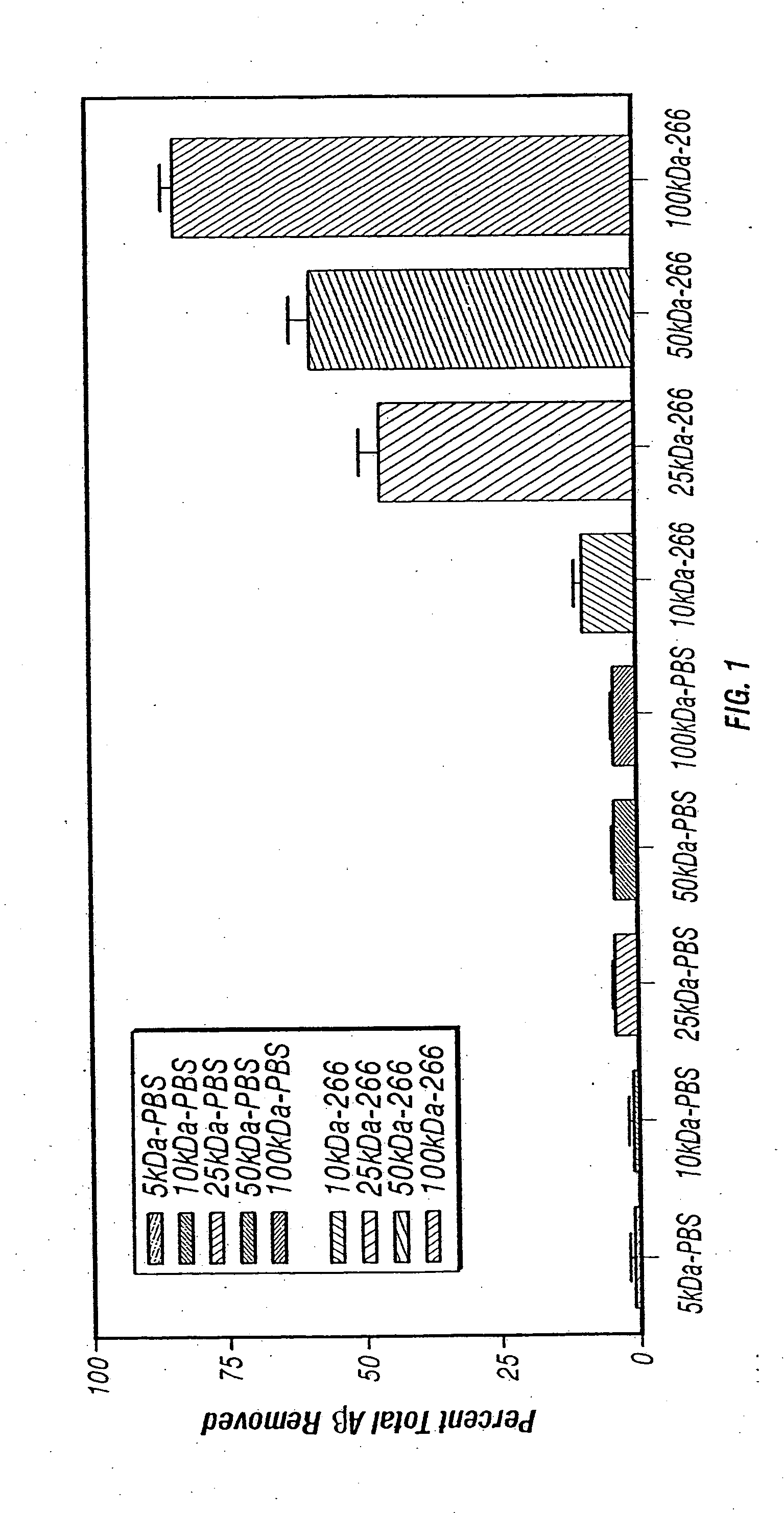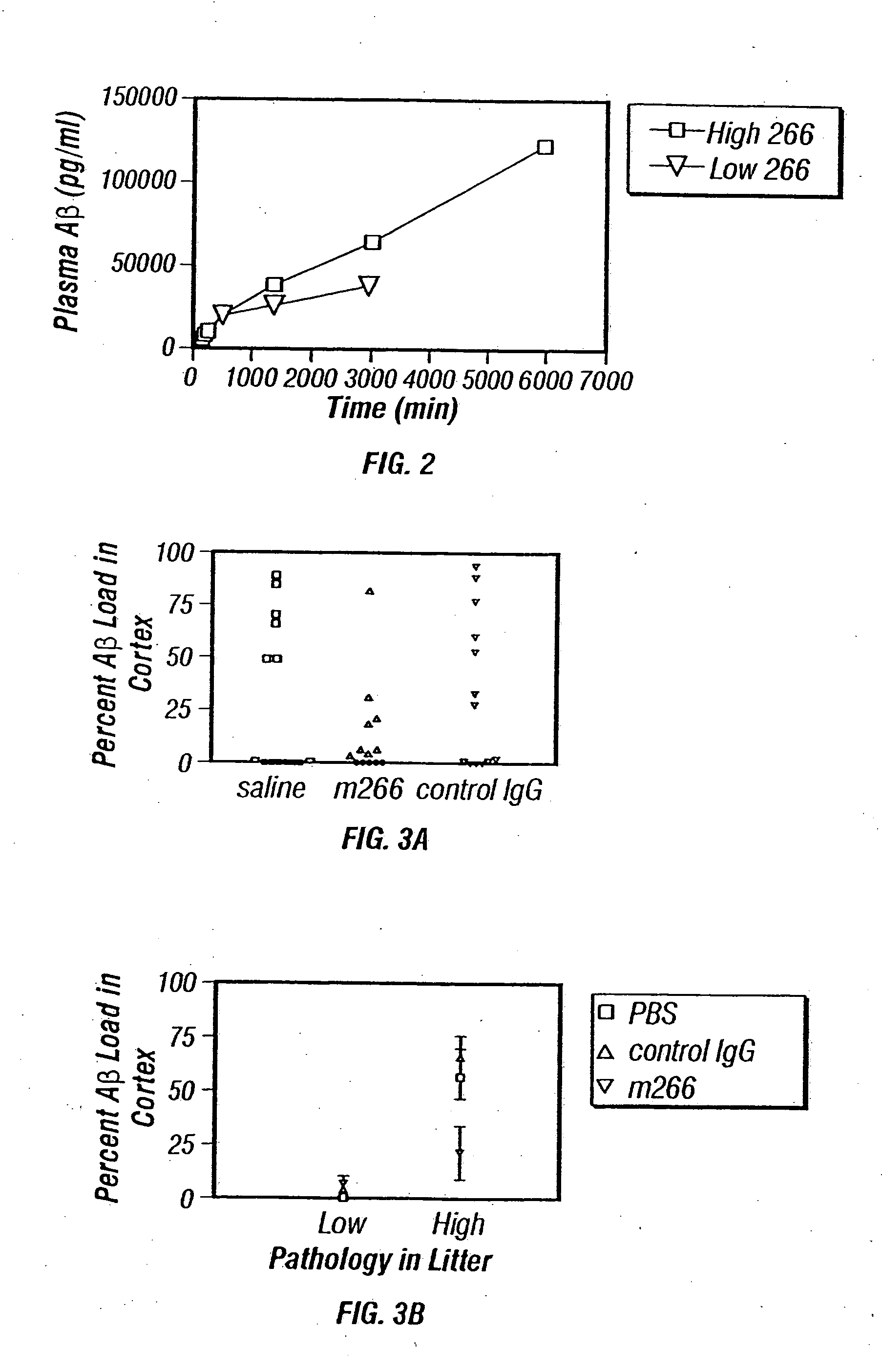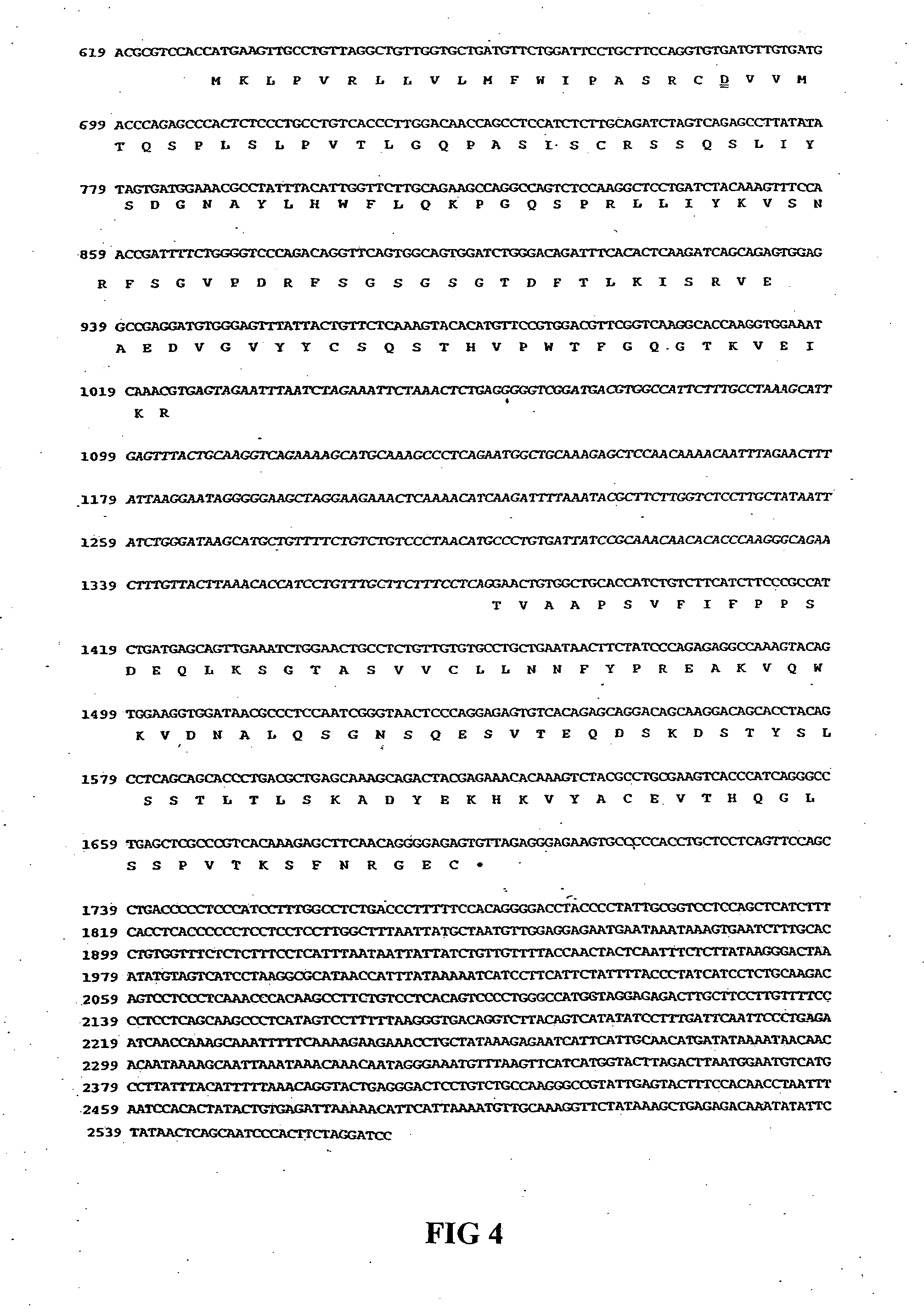Patents
Literature
521 results about "Amyloid beta" patented technology
Efficacy Topic
Property
Owner
Technical Advancement
Application Domain
Technology Topic
Technology Field Word
Patent Country/Region
Patent Type
Patent Status
Application Year
Inventor
Amyloid beta (Aβ or Abeta) denotes peptides of 36–43 amino acids that are crucially involved in Alzheimer's disease as the main component of the amyloid plaques found in the brains of people with Alzheimer's disease. The peptides derive from the amyloid precursor protein (APP), which is cleaved by beta secretase and gamma secretase to yield Aβ. Aβ molecules can aggregate to form flexible soluble oligomers which may exist in several forms. It is now believed that certain misfolded oligomers (known as "seeds") can induce other Aβ molecules to also take the misfolded oligomeric form, leading to a chain reaction akin to a prion infection. The oligomers are toxic to nerve cells. The other protein implicated in Alzheimer's disease, tau protein, also forms such prion-like misfolded oligomers, and there is some evidence that misfolded Aβ can induce tau to misfold.
Humanized antibodies that sequester abeta peptide
A method to treat conditions characterized by formation of amyloid plaques both prophylactically and therapeutically is described. The method employs humanized antibodies which sequester soluble Aβ peptide from human biological fluids or which preferably specifically bind an epitope contained within position 13–28 of the amyloid beta peptide Aβ.
Owner:ELI LILLY & CO +1
Compounds and uses thereof in modulating amyloid beta
Novel compounds, compositions, and kits are provided. Methods of modulating Aβ levels, and methods of treating a disease associated with aberrant Aβ levels are also provided.
Owner:NEUROGENETIC PHARMA INC
Anti-ADDL antibodies and uses thereof
ActiveUS20060228349A1Prevent and treat diseaseInhibit phosphorylationNervous disorderMetabolism disorderOligomerAmyloid beta
The present invention relates to antibodies that differentially recognize multi-dimensional conformations of Aβ-derived diffusible ligands, also known as ADDLs. The antibodies of the invention can distinguish between Alzheimer's Disease and control human brain extracts and are useful in methods of detecting ADDLs and diagnosing Alzheimer's Disease. The present antibodies also block binding of ADDLs to neurons, assembly of ADDLS, and tau phosphorylation and are there useful in methods for the preventing and treating diseases associated with soluble oligomers of amyloid β1-42.
Owner:MERCK SHARP & DOHME LLC +1
Method for treating amyloid disease
InactiveUS20070010435A1Reduce the burden onEasy to transportBiocideOrganic active ingredientsAmyloid betaPlasma Exchanges
Disclosed herein are methods for treating amyloid disease in humans by clearing amyloid peptides from one or more bodily fluids such as, e.g., blood, of a patient. In particular, the methods are based on the administration capable of binding to amyloid-beta (Aβ) or on dialysis of blood or plasma exchange in order to remove Aβ peptides from the blood circulation, and / or brain or other affected organs.
Owner:NEW YORK UNIVERSITY
Amyloid beta-protein 3(pE)-42 antibodies and uses thereof
InactiveUS7122374B1Many symptomReduce riskAnimal cellsImmunoglobulins against animals/humansSide effectAmyloid beta
AβN3pE-42 is a β amyloid protein that accumulates specifically as a major constituent of senile plaque in the brains of both sporadic and familial Alzheimer's disease patients. The invention provides antibodies that specifically recognize AβN3pE-42 and can be expected to have a strong β amyloid-removing action. Particularly, humanized antibodies against AβN3pE-42 are useful to treat human neurodegenerative diseases. Further, since AβN3pE-42 is localized in the brain, the antibodies of the invention can avoid side effects such as kidney disorders caused by the formation of antigen-antibody complex in the blood. An agent for gene therapy using a vector in which a cDNA encoding a protein comprises the antigen-binding region of the antibody can be an efficient therapeutic drug for removing β amyloid from the brain.
Owner:SAIDO TAKAOMI +1
Beta sheet breaker peptide analogs that inhibit beta pleated sheet formation in amyloid beta-peptide
The present invention provides peptide analogs and peptide mimetics that inhibit pleated sheet formation in amyloid beta-peptide, pharmaceutical compositions thereof and their therapeutic use. The inhibitory peptides possess activity as inhibitors in the formation of amyloid-like deposits and are useful in the treatment of Alzheimer's Disease.
Owner:AXONYX INC
Antibody recognizing GM1 ganglioside-bound amyloid beta-protein and DNA encoding the antibody
InactiveUS7339035B2Effective diagnosisEffective treatmentImmunoglobulins against cell receptors/antigens/surface-determinantsAntibody ingredientsAmyloid betaGm1 ganglioside
It is intended to provide an antibody efficacious in diagnosing, preventing or treating Alzheimer's disease, DNA encoding the antibody, a method of screening a drug and drugs. The amino acid sequence and the gene sequence of the variable region of an antibody, which specifically recognizes a GM1 ganglioside-bound amyloid β-protein occurring in the early stage of β-amyloid fibril formation, are determined. Based on the data of the amino acid sequence and the gene sequence thus obtained, an antibody is designed.
Owner:MEDICAL & BIOLOGICAL LAB CO LTD +2
Amine compounds, their production and use as amyloid-beta production inhibitors
InactiveUS6310107B1Readily availableEnhanced inhibitory effectOrganic active ingredientsBiocideAmyloid betaAliphatic hydrocarbon
A compound of the formula:wherein Ar is an aromatic ring assembly group which may be substituted or a fused aromatic group which may be substituted; X is (i) a bond, (ii) -S-, -SO- or -SO2-, (iii) C1-6 alkylene, C2-6 alkenylene or C2-6 alkynylene, etc., (iv) -CO-O- or (v) -(CH2)p-X1-, -(CH2)p-X1- (CH2)q-, -(CH2)r-CO-X1-, -SO2-NR8- or -(CH2)r-SO2-NR8- wherein X1 is O or NR8, R8 is H, a hydrocarbon group which may be substituted or an acyl, p is 0 to 5, q is 1 to 5, p+q is 1 to 5, and r is 1 to 4; Y is a divalent C1-6 aliphatic hydrocarbon group optionally containing O or S, which may be substituted; R1 and R2 each is H or a lower alkyl which may be substituted, or R1 and R2 form a N-containing heterocyclic ring which may be substituted; Ring A is a benzene ring which may be further substituted; and Ring B is a 4- to 8-membered ring which may be further substituted, or a salt thereof has the effect of inhibiting amyloid-beta protein production and / or secretion and is useful as a pharmaceutical composition for preventing and / or treating the neurodegenerative disease, etc.
Owner:THE UNIV OF TOKYO
Antibodies directed against amyloid-beta peptide and methods using same
Monoclonal antibody 9TL and antibodies derived from 9TL directed against amyloid-beta peptide and methods of using same for diagnosing and treatment of Alzheimer's disease and Aβ peptide associated diseases are described. Methods of using antibodies directed against amyloid-beta peptide having impaired effector function for treatment of Alzheimer's disease and Aβ peptide associated diseases are also described.
Owner:RINAT NEUROSCI CORP
Anti-ADDL monoclonal antibody and use thereof
ActiveUS20070081998A1Avoid assemblyPrevent and treat diseaseNervous disorderImmunoglobulins against animals/humansOligomerAmyloid beta
The present invention relates to antibodies that differentially recognize multi-dimensional conformations of Aβ-derived diffusible ligands, also known as ADDLs. The antibodies of the invention can distinguish between Alzheimer's Disease and control human brain extracts and are useful in methods of detecting ADDLs and diagnosing Alzheimer's Disease. The present antibodies also block binding of ADDLs to neurons, assembly of ADDLS, and tau phosphorylation and are there useful in methods for the preventing and treating diseases associated with soluble oligomers of amyloid β 1-42.
Owner:MERCK SHARP & DOHME LLC
Humanized anti-amyloid antibody
Compositions for treating neurodegenerative or amyloidgenic disorders such as Alzheimer's disease (AD) are provided. More particularly, humanized anti-amyloid-beta antibodies, compositions containing such antibodies, corresponding nucleic acids, vectors and host cells, and methods of making such antibodies are provided.
Owner:AMGEN INC
Iminothiadiazine dioxide compounds as bace inhibitors, compositions and their use
In its many embodiments, the present invention provides certain iminothiadiazine dioxide compounds, including compounds Formula (I): (I) and include stereoisomers thereof, and pharmaceutically acceptable salts of said compounds stereoisomers, wherein each of R1, R2, R3, R4, R5, R9, ring A, ring B, m, n, p, -L1-,L2-, and L3- is selected independently and as defined herein. The novel iminothiadiazine dioxide compounds of the invention have surprisingly been found to exhibit properties which are expected to render them advantageous as BACE inhibitors and / or for the treatment and prevention of various pathologies related to β-amyloid (Aβ) production. Pharmaceutical compositions comprising one or more such compounds (alone and in combination with one or more other active agents), and methods for their preparation and use in treating pathologies associated with amyloid beta (Aβ) protein, including Alzheimers disease, are also disclosed.
Owner:MERCK SHARP & DOHME LLC
Antibodies Specific For Soluble Amyloid Beta Peptide Protofibrils and Uses Thereof
ActiveUS20090155246A1Avoid side effectsModulating levelNervous disorderMicrobiological testing/measurementAntigenAmyloid beta
The invention pertains to the development of antibodies that specifically bind amyloid beta protein (Abeta) in its protofibril conformation. The invention also comprises methods of using anti-Abeta protofibril antibodies to diagnose or treat Alzheimer's disease, Down's syndrome Lewybody dementia, vascular dementia, and other neurodegenerative disorders. Furthermore, the invention pertains to the use of anti-Abeta protofibril antibodies to screen and identify substances that will modulate protofibril activity or formation in vitro or in vivo. The invention also pertains to methods for synthesising pure Abeta protofibril antigens as well as to a method for stabilising Abeta protofibrils antigens as well as to a method for stabilising Abeta protofibrils.
Owner:BIOARCTIC NEUROSCI AB
Iminothiadiazine dioxide compounds as bace inhibitors, compositions, and their use
In its many embodiments, the present invention provides certain iminothiadiazine dioxide compounds, including compounds Formula (a) and include tautomers, solvates, prodrugs, esters, and deuterates thereof, and pharmaceutically acceptable salts of said compounds, tautomers, solvates, prodrugs, esters, and deuterates, wherein each of R1, R2, R3, R4, R5, R9, ring A, ring B, ring C, m, n, p, q, -L1-, -L2-, L3-, and L4- is selected independently and as defined herein. The compounds of the invention have, surprisingly and advantageously, improved solution stability. Pharmaceutical compositions comprising one or more such compounds (alone and in combination with one or more other active agents), and methods for their preparation and use in treating pathologies associated with amyloid beta (Aβ) protein, including Alzheimers Disease, are also disclosed.
Owner:MERCK SHARP & DOHME LLC
Aspartyl protease inhibitors
InactiveUS7115652B2Inhibit β-secretase activityBiocideNervous disorderProteinase activityAmyloid beta
The present invention provides compounds having the formula:wherein R1, R′, R2, R3, R3′, R4, X1, X2 and X3 are as defined herein, and pharmaceutical compositions thereof. The present invention also provides methods of inhibiting proteases, more specifically aspartyl proteases. In certain embodiments, compounds inhibit BACE (β-site APP-cleaving enzyme), and thus are useful in the treatment or prevention of a disease characterized by β-amyloid deposits in the brain (including, but not limited to, Alzheimer's Disease). The present invention also provides methods for preparing compounds of the invention.
Owner:SUNESIS PHARMA INC
Alzheimer's disease treatment with multiple therapeutic agents delivered to the olfactory region through a special delivery catheter and iontophoresis
InactiveUS20140012182A1Large deliveryAvoid destructionNervous disorderHead electrodesApoptosisExcitotoxicity
This invention describes the administration of multiple therapeutic agents with insulin in conjunction with bexarotene, ketamine, monoclonal antibodies Etanercept, IGF-1, and acetylcholine esterase inhibitors physostigmine, for treatment of Alzheimer's disease and other neurodegenerative diseases. Insulin, improves memory; also augments and amplifies the effects of the adjuvant therapeutic agents (paracrine and intracrine effects) and consequently reduces the β amyloid, its soluble precursors, prevents damage to the neuronal skeletal network (taupathy), and blocks glutamate excitotoxicity, reduces brain inflammation, prevents apoptosis, and increases the acetylcholine levels in the neurons and synapses; by using a combination of insulin, bexarotene, ketamine, Etanercept, IGF-1, and physostigmine therapeutic agents. The results are achieved by using the specially designed Iontophoresis incorporated olfactory mucosal delivery (ORE) catheter device located at the olfactory nerves, sphenoid sinus, and adjacent structures described here, to transport the large molecules of therapeutic agents to treat AD delivered to the CNS bypassing BBB from ORE.
Owner:WEDGE THERAPEUTICS
Antibodies specific for soluble amyloid beta peptide protofibrils and uses thereof
ActiveUS8106164B2Avoid side effectsModulating levelNervous disorderMicrobiological testing/measurementAntigenAmyloid beta
Owner:BIOARCTIC NEUROSCI AB
Methods for treating neurodegenerative diseases associated with aggregation of amyloid-beta
Disclosed herein is a method for prophylaxis or treatment of a neurodegenerative disease associated with aggregation of amyloid-beta (Aβ) in a subject. The method includes the step of, administering to the subject an effective amount of a compound having formula (I),wherein, R1 is selected from the group consisting of —SC3H6OH, —SC2H4COOH, —SCH2CHOHCH3, —SCH2CHOHCH2OH, —S(C6H4)OH, —SC2H4OH, —OH, and —NHC2H4(NC2H4OC2H4); and R2 is H or CH3.
Owner:MACKAY MEDICAL COLLEGE
Antibodies specific for N-terminal truncated and pyroglutamate modified amyloid-beta peptides
The present invention pertains to novel diagnostic assays for the diagnosis of amyloidosis, in particular Alzheimer's disease, and related aspects. In particular, monoclonal antibodies and an antibody assay are provided.
Owner:VIVORYON THERAPEUTICS NV
Compositions for treating neurological disorders
InactiveUS20140038927A1Significant comprehensive benefitsLow dosBiocideNervous disorderHuntingtons choreaAlcoholisms
The present invention relates to compositions and methods for the treatment of neurological disorders related to glutamate excitotoxicity and Amyloid β toxicity. More specifically, the present invention relates to novel combinatorial therapies of Multiple Sclerosis, Alzheimer's disease, Alzheimer's disease related disorders, Amyotrophic Lateral Sclerosis, Parkinson's disease, Huntington's disease, neuropathic pain, alcoholic neuropathy, alcoholism or alcohol withdrawal, or spinal cord injury.
Owner:PHARNEXT
Synthetic immunogenic but non-deposit-forming polypeptides and peptides homologous to amyloid beta, prion protein, amylin, alpha-synuclein, or polyglutamine repeats for induction of an immune response thereto
InactiveUS7479482B2Reduce formationAvoid formingHormone peptidesNervous disorderPassive ImmunizationsAmyloid beta
The present invention relates to immunogenic but non-depositing-forming polypeptides or peptides homologous to amyloid β, prion, amylin or α-synuclein which can be used alone or conjugated to an immunostimulatory molecule in an immunizing composition for inducing an immune response to amyloid β peptides and amyloid deposits, to prion protein and prion deposits, to amylin and amylin deposits, to α-synuclein and deposits containing α-synuclein, or to polyglutamine repeats and deposits of proteins containing polyglutamine repeats. Described are also antibodies directed against such peptides, their generation, and their use in methods of passive immunization to such peptides and deposits.
Owner:NEW YORK UNIV
Receptor for amyloid beta and uses thereof
Compositions and methods for identifying modulators of sortilin are described. The methods are particularly useful for identifying analytes that antagonize sortilin s effect on processing of amyloid precursor protein to Aβ peptide and thus useful for identifying analytes that can be used for treating Alzheimer disease.
Owner:MERCK SHARP & DOHME CORP
Amyloid beta protein (globular assembly and uses thereof)
The invention described in this disclosure involves a new composition of matter, amyloid beta-derived dementing ligands (ADDL's). ADDLs consist of amyloid β peptide assembled into soluble globular non-fibrillar oligomeric structures that are capable of activating specific cellular processes. The invention further encompasses methods for assaying the formation, presence, receptor protein binding and cellular activities of ADDLs. The invention further encompasses assay methods and inhibitor molecules for cellular signaling molecules activated by ADDLs. Also described are molecules that block proteins that promote the formation of ADDLs.
Owner:NORTHWESTERN UNIV +1
Method of Assaying Alzheimer's Disease and Diagnostic Reagent
InactiveUS20080199879A1Efficient and accurate detectionImmunoglobulins against animals/humansDisease diagnosisAmyloid betaΒ amyloid
The present invention is intended to devise a process of measuring β-amyloid in a biological sample such as blood and to apply the process to diagnosis of Alzheimer's disease.It is possible to assay Alzheimer's disease by measuring a total amount of β-amyloid 1-42 and β-amyloid 1-42 fragments each of which retains a C-terminal site of the β-amyloid 1-42 in the biological sample by an immunological assay in which an antibody which recognizes the C-terminal site of β-amyloid 1-42 is used. It is preferable that the immunological assay be a competitive immunological assay.
Owner:SANKO JUNYAKU CO LTD
Compounds and uses thereof in modulating amyloid beta
Novel compounds, compositions, and kits are provided. Methods of modulating Aβ levels, and methods of treating a disease associated with aberrant Aβ levels are also provided.
Owner:NEUROGENETIC PHARMA INC
N-11 truncated amyloid-beta monoclonal antibodies, compositions, methods and uses
ActiveUS20060127954A1Inhibit the formation of amyloid plaquesAnimal cellsNervous disorderProtein.monoclonalAmyloid beta
This invention relates to antibodies, including specified portions or variants, specific for at least the human Amyloid-beta 11 N-terminal site, i.e. Aβ11-x peptides. It further provides methods of making and using said antibodies, including therapeutic formulations, administration and devices.
Owner:JANSSEN PHARMA NV
Compounds for the treatment of CNS and amyloid associated diseases
InactiveUS20060167057A1Increase the gapInhibition of activationBiocideNervous disorderAmyloid betaDisease cause
Methods, compounds, pharmaceutical compositions and kits are described for treating or preventing CNS and amyloid associated disease. Also described are methods, compounds, pharmaceutical compositions and kits for detecting, diagnosing, monitoring and treating or preventing CNS and amyloid associated disease.
Owner:BELLUS HEALTH (INT) LTD (CH)
Humanized antibodies that sequester abeta peptide
InactiveUS20060039906A1Good removal effectAvoid toxicityNervous disorderImmunoglobulins against animals/humansEpitopeAmyloid beta
A method to treat conditions characterized by formation of amyloid plaques both prophylactically and therapeutically is described. The method employs humanized antibodies which sequester soluble Aβ peptide from human biological fluids or which preferably specifically bind an epitope contained within position 13-28 of the amyloid beta peptide Aβ.
Owner:HOLTZMAN DAVID +5
Features
- R&D
- Intellectual Property
- Life Sciences
- Materials
- Tech Scout
Why Patsnap Eureka
- Unparalleled Data Quality
- Higher Quality Content
- 60% Fewer Hallucinations
Social media
Patsnap Eureka Blog
Learn More Browse by: Latest US Patents, China's latest patents, Technical Efficacy Thesaurus, Application Domain, Technology Topic, Popular Technical Reports.
© 2025 PatSnap. All rights reserved.Legal|Privacy policy|Modern Slavery Act Transparency Statement|Sitemap|About US| Contact US: help@patsnap.com
